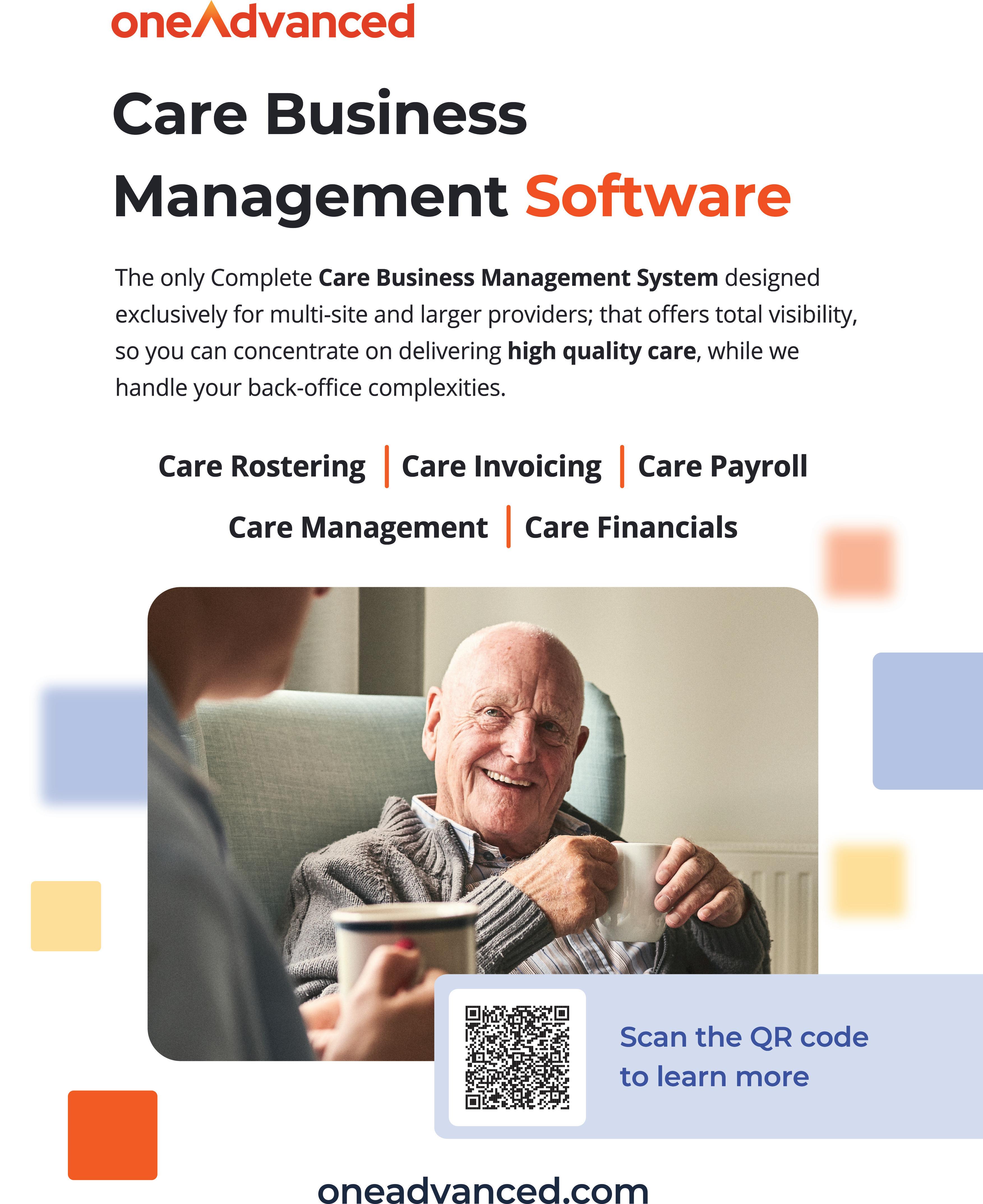

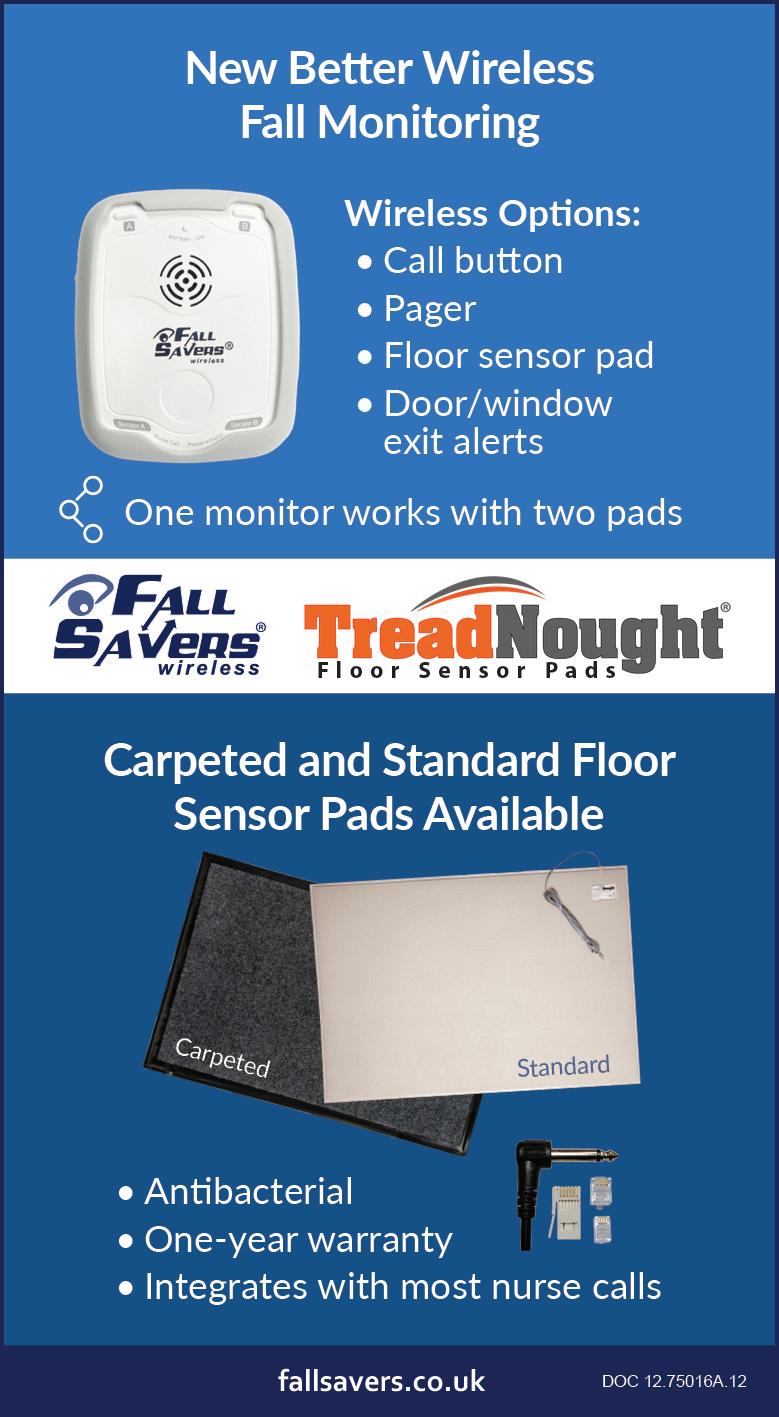













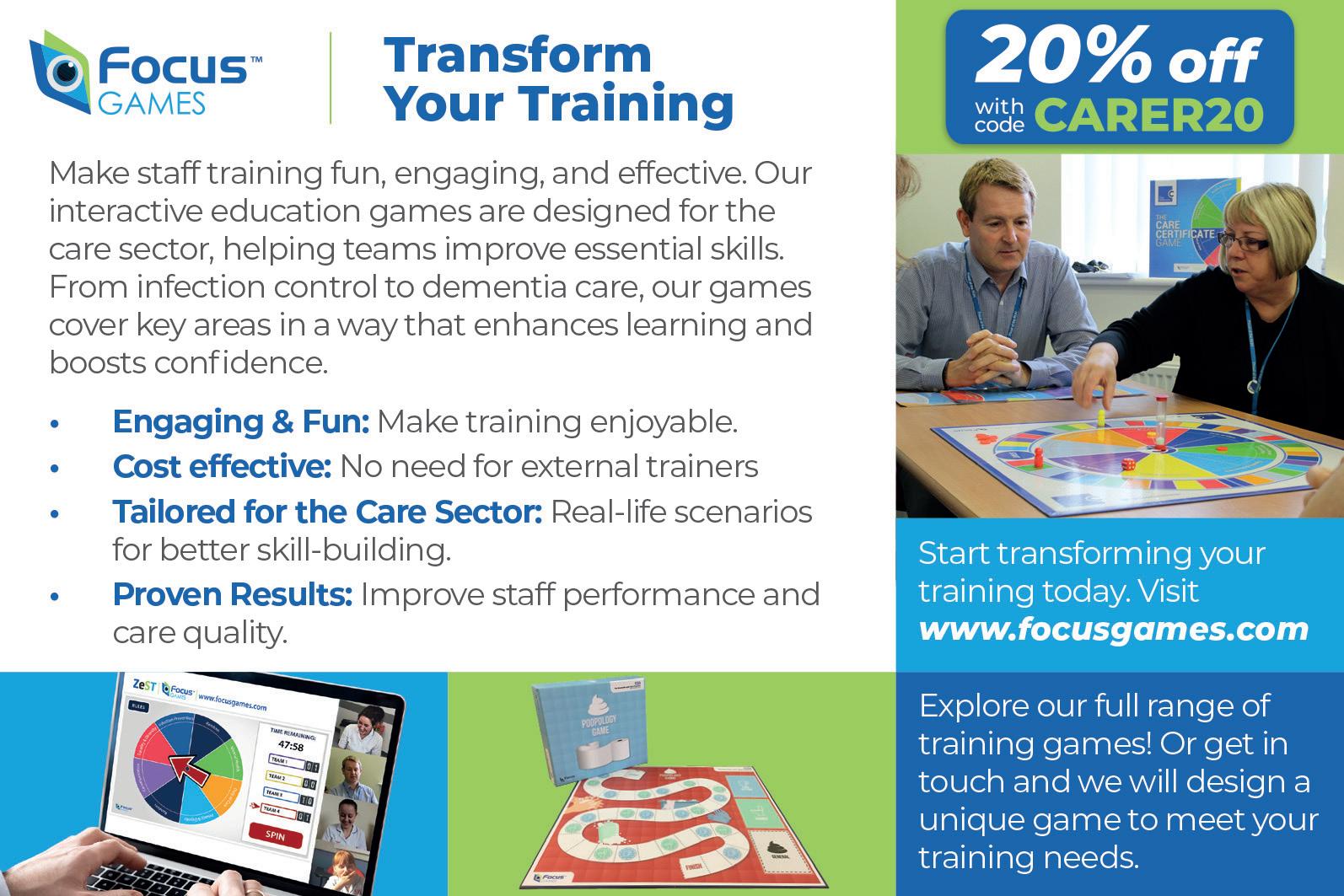
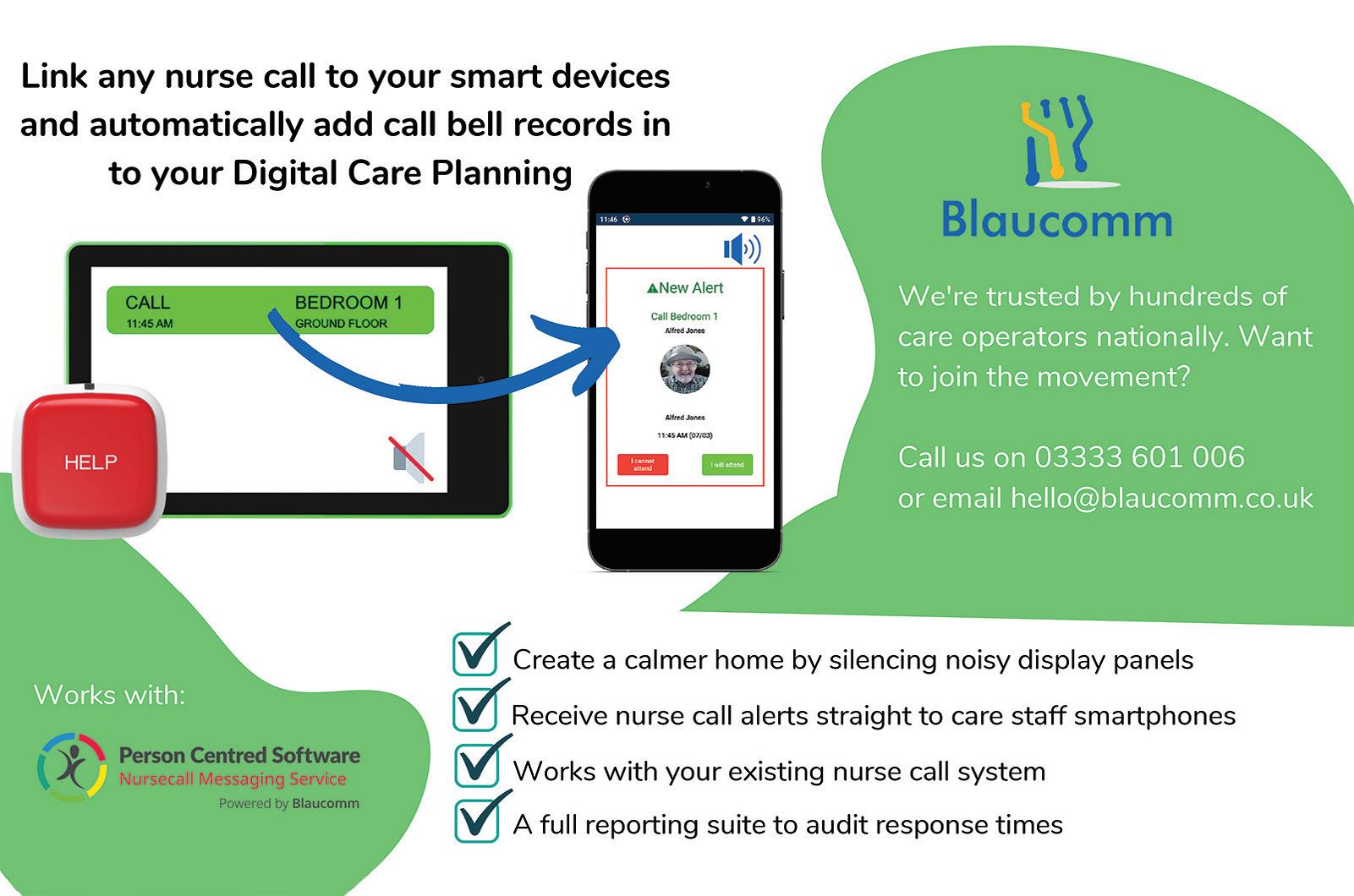
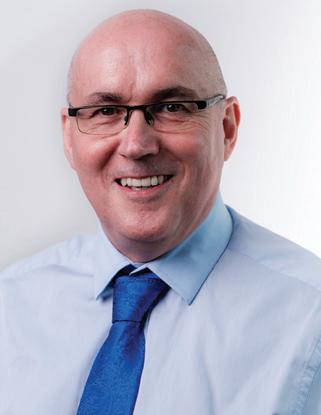
seas recruitment, a comprehensive strategy should have included substantial investment in training programmes, apprenticeships, and career progression pathways to make care work more attractive to domestic workers.

Yesterday marked a watershed moment for the UK care sector, and not in a positive way.
The government's ban on overseas recruitment of care workers came into force on July 22, effectively ending the ability of adult social care providers to sponsor new staff from abroad on the health and care worker visa.
While I do understand the government drive to train and utilize our domestic workforce and also understand they are in “the court of public opinion” regarding immigration and social cohesion, this decision represents, at least to me, a fundamental misunderstanding of the realities facing our sector and threatens to push an already fragile care system over the edge.
The stark reality is that this policy change arrives at a time when the care sector is already battling a recruitment and retention crisis of unprecedented proportions. As one care provider poignantly expressed: "The Health and Care Worker visa has been a critical lifeline, enabling care providers to recruit international workers to fill staffing gaps. The withdrawal of this visa will exacerbate existing challenges in rural North Wales, where geographic isolation and a smaller pool of domestic workers make recruitment particularly difficult." (See full comment on page 9.)
This sentiment echoes across the entire sector. The geographical challenges highlighted in rural Wales are replicated in countless communities across the UK, where local labour markets simply cannot supply the volume of workers needed to meet growing demand for care services.
The government's rationale centres on prioritising domestic recruitment, but the harsh mathematics of care staffing tell a different story. The Nuffield Trust estimates that financial pressure for providers of social care in England caused by the employer national Insurance changes announced in the budget.
Taken together with the planned increases to National Minimum Wage rates, the Nuffield Trust says that the 18,000 independent organisations providing adult social care in England will be faced with increased costs of an estimated £2.8bn in the next financial year. This will mean that many businesses – especially smaller ones – are at risk of going bust, disrupting or ending vital care for thousands of older and disabled people. This financial burden will inevitably impact service quality and availability at a time when demand continues to rise.
Before implementing this ban, the government should have addressed several critical factors that sector leaders have repeatedly highlighted: Investment in Domestic Workforce Development: Rather than simply cutting off over-
Pay and Conditions Reform: The persistent issue of low pay and challenging working conditions in care remains unaddressed. Without meaningful improvements to remuneration and professional recognition, domestic recruitment will continue to fall short of sector needs.
Regional Variations: The one-size-fits-all approach ignores the stark differences between urban and rural labour markets. Areas like rural North Wales, Cornwall, and the Scottish Highlands face unique challenges that require tailored solutions.
Transition Period Adequacy: While existing care workers on visas can continue working until July 2028, this transition period may prove insufficient to build the domestic workforce capacity needed to replace overseas recruitment entirely.
Alternative Visa Routes: The government should have explored modified visa arrangements that maintained access to international talent while addressing concerns about exploitation and skills development.
On a more positive note, it was encouraging to see Providers Unite continuing to step up their advocacy efforts. Their campaign documentary launched ahead of recent political conferences, alongside their powerful "Backbone of Care" film released on YouTube, demonstrates the growing sophistication of sector advocacy.
Having attended their Westminster protest in February, I witnessed firsthand the passion and determination of providers and workers who painted a stark picture of the challenges facing care. The rise of Providers Unite has been remarkable, giving voice to those delivering care on the front lines. Their documentary work captures truths that policy makers desperately need to hear.
For those who haven't yet watched the "Backbone of Care" video, I strongly urge you to do so at www.youtube.com/watch?v=uR5ni84--ps It provides an unvarnished look at the realities facing our sector and the people who dedicate their lives to caring for others.
The visa ban is now reality, but the fight for sustainable care workforce solutions must continue. The sector must unite in demonstrating to government that effective care provision requires both strong domestic workforce development AND continued access to international talent.
We need evidence-based policy making, not reactions to immigration statistics. The care sector serves some of our most vulnerable citizens, and they deserve better than to become collateral damage in broader political battles over migration numbers.
The government's promise to "prioritise recruiting international care workers already in England before recruiting from overseas" is a start, but it's insufficient to address the scale of workforce challenges we face!
I would encourage our readers to sign up for our bi-weekly digital newsletter at www.thecareruk.com and follow us on social media for all the latest news.
Carer is published by RBC Publishing Ltd, 3 Carlton Mount, 2 Cranborne Road, Bournemouth, Dorset BH2 5BR.
damage. Views expressed within this publication are not necessarily those of the publisher or the editorial team.
responsibility for any effects, errors or omissions therefrom. All rights reserved, reproduction is forbidden unless

(CONTINUED FROM FRONT COVER)
A summary of the rule changes include:
Increasing the skills threshold for Skilled Worker Visas to RQF 6 (graduate level), removing 112 previously eligible RQF 3-5 occupations (across all sectors).
Increasing the salary threshold for general skilled workers from £38,700 to £41,700.
• The salary threshold for most Health and Care Visa holders, who are paid according to national pay scales, remains unchanged at £25,000.
Skilled Worker Visa holders who currently work in below degree level occupations can continue to work, extend their visas, bring dependants, change employment and take supplementary employment in occupations below RQF 6, as long as they meet occupation salary thresholds.
Only allowing time-limited access to below degree level occupations through an expanded Immigration Salary List and interim Temporary Shortage List (TSL), with restrictions on bringing dependants.
• Closing the Social Care Worker Visa route to overseas recruitment for new applicants and removing the requirement to work with regional partnerships to employ displaced workers.
PIVOTAL MOMENT
The care sector now faces a pivotal moment as sweeping changes to international recruitment policies now reshape how providers secure essential staff.
Recent government measures have fundamentally altered the landscape for overseas worker sponsorship, marking what many consider the most significant workforce policy shift in years.
A limited pathway remains available for providers seeking to sponsor overseas workers already present in the UK under alternative immigration routes, such as graduate visas, however, this option requires a minimum three-month employment history with the sponsoring organisation and will also conclude in July 2028.
DRAMATIC INCREASE
In recent years independent sector providers in England recruited approximately 105,000 international staff into direct care roles during 2023-24, representing a dramatic increase from just 20,000 in 2021-22. This surge reflected the sector's response to unprecedented vacancy levels and recruitment challenges.
However, subsequent policy adjustments, particularly restrictions on dependent family members, contributed to a significant decline in international applications.
Government analysis suggests the current restrictions will reduce immigration by approximately 7,000 positions annually, indicating the market had already begun adjusting to earlier policy changes.
Despite these developments, fundamental recruitment difficulties persist across the sector. Current vacancy rates stand at 8.2% for care worker positions and 4.8% for senior care worker roles within England's independent sector, according to workforce analysis data by Skills for Care, underscoring the ongoing challenges providers face in maintain-
ing adequate staffing levels.
Care providers and sector representatives have expressed significant reservations about the policy direction.
Kevin Edwards, a director of Gwynedd-based Meddyg Care, wrote to Welsh First Minister Eluned Morgan to warn of the “potentially devastating impact” of the UK Government’s decision to end the Health and Care Worker visa.
According to Mr Edwards, whose company operates two care homes in Porthmadog and Cricieth and specialises in dementia care, there was a real risk of care homes and domiciliary care companies being forced to close.
The crisis, he said, was particularly acute in rural areas where it was increasingly difficult to recruit local workers.
The scale of the problem was underscored by official statistics which showed that 15 per cent of registered care workers in Wales were born outside the UK.
In his letter Mr Edwards urged the First Minister to put pressure on the Westminster Government to either reverse the policy or introduce a transitional scheme for critical workers in social care.
At the same time, he wants to see more investment in training and pay levels to attract and retain local workers.
He’s also calling for stronger measures to safeguard international workers from exploitation. (See full article page 9.)
Particular concerns centre on the timing of these restrictions relative to other workforce development initiatives. Without concurrent improvements in pay, conditions, and career pathways, many providers question whether domestic recruitment can adequately compensate for reduced international staffing options.
Regional variations in workforce challenges add another layer of complexity. Scotland's government has voiced strong opposition to the policy, with officials arguing it will prove "devastating" for care provision across the nation. These concerns reflect the varying demographic and economic conditions that influence local labour markets.
Central to the government's strategy is the proposed fair pay agreement framework for adult social care. This initiative, incorporated within current employment legislation, aims to create standardised pay and conditions across the sector through collaborative negotiation.
The planned Adult Social Care Negotiating Body would bring together employer representatives and trade unions to establish sector-wide standards. This approach mirrors successful models in other industries where collective bargaining has improved working conditions and career attractiveness.
However, significant implementation challenges remain. No specific timeline exists for establishing the negotiating body, and crucially, no additional funding has been allocated to support councils in their commissioning role. Without adequate financial backing, providers may struggle to implement improved pay and conditions even if agreements are reached.
As the new rules take effect businesses, including the care sector, heavily reliant on overseas workers are being warned that the HMRC will “crackdown” on those companies employing illegal migrant workers and will face fines of up to £60,000 per illegal worker.
Under HMRC’s intensified clampdown there are reports of increased numbers of unannounced compliance visits by UK Visas and Immigration (UKVI) investigators.
UKVI is growing increasingly tough on illegal working and clamping down on “rogue” employers, whilst seemingly caving in to mounting pressure to reduce legal migration, which, according to reports, is behind the dramatic increase in the number of sponsor license suspensions and revocations.
“In recent weeks, there have been multiple reports that confirm that UKVI has increased compliance visits of sponsorship licence holders as part of a broader government effort to intensify a crackdown on businesses holding sponsor licenses and those employing migrant workers, to monitor whether the licence holders are genuine and complying with their duties,” André Minnaar, Partner and Head of the Immigration Team at Midlands law firm Sydney Mitchell, says.
“This has led to a dramatic increase in the number of sponsor license suspensions and revocations, coinciding with a noticeable increase in enforcement visits targeting illegal working.”
“If found to be employing any illegal workers, businesses face huge fines of £45,000 per illegal worker for a first offence and £60,000 per illegal worker for a repeat offence in a three year period.”
André explains that any compliance visit by UKVI , whether unannounced or pre-arranged, will involve UKVI officials carrying out checks with the main aim of establishing whether the licence holder is complying with their duties. After a visit, UKVI can continue to monitor compliance.
“It is vital to ensure that you as a licence holder are ready at all times for such a visit, to demonstrate that the business can or continue to be able to meet your sponsor duties,” André says. “The consequences of failing a Home Office inspection can be severe. The business may be downgraded from an A rated licence to a B rating, and the licence holder will be given an action plan to comply with within a fixed time frame. The licence holder will have to pay a fee and will not be allowed to sponsor any new workers until complaint with the action plan and the A-rating is restored
“Other measures available to UKVI inspectors are suspending the licence altogether, meaning that the business is unable to have a Certificate of Sponsorship assigned during the suspension period, although current sponsored workers will not normally be affected. UKVI can also choose to revoke a sponsor licence, which for the licence-holding business means it will be unable to sponsor any more workers and any existing sponsored workers’ permission will normally be curtailed.”
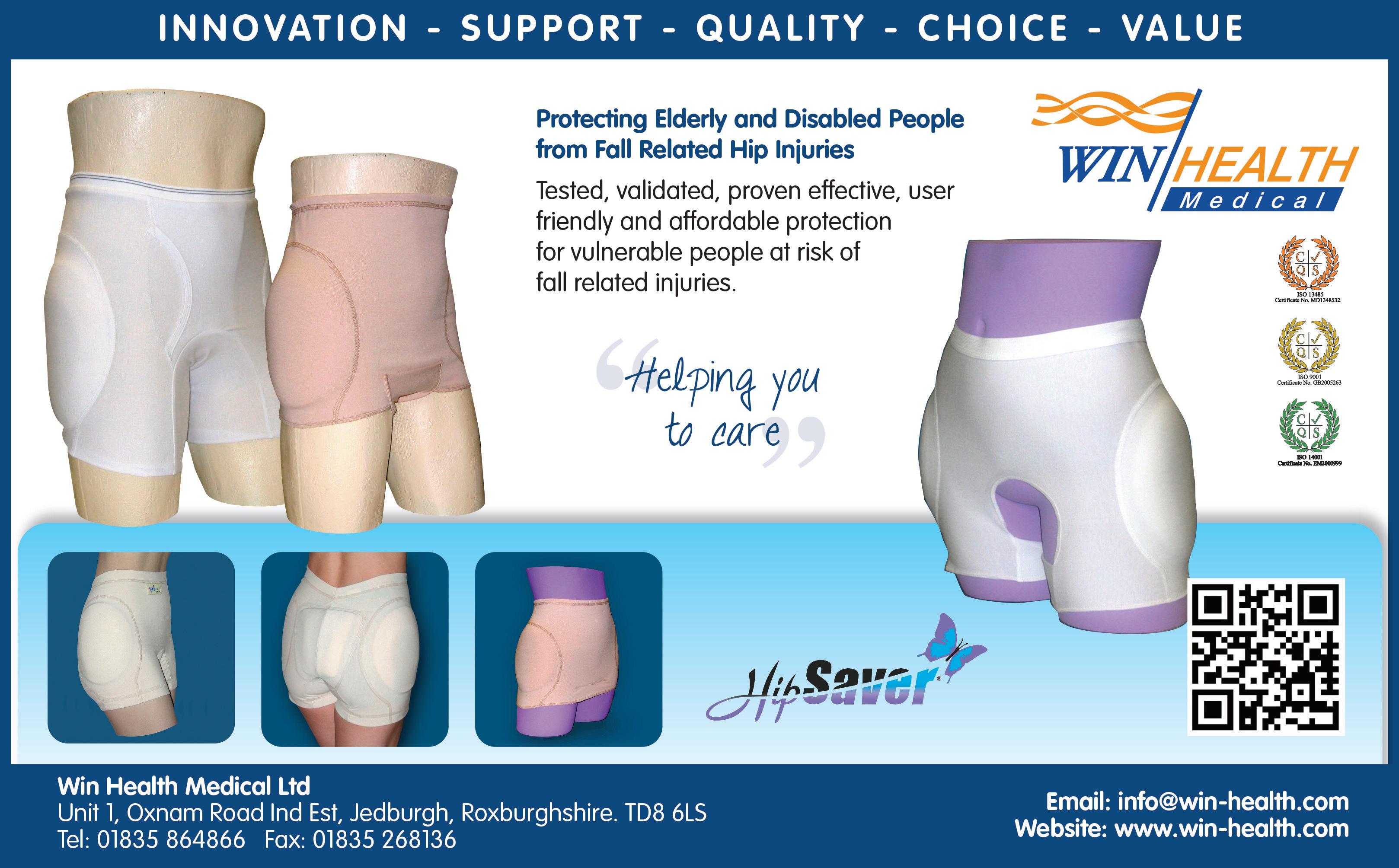
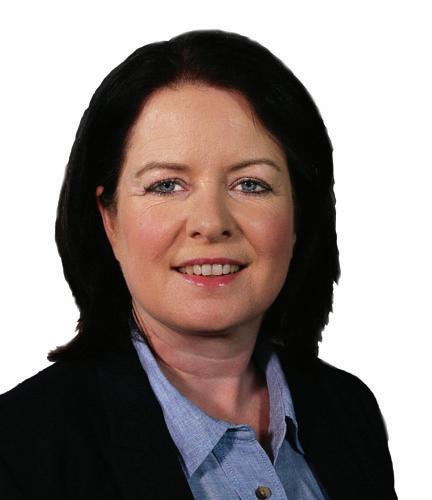
The UK care sector is under significant financial pressure with rising costs, workforce shortages, and long-term underfunding pushing many care providers towards breaking point. These challenges have only intensified following recent Budget announcements, with increases in the National Living Wage and National Insurance placing further pressure on already resource-stretched organisations.
Recent findings from the Care Provider Alliance paint a stark picture. A survey of over 1,100 care providers revealed that 73% expect to refuse new care packages, 77% are drawing on reserves, 64% anticipate redundancies, and 22% are considering closing altogether. These figures represent more than just operational strain; they signal a threat to vulnerable adults who rely on essential care, families who depend on support, and dedicated staff who risk losing their livelihoods.
Despite the severity of these challenges, care providers are not powerless. There are practical steps and strategies that can help navigate financial distress and build resilience for the future. In this article, Insolvency Solicitor Eleanor Stephens discusses how you can identify if there are cash flow issues in your business and the steps you can take as a care home provider.
HOW CAN CARE HOME OPERATORS RECOGNISE THE EARLY WARNING SIGNS OF FINANCIAL DISTRESS?
Financial distress rarely arrives without warning, recognising the signs early allows care providers to take action before problems escalate. Common warning signs include difficulties managing cashflow, increasing reliance on short-term borrowing or reserves, and delays in paying suppliers, landlords or HMRC. Indirect indicators, such as rising staff turnover, difficulties recruiting, or pressures around meeting regulatory standards, can also point to underlying financial stress.
Directors, no matter the sector, have a legal duty to act in the best interests of creditors once a business faces potential insolvency. Ignoring warning signs not only reduces the chance of recovery but also increases the risk of wrongful trading, which can lead to personal liability.
What steps can care home providers take?
Start with a detailed financial health check, this includes reviewing cashflow forecasts, profit margins, and liabilities. Identify immediate pressures and longer-term risks. This step is not just for the finance team, senior leadership, including operations and HR, should understand the business’s financial position to work together on solutions. Its imperative to ensure you maintain an accurate and up to date financial picture so all directors are aware of the realistic financial situation and can make decisions based on up to date information.
Engaging with key stakeholders early is an important step. Open conversations with lenders, landlords, suppliers, and local authority commissioners can create opportunities to renegotiate terms, extend payment deadlines, or secure additional support. Many stakeholders would rather help a business recover than see it fail.
Cost structures should be reviewed carefully. Are there areas of spend that can be reduced without affecting care quality? Are contracts still fit for purpose, or could they be renegotiated? Are there opportunities to refinance or access new funding?
UNDERSTANDING YOUR BUSINESS’ RESTRUCTURING AND INSOLVENCY OPTIONS
In the care sector, financial pressure can build gradually, rising operating costs, staffing shortages, and delayed local authority payments can impact cash flow. For many business owners, the word ‘insolvency’ can feel like a last resort, or something to be avoided at all costs. But in reality, insolvency and restructuring processes are there to help businesses, not punish them.
If your care home is facing financial difficulties, understanding your options early can make all the difference. A legal process such as administration is designed to give viable businesses the breathing space they need to stabilise, restructure, and recover.
Here are the most common routes and options: COMPANY VOLUNTARY ARRANGEMENT (CVA)
By Eleanor Stephens, Senior Solicitor – Insolvency at law firm Harper James (www.harperjames.co.uk)
A CVA is a legally binding agreement between a company and its unsecured creditors, typically to repay debts over a fixed period, often at reduced amounts.
The key advantage is that the business can continue trading while the CVA is in place. Directors stay in control, and staff, residents, and suppliers can experience minimal disruption.
How it works:
• The company proposes a repayment plan, usually spread over 3–5 years
• Creditors vote on the proposal at least 75% (by value) must agree for it to proceed
• Once approved, all unsecured creditors are bound by the terms
• The business continues to operate under the supervision of an insolvency practitioner
Why it works well in the care sector:
• Preserves continuity of care and minimises disruption for residents
• Retains jobs and protects staff morale
• Can prevent reputational damage by avoiding formal insolvency proceedings like liquidation
• Shows creditors that you’re taking proactive steps to meet obligations
Administration is a formal insolvency process where control of the business passes to a licensed insolvency practitioner (the administrator). Their role is to act in the best interest of creditors and try to rescue the business where possible.
During administration, the company is protected by a legal “moratorium”, meaning creditors can’t take enforcement action without the administrator’s consent or court approval.
What administration can achieve:
• Restructure the business to cut costs or exit loss-making contracts
• Sell the business as a going concern, preserving value and jobs
• Deliver a better return to creditors than an immediate liquidation
Why this matters for care homes:
• Resident care can continue while the administrator explores rescue or sale
• It creates space to secure investment, agree a pre-pack sale, or restructure leases and liabilities
• Essential suppliers (e.g. food, utilities, medical services) are more likely to continue supply during a managed process
Liquidation is the process of closing down a company in a structured and lawful way. Assets are sold, creditors are repaid in order of priority, and the business is removed from the Companies House register.
There are two main types:
• Creditors’ Voluntary Liquidation (CVL): initiated by directors when the business is insolvent and can’t continue trading
• Compulsory Liquidation: initiated by a creditor via court proceedings
What happens in liquidation:
• All trading ceases
• A liquidator is appointed to sell assets, settle debts, and distribute any remaining funds
• Employees are made redundant (with access to redundancy pay and other statutory entitlements)
• Directors’ duties continue during the process and are reviewed by the liquidator
When liquidation is appropriate:
• The business has no realistic prospect of recovery
• There are more liabilities than assets
• Continuing to trade would risk further losses or wrongful trading by directors
For care businesses, liquidation should be a last resort, but if recovery isn’t possible, it can allow directors to close the company in a way that meets legal obligations and limits personal risk.
SUMMARY
Many care homes in the UK are under real financial pressure. Rising costs and cash flow issues are making it harder to keep things running smoothly. Acting early is key: review your finances, talk to lenders and suppliers, and seek professional advice. Options like CVAs and administration can help restructure and protect your business, while liquidation should only be a last resort. Throughout the process, maintain clear communication with residents, families, and staff prioritising their wellbeing.
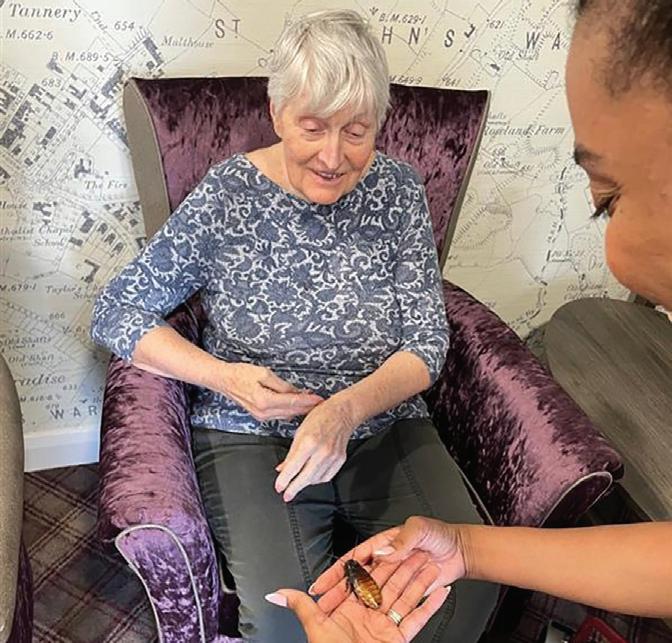
HC-One’s Sedgley Court Care Home in Dudley, West Midlands, was abuzz with excitement after welcoming ZooLab, provider of ethical animal encounters, who brought a menagerie of exotic creatures to delight and educate residents.
Domanique Lake, ZooLab Senior Educational Trainer and Ranger, captivated the audience with her knowledge, introducing a fascinating array of animals, including a corn snake, giant African land snail, bearded dragon, Madagascan hissing cockroach, stick insect, and a Chilean rose tarantula.
Hosted in the home’s library, the event drew a large group of residents who were initially nervous but soon warmed to the unique sensory experience.
Domanique’s engaging presentation highlighted the animals’ origins, from the arid deserts of Madagascar to the lush landscapes of South America, sparking curiosity and conversation.
Residents had the chance to stroke, hold, and observe these creatures up close, creating unforgettable moments of connection and discovery.
Brenda Whitehouse, a resident, shared her delight after holding a 15-inch Madagascan hissing cock-
roach: “She’s quite a lovely insect, and you feel every step she takes, but I wouldn’t want her in my bed!”
Joan Marr, another resident, beamed: “I’m really glad I went. She had a snail – you should have seen it with his big eyes!”
Emma Chaffe, HC-One’s Sedgley Court Care Home Manager, said: “It was a great experience for the residents. Domanique was very informative and knowledgeable, tailoring the session to everyone’s individual needs.£”
“It was such a different experience for all of us, including holding a snake myself! Overall, it was a really lovely afternoon, and the residents were very brave, thanks to Domanique’s encouragement.”
Domanique Lake, ZooLab Ranger, added: “It was a real pleasure visiting Sedgley Court with our animals and seeing the joy they brought to residents.
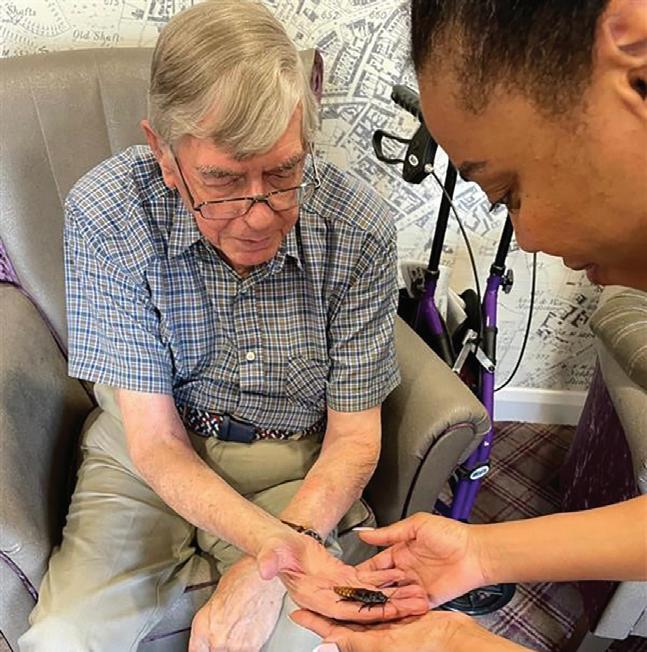
We believe animal encounters can be powerful in sparking memories, encouraging conversation, and offering comfort – especially in care home settings.”
“Experiences like these are at the heart of what we do, and we’re passionate about creating moments of connection between people and animals across all ages and abilities.”
Hospices across the England are set to receive a 375 million boost to modernise facilities and deliver major upgrades.
The government has announced an increase in funding to support improvements in end-of-life care to deliver major upgrades and enhancements to facilities including separate family rooms, solar panels to reduce energy costs and communal lounges.
More than 170 hospices across England will receive a share of the funding – the largest cash injection ever – to ensure patients receive the highest quality end-of-life care in comfortable, dignified surroundings.
It follows a £25 million boost in February, delivering the government’s £100 million investment confirmed in December. This is already supporting urgent building repairs and creating warmer, homely spaces.
This cash marks a further step in the delivery of the government’s Plan for Change, improving care in the community where people need it most.
Hospices include Wigan and Leigh – visited by Health Minister Stephen Kinnock last week – which used its funding to replace a flat roof which was leaking. It will use the additional funding to replace its heating system – helping create a better, more comfortable environment for patients and enabling staff to deliver higher quality care.
Minister for Care Stephen Kinnock said: “Hospices play a vital role in our society by providing invaluable care and support when people need it most.”
“At this most difficult time, people deserve to receive the best care in the best possible environment with dignity”
“I have seen first-hand how our funding is already making a real difference to improving facilities for patients and families. This additional funding will deliver further upgrades, relieving pressure on day-to-day spending.”
“End-of-life care is crucial to our 10 Year Health Plan and our fundamental shift of moving more care out of hospital and into the community. We will continue to support hospices so they can deliver their vital work”
OTHER IMPROVEMENTS ALREADY MADE AT HOSPICES ACROSS THE COUNTRY INCLUDE:
• Major building works and modernised facilities
• Digital transformation to improve data sharing between healthcare providers
• Development of outreach services to extend care beyond physical buildings
• Creation of more welcoming spaces for families, including outdoor areas
• Energy efficiency measures to improve sustainability
The new cash injection is for the financial year 2025/26 and will be distributed by Hospice UK to hospices. Hospices have been allocated a pot of funding and will be able to proceed with upgrades, invoicing Hospice UK once work has been completed.
Toby Porter, CEO of Hospice UK, said: “The announcement in late 2024 of £100 million in capital funding for hospices was welcome recognition from the government of the immense pressure facing hospices, and their urgent need for more financial support.”
“We were pleased to distribute the first £25 million of this funding early in March. We know this money has made a huge difference to hospices and the next £75 million will continue to help them invest in their buildings, facilities, and digital infrastructure.”
“While this one-off investment has been very welcome, it’s critical that we continue to work with government to secure long-term reform to ensure hospice care is there for everyone who needs it, whoever and wherever they are.”
“The government has just emphasised the importance of hospices in their 10 Year Plan for the NHS and the role they can play in shifting care from hospitals into the community. With the right support, there is so much more they can do to realise the vision set out in the 10 Year Plan. We look forward to working with government to make this a reality.”
Matthew Reed, Chief Executive of Marie Curie said: “Marie Curie welcome this grant funding, which we will be investing in helping to ensure people living with terminal illness are well cared for across England –whether in our hospice buildings, or in their own homes through improvements in use of digital technology.”
“We look forward to working with the Government to ensure longer-term funding is put in place to ensure the best possible palliative care is sustainably available for everyone who needs it, including in their new neighbourhood health centres in the most deprived communities.”

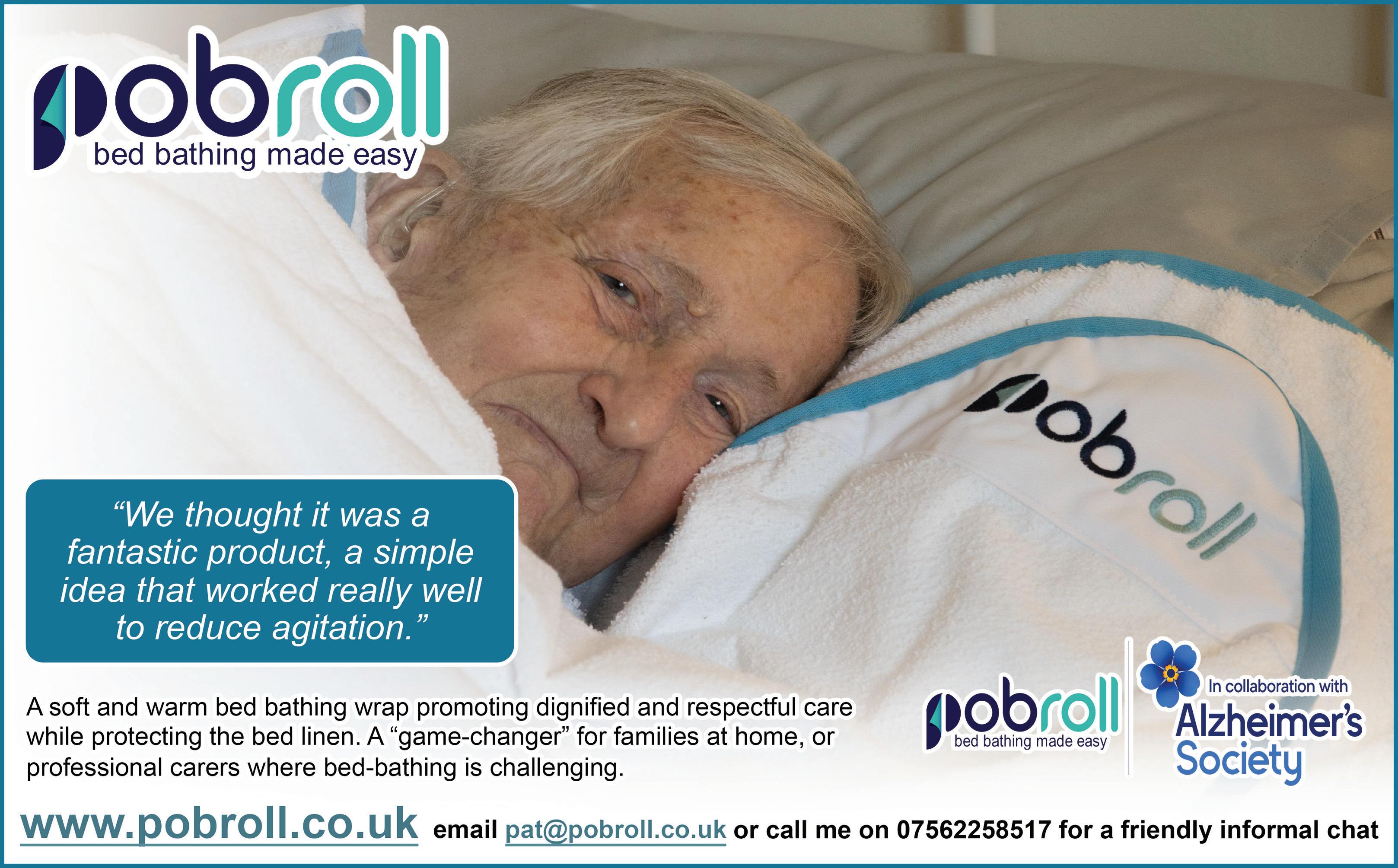

Innovating working patterns, supporting career progression and improving visibility among young people are key ingredients in making care jobs more appealing, according to a new Browne Jacobson report published a year on from a landmark workforce strategy.
These are some of the recommendations set out by the UK and Ireland law firm in its white paper, titled Workforce strategies for care providers.
It builds on the first-ever Workforce Strategy for Adult Social Care in England by Skills for Care, which was published in July 2024, by advising on how care providers can develop their own talent pipelines across three broad themes – train, attract and retain, and transform.
Insights were collected from a roundtable held by Browne Jacobson’s employment and HR services team as part of its “Future of Care” series. It brought together leaders from independent residential care homes, domiciliary care providers, sector-aligned advisers and charities, and the NHS.
Laura Chinyere-Ezeh, HR Consultant who leads Browne Jacobson’s HR services team for the health and social care sector, said: “Skills for Care’s Workforce Strategy aims to ensure we have enough of the right people with the right skills to provide the best possible care and support for the people who draw on it.
“While this sets out policy recommendations at a macro level, it’s vital that care providers are developing their own workforce strategies to ensure they can continue to deliver high-quality care over the coming decades.
“This requirement has been reinforced by the government’s immigration white paper, which restricts care worker visas for overseas workers, who represent a significant proportion of the health and care workforce.
“Therefore, the care sector must work towards ensuring it has access to the people and skills needed to make it fit for the future.
“Despite the absence of formal government adoption and direct financial enhancements such as increased pay or investment, care providers have the opportunity as private businesses to innovate, adopt the recommendations in this report and future-proof their provision with a workforce strategy to meet an increasing demand for their services.”
A wide range of challenges were brought to light during the roundtable and reflected in the report. A key issue is in attracting and retaining young people, with King's Fund research showing only 8% of the social care workforce comprises 18 to 24-year-olds.
Barriers include a perception that parents aren’t supportive of young people’s desire to join the care sector and a communications gap about what the job entails.
Related to this are challenges around flexible working and career development opportunities, which could be tackled by collaboration between the health and social care sectors to foster mutual respect and equitable treatment of employees.
The Workforce strategies for care providers recommendations can be broadly summarised, under the headings of the Workforce Strategy, as:
• Train: Invest in training managers and supervisors to be capable and competent future registered managers.
Ensure this training and development is broad to include leadership, managing people, operations and the commercial aspects of running a business, while building on the traditional governance and care quality focus of registered managers.
Attract and retain: Enhance the attractiveness and accessibility of the care sector by improving visibility among young people, promoting the rewarding nature of care work and career pathways, and by innovating working patterns to adopt flexible work – bolstering diversity and inclusion to reflect the breadth of people who draw on care services.
Transform: As integrated care is promoted and collaboration between the NHS and social care is encouraged, care providers can advocate for their sector by fostering mutual respect between both sectors, by addressing any classism, and working to carve out career pathways as training and experience develop in this collaborative space.
Participants in the roundtable included Karolina Gerlich, of the Care Workers Charity; Rebecca Smith, of NHS Employers; Rick Canavan, of BA Healthcare; Shirley Hall, of Royal Star & Garter; Susanne Chatterley, of Lewisham and Greenwich NHS Trust; and Vishal Shah, of Banyan Care.
To read the full Workforce strategies for care providers report, visit www.brownejacobson.com/insights/workforce-strategies-for-care-providers-future-of-care-report
When care home Brendoncare Froxfield asked resident Jean Birtles what she would like to celebrate her 105th birthday, she said she wanted a snake charmer!
To grant her wish, they invited Paul Smith from Feathers, Fangs and Furries from Andover.
Paul and his family came along not just with a snake, but with a selection of their other exotic creatures to entertain Jean, her family members and friends, residents and team members.
Paul gladly took on the role as the snake charmer for the birthday girl. She is a big animal lover and keeps everyone entertained about all the animals she has cared for over the years. She kept goats and once took them to London by car. She is affectionately known as Granny Goats by her family!
Social Care TV continue to fly the flag for highest quality online training for Health and Social Care, after unwavering commitment to excellence within the sector for over 25 years.
Their widely-used health and social care specific courses - produced and edited in-house - are expertly designed to make learning engaging, informative and, therefore, highly effective for learners. Accredited by CPD, training with Social Care TV is quality assured, comprehensive and relevant.
As one of the leading online training providers in the health and social care sector in the UK, they supply training for local authorities, recruitment agencies, care home groups and other health and social care organisations.
Their feature-rich Manager platform has further been enhanced this year with the introduction of several new Manager tools designed to aid with compliance, reporting and trainee management. Features now available include:
• Compliance Dashboard with Traffic Light System
• Downloadable Trainee Matrix
• Custom Bundles
• Trainee Groups
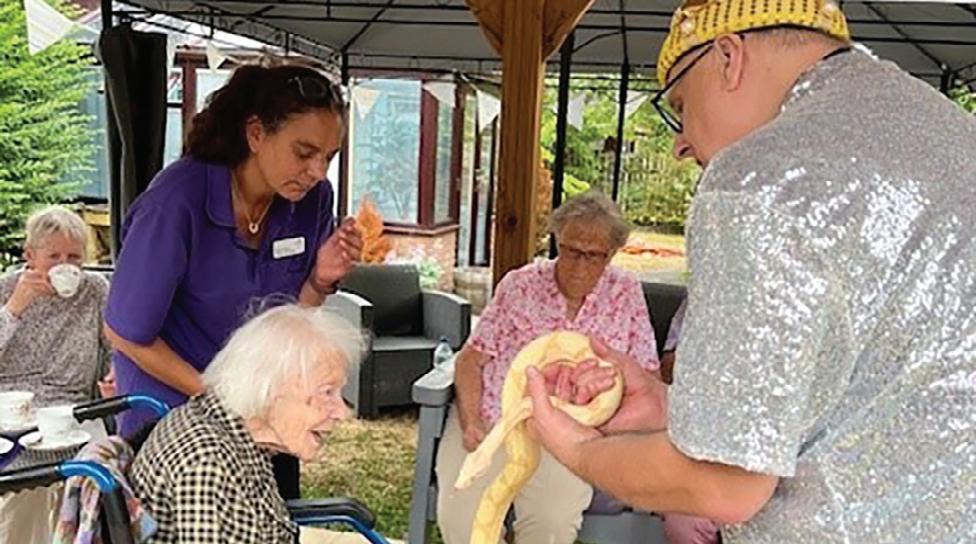
• Bulk Uploads • Bulk Enrolment Onto Custom Bundles
• Course Enrolment Notifications
• Course Reminders
SCTV regularly release new and updated high-quality courses. Previews for all courses can be viewed at: Courses - Social Care TV (www.social-care.tv/courses/course-details)
To enhance their learners' experience further they have created free, comprehensive subject-specific workbooks which were rolled out across all courses this year. This unique addition provides excellent value and a fully robust training package.
SCTV are delighted to have won several awards over the last 12 months including:
• Best Online Health and Social Care Learning Platform’ – Global Health & Pharma Social Care Awards 2024
• ‘CPD Provider of the Year’ – The CPD Awards
• Social Care Training Provider of the Year’ - Corporate Livewire Innovation & Excellence Awards
Gold standard customer service remains a core staple of the business, with expert support and guidance provided via telephone, email and live chat. They place great importance on the training and development of their customer services team to ensure that they continue to provide a personal, friendly and knowledgeable service.
Their much-loved ‘Care Worker of the Month’ award recognises and rewards the selfless dedication shown by care workers across the UK
Jean came to live at Froxfield in 2019, moving there from Bexhill-onSea in East Sussex where she was actively involved in the community and was a much-loved member of the local Women’s Institute. Staying active is very important to her and she believes this is her secret to a long and happy life.
She said afterwards: “Paul is a great entertainer and I knew the others would enjoy seeing him.”
Trudy Allen, Froxfield’s Wellbeing Supervisor, said: “Jean is such a character and when she told us what she wanted to do to celebrate her birthday, we decided we were up for the challenge of finding a charming man with a snake!
A huge thank you to Paul and his family for making this such a special occasion.”

and they proudly support the Care Workers Charity who aim to advance the financial, professional and mental wellbeing of social care workers.
SCTV believe that high quality training should be accessible to all and offer regular, free courses which include a digital certificate accessible via their website.
The company stands behind a clear mission and set of values which define their ethos and their dedication to both the Care Sector and those within it. These can be viewed at: Mission Statement and Core Values - Social Care TV (www.social-care.tv/about/mission-statement-and-core-values) Social Care TV are a responsible business, committed to ensuring that their actions have a positive impact on their employees, customers, the wider health and social care community and the environment.
Above all, SCTV consistently strive to make a meaningful contribution to the wellbeing of those being cared for.
For more information please see: Homepage - Social Care TV (www.social-care.tv) and see advert on the facing page.
In response to the ADASS Spring Survey, Care England has repeated their call for the government to urgently boost funding for adult social care as councils report cutting their prevention budgets by 10% to cover the £774m overspends on the statutory social care services.
Care England’s Chief Executive, Professor Martin Green OBE said: “It’s deeply concerning to hear that councils are being forced to choose between supporting those who need care now and supporting the system in the future by investing in the prevention agenda that this Government have pushed as a priority. The reality that’s left for the real people being supported by care providers now is that councils are doing neither particularly well.”
As local government finance has dwindled over years, and demand for adult social care has increased, councils are increasingly struggling to cover the costs of care. Recent increases in employers’ National Insurance Contributions and the Living Wage are making matters worse as they’re not being covered by the fee uplifts offered to care providers by commissioners, such as local authorities, making safe and good quality care closer to becoming unsustainable, as Care England & hft’s Sector Pulse Check 2024 report has shown.”
Professor Martin Green OBE continued: “The new government have a real opportunity, with local government restructuring and multi-year funding settlements for councils coming down the line, to really hit the reset switch on commissioning and tackle some of the bigger issues in the sector head on. The government’s vision on prevention and community-based care is the first step, but the sector is yet to see the funding to make that reality, and this ADASS survey is yet another addition to a huge base of evidence that shows this.”
“Local councils, care providers, and most importantly, those we support, simply cannot wait until the Casey Commission’s conclusion in 2028 before the required action from government even begins. Whether it’s providers exiting the market or councils issuing section 114 notices, these things are already happening.”
“Another deeply concerning factor is the increase in demand for local authority-funded services as their NHS Continuing Healthcare (CHC) services have been withdrawn, despite Care England seeking assurances that recent cuts to ICBs would not impact CHC budgets. Care England urges the Government, NHS England and ICBs to end the postcode lottery that appears to be emerging in access to CHC.”
Care South, has championed the dedication and hard work of the teams at its 16th Stars Awards ceremony.
The annual event, which took place on Thursday 17 July at AFC Bournemouth’s Vitality Stadium, recognises and rewards individuals and teams from across the organisation who go the extra mile to provide great care to residents and clients. It was the second stage of the Stars Awards following localised events held in the care group’s homes and offices to announce the finalists. Nominations are made by colleagues, residents and relatives.
Hosted by Simon Bird, CEO, it featured members of the teams from each of the not-for-profit charity’s care homes and care at home offices based across Dorset, Somerset and North Devon.

A host of accolades were handed out to worthy winners from those working on the frontline through to their colleagues working behind the scenes to enable the provision of outstanding care. The awards included Care Home of the Year, Care South at Home Office of the Year, Carer of the Year, Newcomer, Dining Experience, Activities Team and Best Support Team to name but a few.
A special presentation was given by Karen Hodges, Group Dementia Lead, highlighting Care South’s
journey to becoming a true dementia care specialist. This includes the care group’s receipt of the University of Worcester’s Hennell Award for specialist dementia care, and Care South’s continued approach to delivering dementia care excellence, and making a difference to those in its care. She highlighted many initiatives such as the Dementia Care Coaching programme, Namaste care, the ‘decaffeinated-by-default trial’, and a unique dementia training experience for all staff members.
Karen’s significant and outstanding contribution to the care of residents living with dementia was then recognised with the Chair’s Award, presented by Chris Kean, Chair of Care South.
Simon Bird, CEO at Care South, said: “I am immensely proud of every member of the Care South team, but extra special congratulations must go to our winners at this year’s Stars Awards as they really do go above and beyond to deliver the very highest quality care to all our residents and care at home clients.
“It is so important that we celebrate the incredible work that our carers and support teams do day in day out – week in week out – to provide outstanding care, as well as Food, Fun and Friendship to all those in our care and bringing reassurance and peace of mind to their families and loved ones.”

By Jack Shreeve, Associate

The residential and nursing care sector is susceptible to cybersecurity risks like any other business sector. The sector is commonly targeted by hackers due to the nature of the data that it holds and the potential value to hackers.
Below are some of the key cybersecurity risks facing the sector and some high-level recommendations as to how care providers can seek to mitigate such risks in its contracts with IT providers.
1. Ransomware. An example of a ransomware attack is the recent Synnovis breach. In June 2024, the NHS was the victim of a major cybersecurity incident with London NHS hospitals needing to cancel or change appointments resulting in a “critical incident”. In this case, the
incident was caused by hackers targeting Synnovis by implementing software into Synnovis’ IT environment (which was being used by the NHS). We are increasingly putting emphasis on contractual provisions requiring suppliers to have robust disaster recovery procedures in place in the event of such an incident allowing systems to be brought back online in the event of an outage.
2. Internet of Medical Things (IoMT). The sector is becoming increasingly reliant on IoMT devices which are connected to the internet. These devices are susceptible to cybersecurity attacks. To mitigate this risk, we typically ask for contractual provisions imposing obligations on providers to continuously monitor for vulnerabilities and implement patches in a timely manner where vulnerabilities are identified.
3. Data protection. If a cybersecurity incident results in the loss or dissemination of personal data, a care provider could face considerable implications from the Information Commissioner’s Office (ICO). The full range of potential implications are beyond the scope of this publication, but care providers should bear in mind that for the most serious of personal data breaches, the ICO can issue fines of up to £17,500,000 or 4% of the company’s annual worldwide turnover. Appropriate data processing agreements should be put in place with adequate liability provisions to provide the care provider with an effective remedy in the event of a breach.
4.Composition of software. The use of open-source software in the underlying code for software should be carefully considered. As shown by the Log4j vulnerability, open-source software can be exploited for vulnerabilities with widespread impacts. We typically ask for a warranty that the software being licenced does not contain open-source software. This typically results in: (a) the provider confirming the extent of
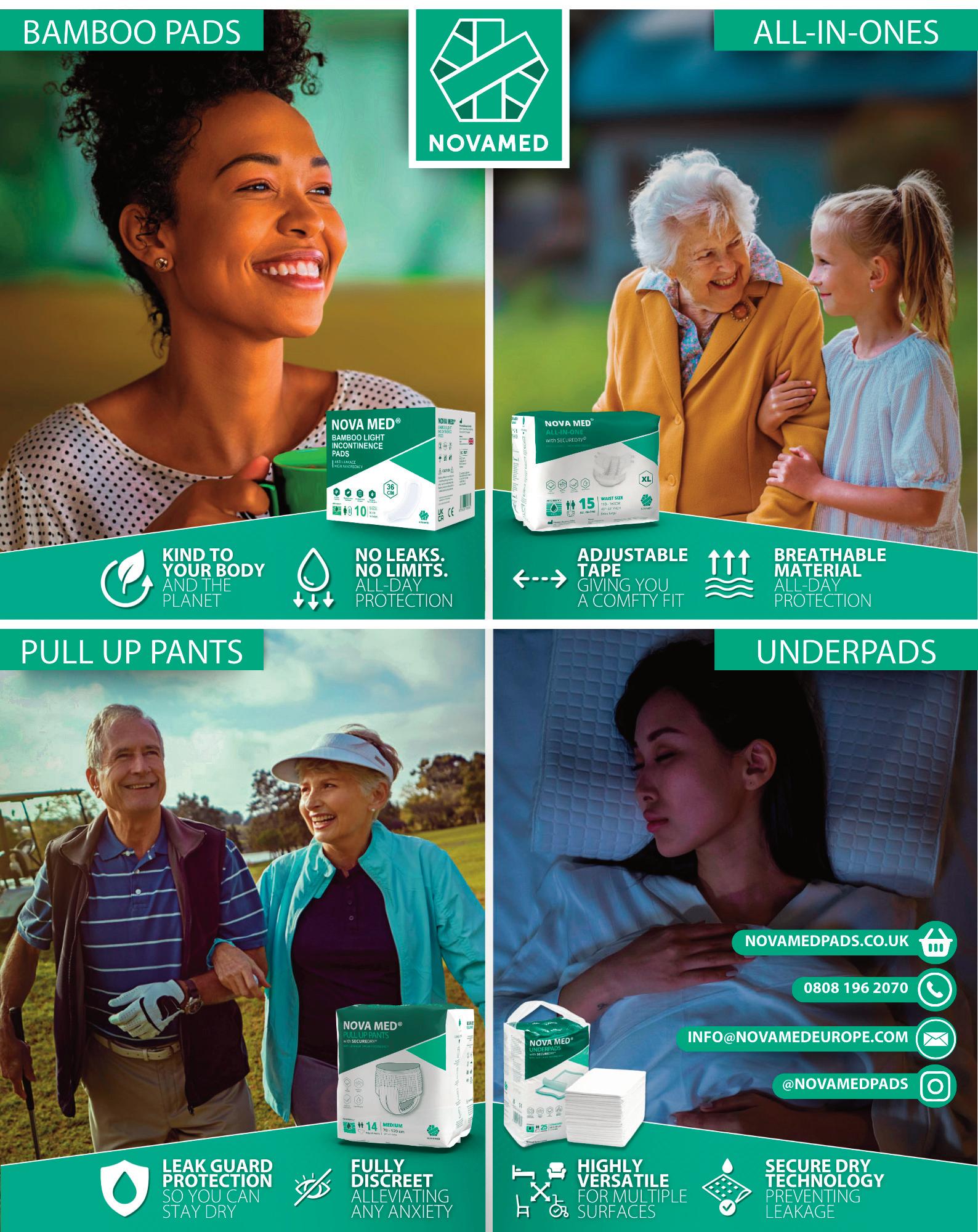

the open-source software in the code; or (b) the provider giving the warranty. If open-source software is used, this would allow for the care provider’s IT team to check for any known vulnerabilities and/or restrictive open-source software code.
5. Phishing. Phishing attacks, where attackers trick individuals into providing sensitive information, are common in a care provider setting. These attacks often target employees through emails that appear to be from trusted sources, leading to data breaches and unauthorised access. These risks can be mitigated by documenting access controls on the information that employees can access, audit rights in respect of IT providers and insisting on IT providers implementing multi-factor authentication.
Industry standards that apply to a client’s business can be a useful tool for imposing security measures on providers. For example, the NHS Data Security and Protection Toolkit provides a framework for assessing data security and protection measures within NHS organisations. Compliance with the toolkit is mandatory for all NHS entities. This could be referred to in the contract with the provider as the minimum expected of the IT provider.
Our advice is that care providers can seek to mitigate cybersecurity risks by:
a. ensuring that detailed due diligence is carried out in respect of IT providers (to properly vet that the provider has the relevant accreditations and certifications in place (such as Cyber Essentials and ISO accreditation); and
b. putting in place contracts which properly allocate risk between the parties and in the event of a breach, provide the customer with an effective remedy.

• We specialise in the sale and purchase of quality used wheelchair accessible vehicles and ambulances.
• They can be bought as seen or refurbished and sign-written to your own requirements.
• Fully serviced, new mot & warranty
• Engineers inspection supplied if required.
• Free delivery service available
• All buses comply with new legislation
•
• Lease hire and purchase


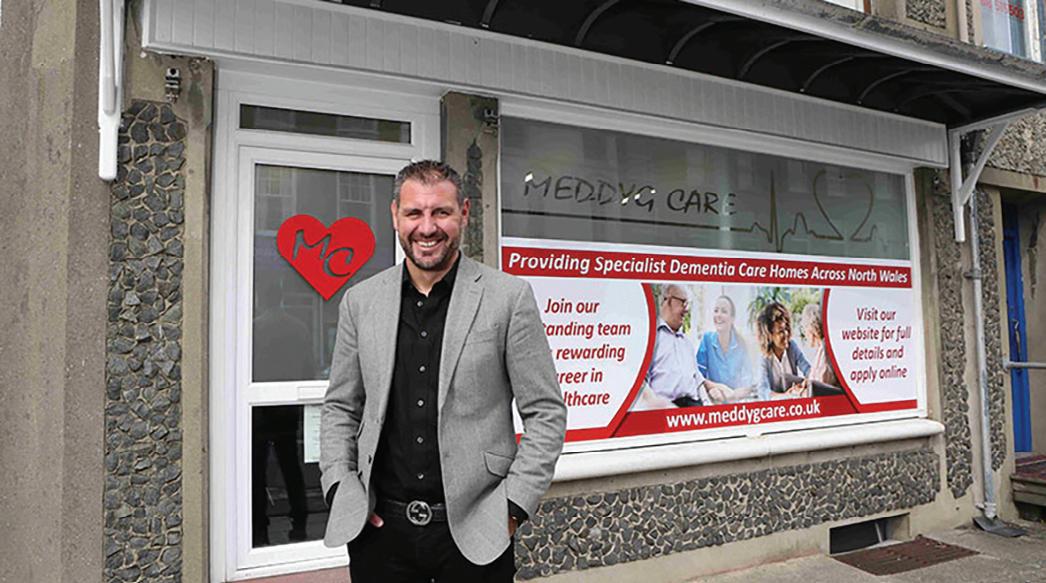
A Welsh care home boss has invited the First Minister to come on a visit to see at first had the threat to services caused by the ban on overseas workers.
Kevin Edwards, a director of Gwynedd-based Meddyg Care, wrote to Eluned Morgan to warn of the “potentially devastating impact” of the UK Government’s decision to end the Health and Care Worker visa.
According to Mr Edwards, whose company operates two care homes in Porthmadog and Cricieth and specialises in dementia care, there was a real risk of care homes and domiciliary care companies being forced to close.
The crisis, he said, was particularly acute in rural areas where it was increasingly difficult to recruit local workers.
The scale of the problem was underscored by official statistics which showed that 15 per cent of registered care workers in Wales were born outside the UK.
In his letter Mr Edwards urged the First Minister to put pressure on the Westminster Government to either reverse the policy or introduce a transitional scheme for critical workers in social care.
At the same time, he wants to see more investment in training and pay levels to attract and retain local workers.
He’s also calling for stronger measures to safeguard international workers from exploitation.
Mr Edwards said: “The social care sector in rural North Wales is already under significant strain, grappling with high vacancy rates, an ageing population, and limited local workforce availability.
“The Health and Care Worker visa has been a critical lifeline, enabling care providers to recruit international workers to fill staffing gaps.
“The withdrawal of this visa will exacerbate existing challenges in
rural North Wales, where geographic isolation and a smaller pool of domestic workers make recruitment particularly difficult.”
Figures show the ban on care workers bringing dependants, which was implemented in March last year, has already led to an 83 per cent decline in visa applications, with monthly applications dropping from 129,000 to 26,000 in a year.
Mr Edwards added: “This sharp reduction demonstrates the policy’s immediate impact, and the complete termination of the visa route will likely deepen the crisis.
“Moreover, the care sector in rural areas faces unique challenges, including limited access to training facilities and higher costs for service delivery due to dispersed populations.
“The loss of international workers, who bring diverse skills and dedication, threatens to destabilise care homes and domiciliary services, potentially leading to closures.
“Such closures would not only disrupt care for vulnerable residents but also place additional pressure on NHS services in North Wales, as hospitals struggle to manage increased demand when social care support falters.
“The care sector in rural North Wales is at a critical juncture. Without urgent action, the withdrawal of the Health and Care Worker visa risks collapsing services that our most vulnerable citizens rely upon.”
“I would welcome the opportunity to discuss this further with you and would like to extend an invitation to you, to visit our nursing homes so you can see firsthand the key role that we and our migrant workers play in our community.
The issue has also been taken up by social care champions Care Forum Wales (CFW) who described the policy as “halfbaked”.
The organisation has warned the policy, which came into force on July 22, risks “extreme workforce shortages” and “potential harm to older and disabled individuals, who depend on consistent care to maintain their quality of life”.
CFW Chair Mario Kreft MBE said: “This ill-thought through policy has come as a double whammy because it coincides with the increase in the employers’ National Insurance contributions which amounts to a 37 per cent rise.
“It’s particularly damaging here in Wales because most people who need social care – whether it’s in a care home or in their own homes – are publicly funded.
“It’s also counter-intuitive because there’s no point investing in the NHS unless you fund social care properly. If you
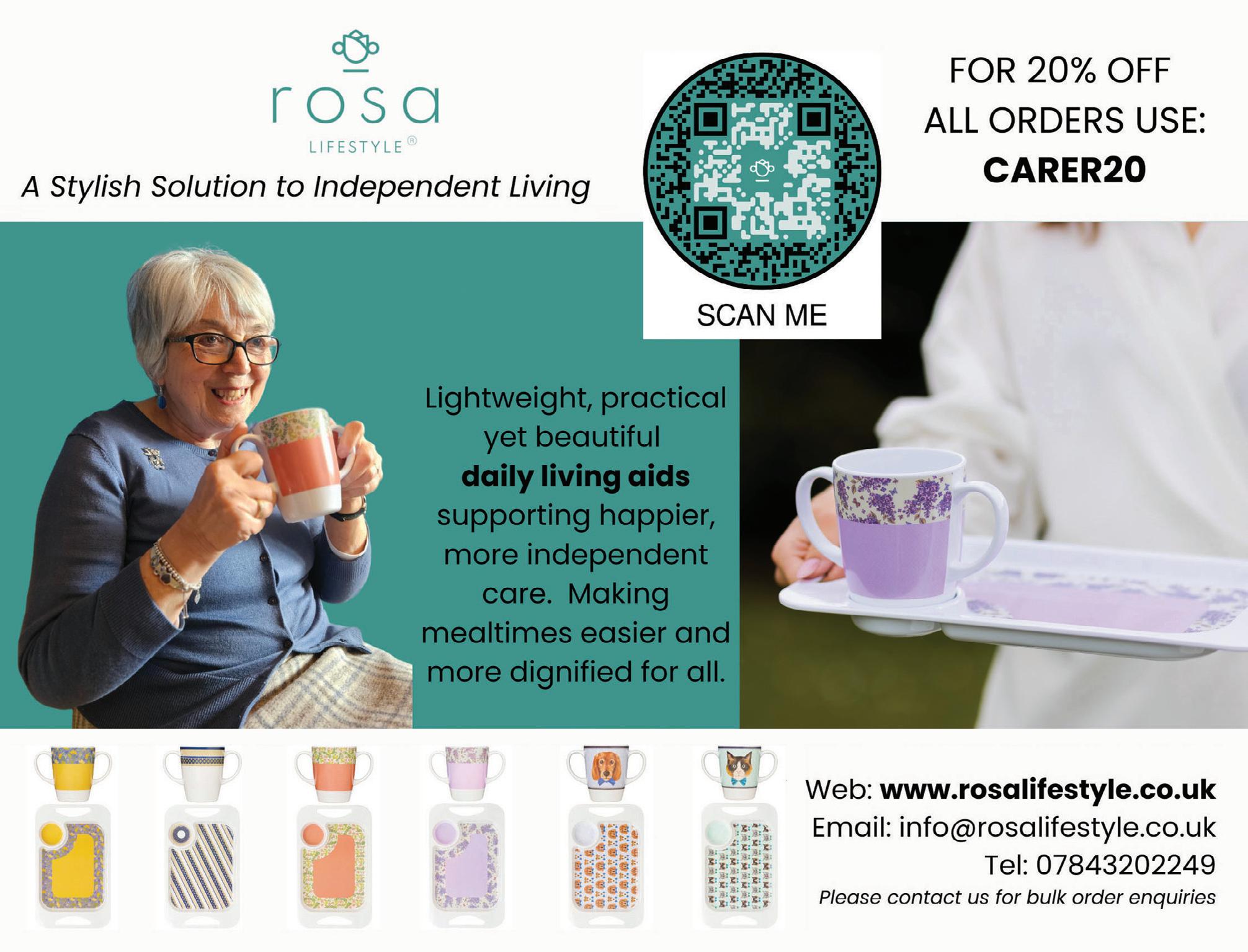
don’t fix social care you can’t fix the NHS.
“I’d also like to quash the myth once and for all that international workers are cheap labour because the exact opposite is true.
“Recruiting overseas staff is always the last resort because it’s a lot more expensive than it is to employ local people which is always the first choice whenever that’s possible."

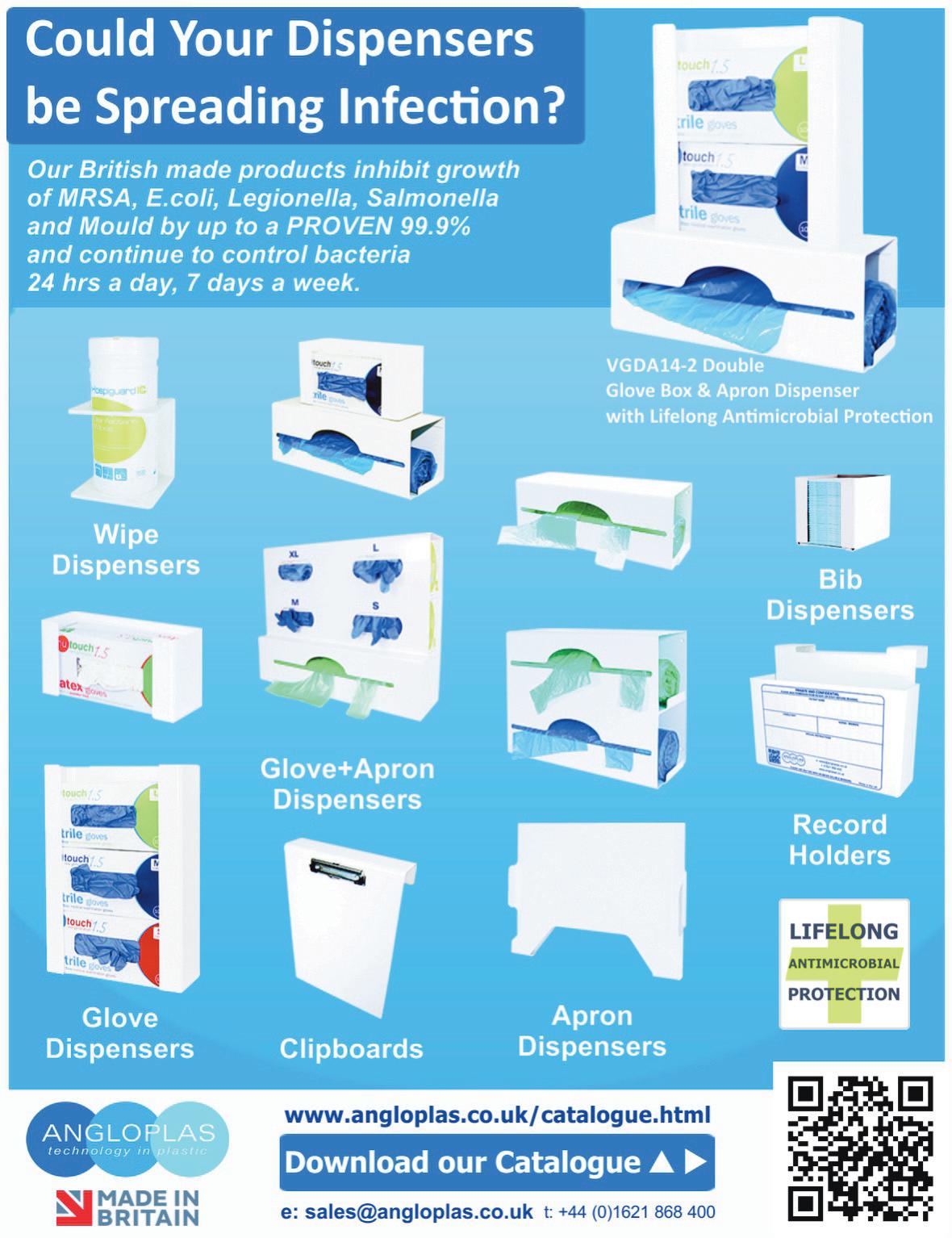
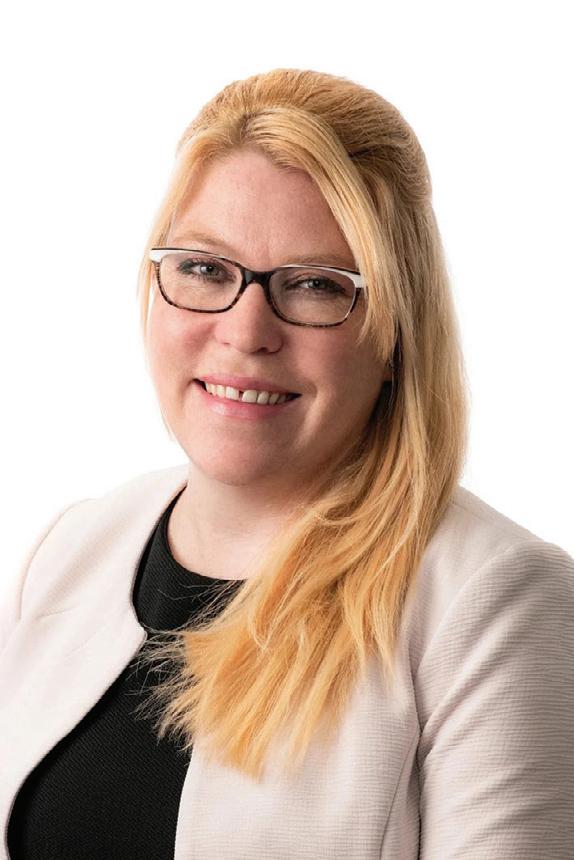
This week the UK government has rolled out several significant immigration reforms that will reshape how social care organisations hire overseas talent. The changes include:
• A sharp increase in the skilled worker salary threshold
• A return to RQF Level 6 as the qualification requirement, eliminating over 100 lower-skilled roles from eligibility
• The closure of social care visas to new overseas applicants
• The introduction of a temporary shortage occupation list as a partial workaround
• These reforms form part of the Home Office’s broader strategy to “restore control” of the immigration system, following a near 40% drop in visa applications since Labour came to power.
WHAT’S CHANGING?
1. Skilled worker threshold tightens
The minimum salary for Skilled Worker visa applicants has risen significantly, alongside a rise in the qualification level required (now RQF Level 6, which is equivalent to an undergraduate degree). This removes many roles in retail, hospitality and construction from eligibility.
2. Overseas recruitment in social care ends
care workers and senior care workers, are now closed to new international
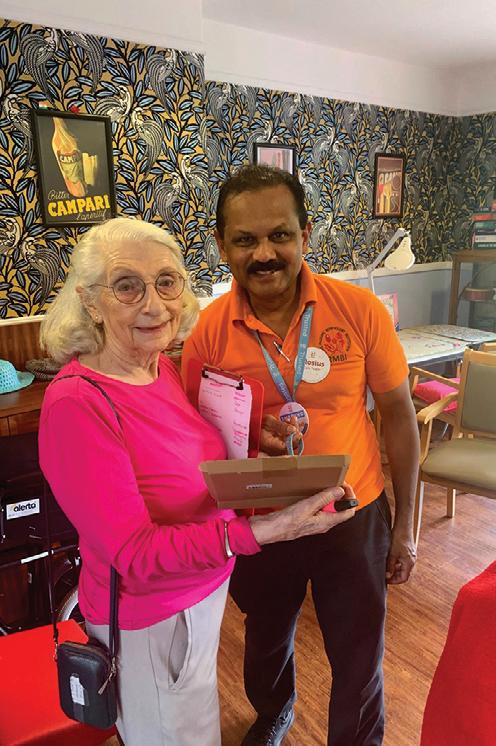


By Michelle Holmes, MD at Holmes & Partners
recruits. Employers must now fill these roles with British citizens or those already residing in the UK with the right to work.
3. Longer settlement times and higher English requirements
Future proposals include increasing the settlement period from 5 to 10 years and raising English language requirements for visa holders and their dependents.
A full breakdown of proposed changes can be found in the Home Office white paper: Restoring Control
Over the Immigration System. Read the official statement: https://www.gov.uk/government/news/majorimmigration-reforms-delivered-to-restore-order-and-control
Michelle Holmes, Managing Director of immigration consultancy Holmes & Partners, says:
“While the government’s recent immigration reforms tighten the skilled worker route, many employers overlook an immediate, compliant solution: hiring international graduates already in the UK on Graduate visas. These talented graduates can fill critical roles and seamlessly transition into Skilled Worker visas later. It is a win-win for UK businesses facing skills shortages – and for graduates seeking long-term sponsorship.”
WHAT CAN EMPLOYERS DO NOW?
While some white paper proposals remain under consultation, the changes being introduced this month are enforceable immediately. Employers should:
• Review current sponsorship plans and whether affected roles are still eligible
• Audit care recruitment pipelines to assess exposure
• Explore Graduate visa hiring routes as a strategic alternative
• Stay informed on proposed settlement and compliance changes due later in the Parliament
At RMBI Care Co. Home Barford Court, in Hove, one thoughtful resident has found a beautiful way to say thank you to the care team.
Stephani, a much-loved resident at the Home, recently took it upon herself to recognise the dedication of the staff by handing out personalised keyrings, each featuring a positive affirmation and a heartfelt message of gratitude.
The keyrings, adorned with uplifting quotes, such as “You’re amazing” and “This is a reminder of how great you are”, were handed out by Stephani herself in a small, informal gathering with the team. “We
appreciate you so much and everything you do for us,” said Stephani, as she warmly presented the tokens to the carers. Her thoughtful gesture touched everyone who received one, reinforcing the Home’s strong sense of community.
“Stephani wanted to show her appreciation to the care staff and felt it was a wonderful touch to be recognised by a resident,” says Home Manager Gavin Kingham. “It meant a great deal to the team to receive such kind words and gratitude directly from someone they care for every day.”
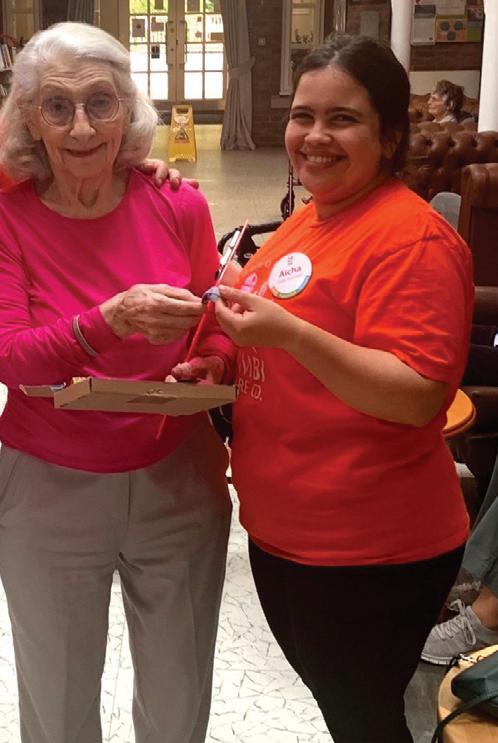
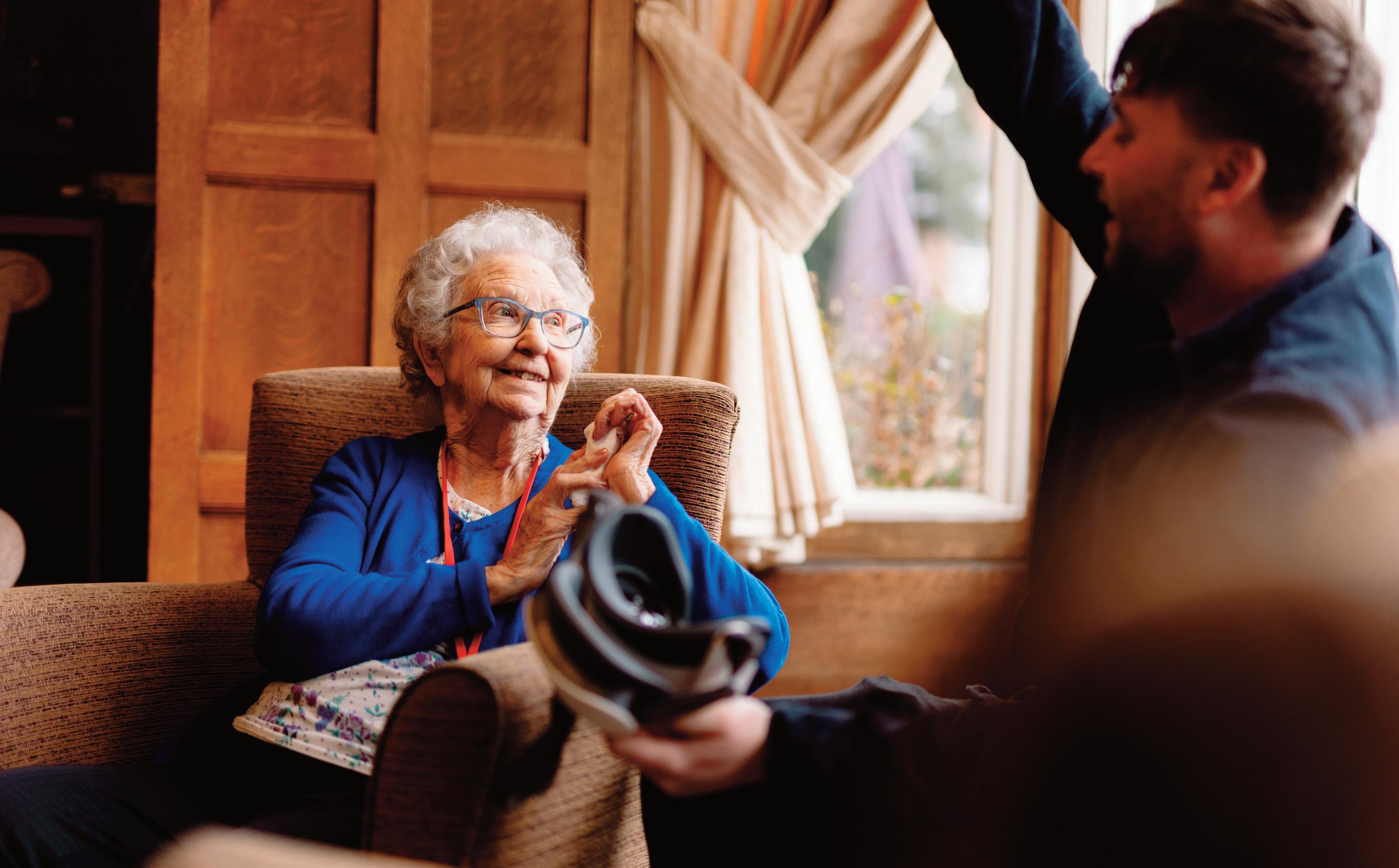

The UK government has launched the Civil Society Covenant, outlining a new way of working that puts people and communities at the heart of decision making.
The Covenant sets out how civil society and public bodies will work together at both national and local level in the future, to design policy that works for everyone. While also marking a commitment to improve collaboration across wider public bodies in health, local government and the justice system.
It applies to all UK government departments and recognises the vital role of charities, social enterprises, faith-based groups, unions, funders and informal community organisations.
AS PART OF THE COVENANT’S LAUNCH, THE GOVERNMENT HAS CONFIRMED:
• a new Joint Civil Society Covenant Council, which will bring together civil society and senior officials to oversee how the Covenant is implemented
• a Local Partnerships Programme, designed to support better working relationships between local authorities, public bodies and civil society

• a developing VCSE-HM Treasury forum, providing a regular space for engagement on economic and financial issues affecting the sector.
These measures aim to support a stronger, more consistent relationship between government and civil society at all levels.
Saskia Konynenburg, Executive Director, NCVO SAID: “The voluntary sector is vital to the fabric of a fair and equal society. Today, the government has recognised the crucial role our sector plays in achieving that. The Civil Society Covenant lays out the ambition for how we put people and communities back at the heart of decision making and lays a roadmap for a relationship where true lived experience forms the basis of designing good government policy.”
“In 2024, NCVO and ACEVO led a major engagement exercise with the Department for Culture, Media and Sport (DCMS) hearing from over 1,000 civil society organisations. Organisations told us they wanted a Covenant with clear commitments, meaningful accountability, and practical impact.”
“We published our findings and recommendations in May 2025. Since then, we’ve contributed to the Civil Society Advisory Group convened by DCMS to help shape the final version.”
“We’ve been working with government officials, partners and our infrastructure and membership body counterparts to make sure the final Covenant works for those it is designed to support.”
Paul Farmer Chief Executive at Age UK said: “For many years, we have seen the positive role that civil society partners can play as strategic partners and independent advocates. We can play a significant role in rebuilding communities locally and shaping change nationally.
“We welcome the publication of the covenant as a crucial first step in rebuilding trust and partnership working between civil society and government at all levels. We know the crucial role those local organisations, such as local Age UKs, play in supporting communities.
“The announcement of joint task and finish groups on key topics like commissioning are especially welcome to help ensure a level playing field for charities who deliver lifesaving, life changing and life affirming support.
“The task now is to build on the momentum to create and embed positive change both locally and nationally.”

Care England has today responded to the Health Foundation’s new report “Poverty, pay and the case for change in social care” with a call for urgent and transformative government action to address the scandal of in-work poverty among care workers.
The Health Foundation’s analysis reveals that 1 in 5 residential care workers lives in poverty, and over 1 in 10 are food insecure. Perhaps most shockingly, 1 in 10 children of care workers go without essentials such as a warm winter coat. The report also highlights deep inequalities: 35% of care workers born outside the UK are in poverty, compared to just 13% of those born in the UK. Professor Martin Green OBE, Chief Executive of Care England, said: “It is unconscionable that the very people entrusted with looking after our most vulnerable citizens are themselves struggling to heat their homes, feed their children, or buy basic necessities. Poverty pay is not just a workforce issue: it is a moral failure.”
The report estimates that raising the wage floor in line with NHS Agenda for Change Band 3 would lift
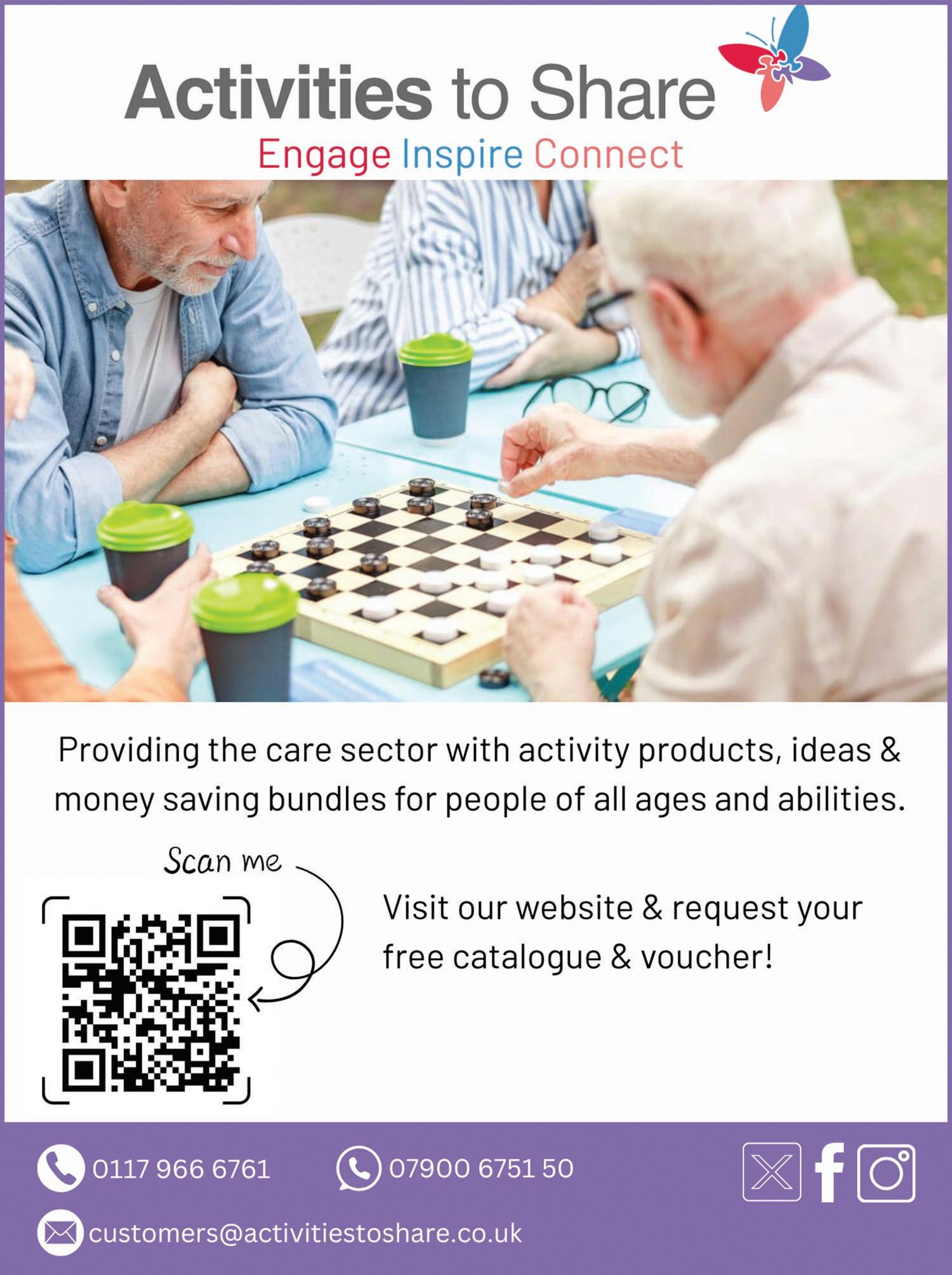
incomes for care workers by an average of 6.6%, and nearly 15% for those in the poorest households. Yet it warns that without extra funding, such changes could jeopardise services.
Professor Green continued: “The Fair Pay Agreement is a step in the right direction, but it will be meaningless unless backed by substantial, ringfenced funding. Providers cannot deliver better wages in a chronically underfunded system. Government must rise to this challenge, not by asking more of care providers, but by giving them the tools to deliver fair pay and secure conditions and to stop applying tax increases such as the national insurance increase on employers, hindering their ability to pay their staff more.”
Care England supports the introduction of a sector-specific minimum wage, better sick pay, pensions, and more secure contracts. However, it stresses that wage uplifts must not come at the cost of reduced care packages or workforce reductions.
Professor Green concluded: “We need a whole-system reset. If ministers are serious about reducing poverty and delivering economic growth, they must start by valuing and adequately funding social care. We back the report’s call for cross-government action on poverty that delivers proper investment, a sustainable workforce strategy, and a firm commitment to eradicating poverty from the profession.”
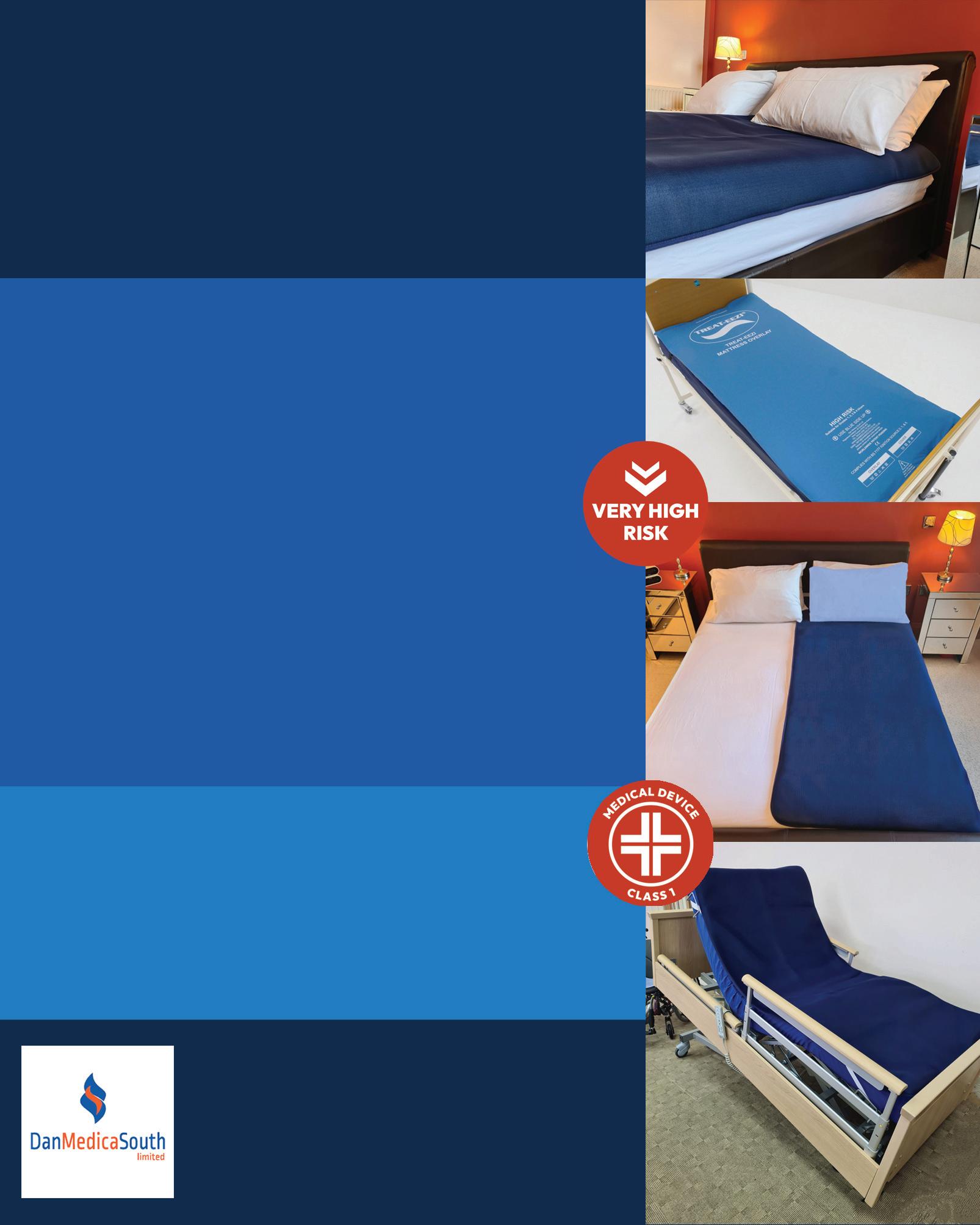

A new report from the Health Foundation reveals that people working in care homes and their families are twice as likely to live in poverty as the average UK worker. Analysing national data from 2021/22 to 2023/24, the independent health charity finds that 1 in 5 residential care workers in the UK lives in poverty, more than 1 in 10 experience food insecurity, meaning they risk going without food, and 15% rely on Universal Credit. 1 in 10 children of residential care workers go without essentials, like a warm winter coat.
Our jobs help shape the risk of living in poverty. 80% of UK jobs paid more than the average care worker wage of £12 an hour in 2024, many care workers are on zero-hours contracts, and exploitation of workers is on the rise in social care. Successive governments have failed to invest in our care system, affecting how much care providers pay workers.
The government’s Employment Rights Bill has the potential to transform work in social care, helping to ensure people are cared for and lift workers out of poverty. Planned ‘Fair Pay Agreements’ for social care could set a new sector minimum wage. Our new analysis estimates that raising the wage floor in social care to the level of clinical support workers and administrative workers in the NHS (Agenda for Change Upper Band 3) would result in an average 6.6% rise in household income for residential care workers and their families, leading to an important reduction in poverty.
The Health Foundation has previously estimated that £2.3bn would be needed in 2028/29 to increase pay
for the care workforce to at least NHS Agenda for Change Band 3.
While the recent Spending Review reiterated the government’s commitment to a Fair Pay Agreement, it did not provide enough funding to both meet growing demand for care and fund a meaningful improvement to care workers’ pay. Current spending plans risk leaving local authorities to choose between providing people with the care they need and funding much-needed wage rises for the care workforce.
Alongside workforce measures, wider improvements to social care are essential. The Casey Commission should move swiftly to bring forward its recommendations, including to help improve access to publicly funded care and better protect people against care costs.
Beyond social care, bold policy action is needed to tackle poverty in the UK, which worsens people’s health and cuts lives short. Currently, the government is choosing not to take the measures that would have the most significant impact on poverty, such as scrapping the two-child limit on benefits.
Lucinda Allen, Policy Fellow at the Health Foundation, said, “Caring for older people and disabled people is vital and fulfilling work, but it has long been underpaid and undervalued. Sadly, it is no surprise that so many care workers and their families are struggling to keep up with bills, afford enough food, put savings aside, and provide warm clothing for their children.”
“Our report also finds worrying inequalities affecting migrant workers in social care. Over one-third of residential care workers born outside the UK live in poverty, compared to one tenth of those born in the UK.”
“Around 1 in every 20 working people in England is employed in social care. Enhancing pay and working conditions in the care sector could be an important part of the government’s growth agenda, improve people’s lives, and help fill the 131,000 social care vacancies. The government must deliver on its promise of fair pay for care workers, alongside wider improvements to our care system.”
Say Goodbye to long lines, chasing down prescriptions or scrambling to find you medications in store!
At Automeds Pharmacy, we’re reshaping the way healthcare is delivered. Serving the South of England with over a decade of expertise, we’re proud to be a distance-selling pharmacy that is truly dedicated to the evolving needs of our patients alongside specialising in care home dispensing.

Whether you’re a care home looking for reliable medication management or are in need of hassle-free prescriptions, Automeds Pharmacy is here to streamline your experience. Our team is specially trained to provide bespoke, efficient medication solutions tailored to your needs.
We partner with a range of eMAR providers, offering flexibility and variety—because every patient deserves a solution that fits just right. From same-day deliveries to bulk dispensing for care homes, we ensure you get the medications you need, when you need them.
We understand that repeat prescription ordering can be a hassle. That’s why our experienced team takes the pressure off our care home staff by handling this process for them. No more wasting time hunting down prescriptions—just more time for what matters most: quality care for residents.
With a daily cut-off time Monday to Friday, urgent items are delivered the same day, so no one has to wait.
As Automeds Pharmacy continues to grow, our mission remains steadfast: to offer tailored medication solutions that make a real difference in the lives of our patients.
We’re not just a pharmacy—we’re a partner in your healthcare journey, and we’ll be with you every step of the way.
Enquire today for your bespoke package! 01305 230091 or wecare@automeds.co.uk or visit www.automeds.co.uk


The
the cost of reduced government revenue.
THE UK TAX WEDGE
GPA’s analysis of OECD taxation data shows that in 2024, the UK had a relatively low tax wedge of 29.4%, broken down as:
• 13.9% income tax
• 5.3% employee contributions
• 10.2% employer contributions
This was below the OECD average of 34.9%, which included 13.4% income tax, 8.1% employee, and 13.4% employer contributions.
NATIONS WITH THE LARGEST TAX WEDGES
The highest tax wedges were seen in:
• Belgium: 52.6% (20.3% income tax, 11% employee, 21.3% employer)
• Germany: 47.9%, with a high 17.3% employee contribution
• France and Italy: 47.2% and 47.1%, driven by large
employer contributions (26.7% and 24%)
THE UK TAX WEDGE IS NOW ON THE RISE
The bad news for the UK is that when 2025’s data is published, its tax wedge is likely to have increased. This is due to the increase in Employer National Insurance Contributions that took effect in April 2025 which have significantly increased staffing costs for the nation’s businesses.
This increase to the UK’s tax wedge means businesses may be less inclined to hire new employees. We have already seen this play out, with small businesses struggling to stay afloat due to inflated hiring costs, and large businesses radically reducing their headcounts.
Melanie Pizzey, CEO and Founder of the Global Payroll Alliance, says: “The UK has previously benefited from a relatively moderate tax wedge compared to many OECD nations, which has helped support job creation and business investment. However, the recent rise in Employer NICs will already be shifting that balance. As staffing costs rise, so too will the tax wedge, putting pressure on employers and potentially dampening appetite for hiring.
“This change comes at a time when businesses, particularly SMEs, are already facing stifling cost challenges on multiple fronts. An increasing tax wedge risks tipping the scale, leading to reduced job opportunities and slower economic recovery. For policymakers, this should be a prompt to consider the broader impact of employment taxation on business confidence and labour market resilience.”
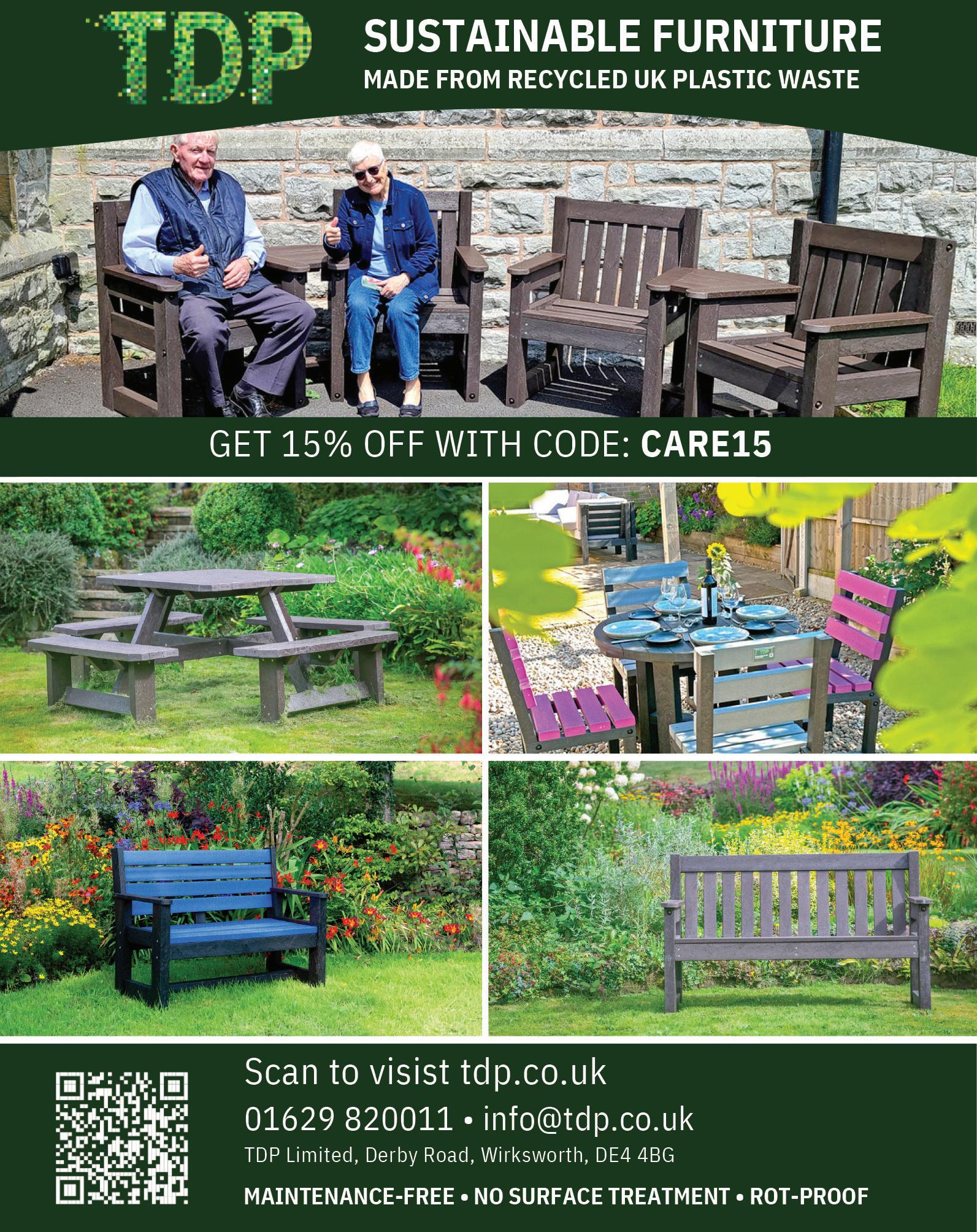



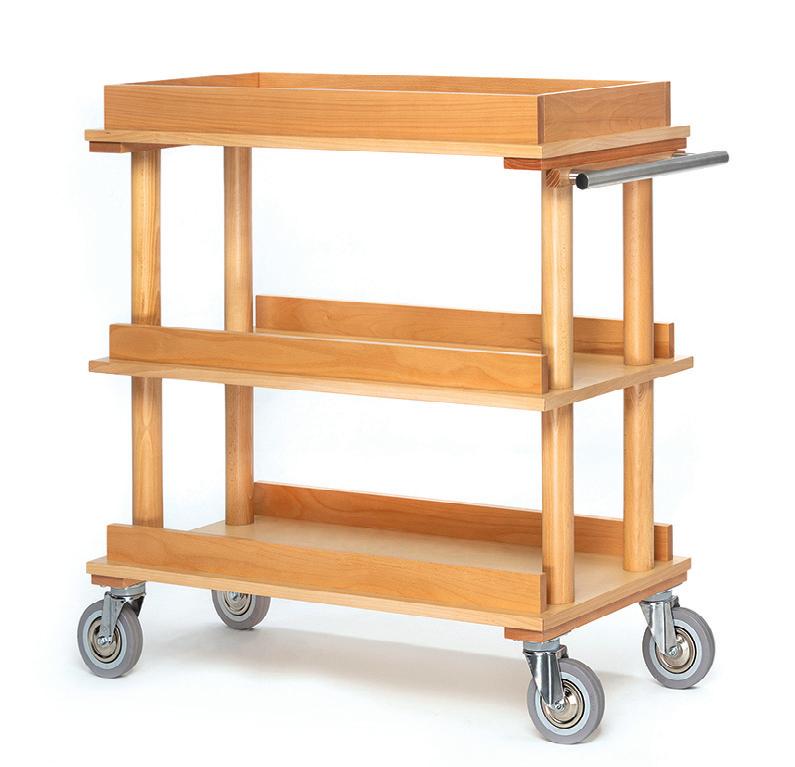
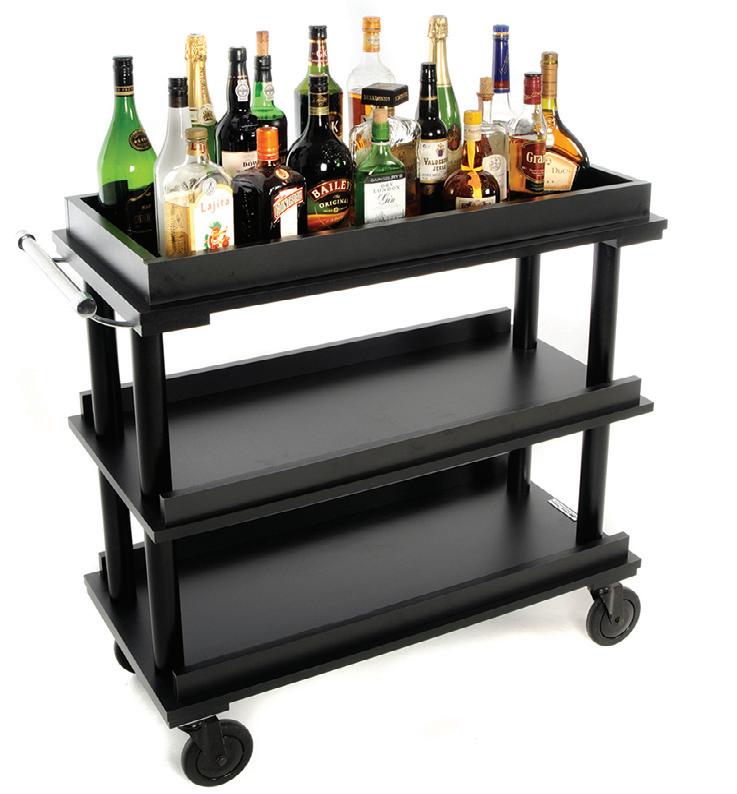
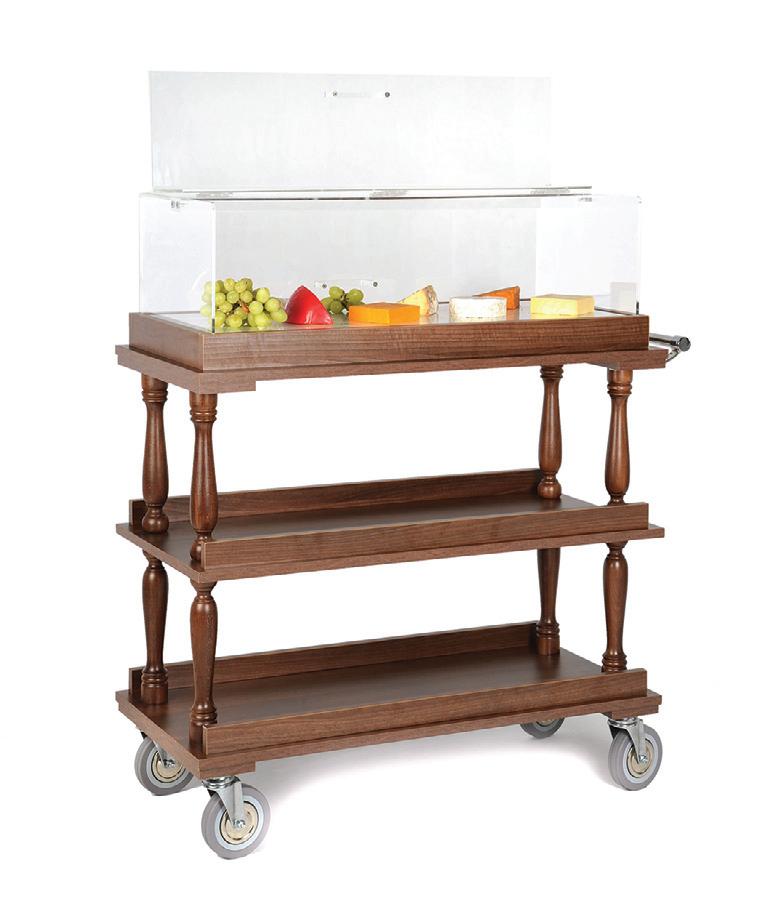

Implementing and managing a Legionella control regime can sometimes seem daunting and complex. Invariably, a lot of resources, time, and effort are needed to achieve the required standard and provide assurance to senior management and auditors that controls are effective and those that are not are being managed and rectified appropriately.
WHY HAVE LEGIONELLA LOGBOOKS?
Logbooks are an effective tool for recording all water hygiene-related activities, and when properly maintained, provide hard evidence that gives assurance in the event of scrutiny or audit.
LEGIONELLA GUIDANCE
When it comes to water hygiene, having concise and accurate water safety records is key. Not only does it help you stay compliant with guidance and regulations such as HSG274, ACoP L8, and HTM04-01, but it also ensures that everyone is aware of the status of your water systems.
If your business has five or more employees, it's a legal requirement for you to keep records of significant findings on hand, including Legionella Risk Assessments and the steps taken to prevent and control Legionella. This not only keeps you compliant but also helps create a safer environment for everyone involved.
If there are fewer than five employees, there is no requirement to record anything; however, it is good practice to keep a written record.
HOW LONG SHOULD I KEEP MY LOGBOOK FOR?
Understanding how long to keep records is vital for any organisation. Here’s a breakdown of the key guidelines:
Current Records: All records must be retained for the period they remain current. After records are no longer current, they must be kept for at least two years. This allows for any necessary reviews or audits related to those documents.
Monitoring and Inspection Records: Certain records, specifically kept for monitoring and inspection purposes, have a longer retention requirement. These should be maintained for at least five years to comply with regulatory standards.
It’s also a good idea to keep a list of your staff’s Legionella training records handy, so you can track who has been trained and when they completed their training. Other valuable records to keep include records of any external service providers, such as water treatment specialists, and information on other hazards, including chemical safety data sheets.
When it comes to maintaining a logbook, whether in written or electronic form, caution is paramount. Records should contain accurate information about who completed the work and when it was conducted. This level of detail is not just best practice; it's often a legal requirement. Keeping records that are vague or incomplete can lead to serious repercussions down the line.
It's also essential that all records are signed, verified, or authenticated by a signature and date or other appropriate means. Failure to do so can undermine the credibility of your documentation and may result in disputes regarding accountability.
WHAT SHOULD MY LOG BOOK INCLUDE
Log Book and records should include details of the following: The names and positions of the individuals who are responsible for implementing your written scheme, along with lines of communication.
Written by Roy Sullivan, Senior Consultant, Water Hygiene Centre
• A Legionella risk assessment and a Legionella written scheme
Schematic diagrams of the water systems
Specific details of what precautionary measures you've taken. The key is to be clear and detailed enough that anyone reading your log can see precisely what was done. Don’t forget to include the dates! It’s super important to track when each measure was implemented. This not only helps you stay organised but also provides a timeline that can be useful for future reference or audits.
Any remedial work that’s needed and what has already been completed, along with dates.
Details of names and dates of visits from contractors, consultants and all other appropriate personnel
Relevant Information on all other hazards, e.g. treatment chemicals
• Cooling tower and evaporative condenser notification (if applicable to your site)
Legionella Training records of personnel
Contractor accreditation/competency records – i.e. LCA registration
Method statements for any works carried out. Think of these as your blueprint for what you did and how you did it. Including method statements in your logbook not only makes it easier for you to track what you've accomplished but also serves as a valuable reference for future projects
When it comes to keeping a logbook, you want to ensure it's both informative and easy to follow. Be sure to include the results of any monitoring or inspections you've had, as well as the results of any tests or checks completed. Don’t forget to record the all-important dates of when each activity took place. Things to think about include
Results of any microbial or chemical analysis of the water
Temperature monitoring records
Water treatment chemical usage
• Inspections and checks you perform on the water treatment equipment help to confirm correct operation
Any Inspections or checks on the water system components and equipment to confirm correct and safe operation
Records of any maintenance performed on the water system components and equipment. Don't forget to document any information related to your water treatment system as well.
Cleaning and disinfection procedures, supported by any reports and certificates. This includes detailing the products used, the frequency of cleaning different areas, and any special techniques employed.
When completing log books and records, it is essential that an audit trail is in place, indicating the individual concerned and the dates and times when monitoring or maintenance activities took place.
The devil is in the details. Subcontractor reports, in particular, should be as comprehensive as practicable. For example, TMV maintenance, cold water storage tank inspections, and calorifier annual inspections can be easily enhanced with photographs that include live time and date stamps. A picture speaks a thousand words and is solid evidence of the maintenance activity undertaken on your behalf.
A well-maintained Legionella Logbook system will provide assurance that you are managing the risk from Legionella and other waterborne pathogens in line with current guidance. It provides evidence and an audit trail for all your water hygiene monitoring and maintenance activities.
In our day-to-day work, we often think we’ve accomplished tasks just because they’re in our heads or we’ve discussed them in passing. However, when it comes to audits or compliance checks, having everything well-documented is crucial. It not only protects us but also shows that we are accountable and organised.
Caring for a loved one after a stroke can be both rewarding and challenging—especially when mobility becomes limited and everyday tasks, like washing, suddenly feel overwhelming.
Freda, 80, found herself in just such a situation while caring for her husband Eric, 84, who had recently suffered a stroke. Over the course of six months, Eric’s mobility declined to the point where walking—even with help—was too dangerous. The risk of falling, and potentially pulling Freda down with him, meant that Eric now had to be washed in bed.
Unfortunately, Freda wasn’t happy with the care Eric was receiving. He never felt properly clean or refreshed. “He was being washed with wet wipes,” she explained, “which left him feeling sticky and far from properly clean.”
That’s when Freda and Eric were introduced to the pobroll® for stroke survivors—a practical, comfortable, and hygienic solution designed to make bed-based washing easier, more effective, and more dignified for both patient and carer.
After their very first use, Freda wrote:
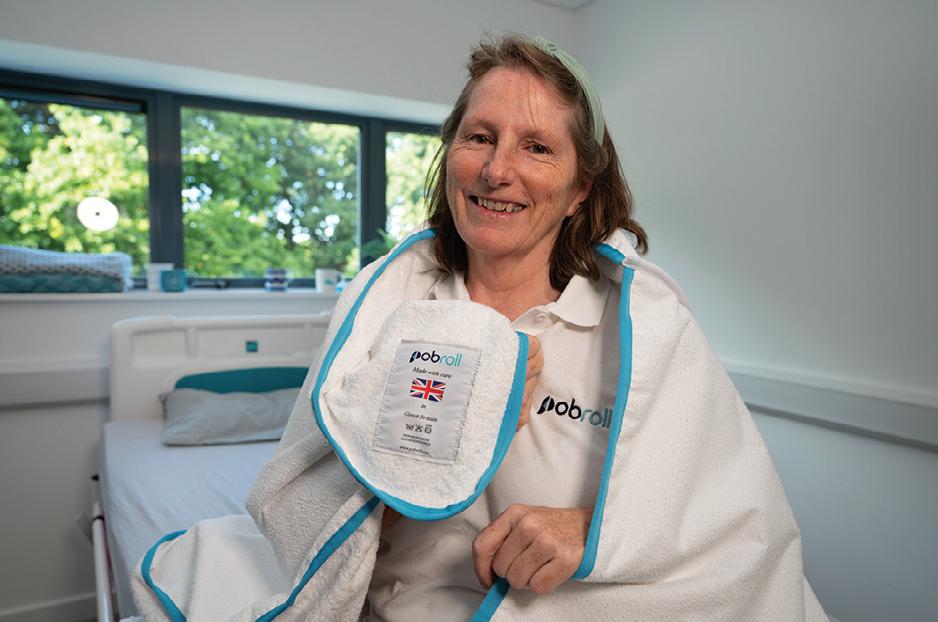
"I thought you would like to know how we got on with our first use of the pobroll® this morning. I feel it went very well for our first attempt. Not sure that I got all the folding correct, but the important thing was that Eric had a good wash and says he is feeling really fresh today. It is so good to be able to give him a
'proper' wash—and he really looks forward to his regular treat."
For people like Freda and Eric, the pobroll® isn’t just a product—it’s a small but powerful way to restore dignity, comfort, and a sense of normality in daily care. It enables carers to give their loved ones a thorough wash with minimal stress or mess, improving not only hygiene but also emotional well-being.
WHY THE POBROLL® FOR STROKE SURVIVORS IS A GAMECHANGER IN BED-BASED CARE
• Unlike traditional sponge baths or wet wipes, the pobroll® allows for a proper, full-body wash while the person remains in bed. It’s simple to use, easy to clean, and designed to provide a dignified experience for those with limited mobility.
• For caregivers, it removes some of the anxiety and physical strain that often comes with personal care. For patients, it brings back a much-missed sense of freshness and routine—often described as a “treat” they look forward to.
If you're caring for someone with limited mobility due to stroke, illness, or age, the pobroll® for stroke survivors could make a meaningful difference in your daily routine—and theirs.
Because everyone deserves to feel clean, comfortable, and cared for.
For further information, see the advert on page 5 or visit www.pobroll.co.uk

We offer high-quality residential, nursing, dementia and respite care in a welcoming and engaging environment. Arrange a visit to discover comfort, companionship, and expert care. Find your





Providers Unite has stepped up its campaign exposing the UK care crisis with a new film that reveals emotional truths from care and support workers, individuals and their families.
The film was launched on YouTube yesterday (July 22) and can be seen here
The Backbone of Care Filmed between February and July 2025, documents the rise of Providers Unite and their urgent, emotional, and politically charged campaign to save Britain’s collapsing social care and support system.
Through powerful interviews interspersed with moving scenes from their first rally at Westminster earlier this year, they convey the stark economic truths, revealing how the social care sector forms the foundation of our communities and the invisible pillar maintaining the NHS.
Moreover, how successive governments' failed promises of reform now finds social care and support on the brink of collapse, which will be a national tragedy, unless urgent action is taken! ‘
The Backbone of Care’ follows the mobilisation of thousands of care providers, carers, and families who came together on the 2025 Day of Action to demand urgent government reform.
Providers Unite spokesperson Katrina Hall said: “With over 1.6 million professionals supporting 1.2 million individuals, social care is the UK’s invisible infrastructure.”
“Yet the sector is under critical threat as a result of 30 years of government underfunding, policy shifts, wage pressures, and the escalating costs of National Insurance. In this film, we hear the truth from the front lines: stories of burnout, collapse, heartbreak and resilience.”
“From green-carding MPs in the Palace of Westminster to marching with placards and chanting ‘Who Cares? We Care,’ the campaign captures a collective roar of defiance from our nearly 5000 members.”
“This documentary is not just a call for reform; it’s a living record of the social care and support sector refusing to go unheard. ‘I’ve worked in care for over two decades — but I’ve never seen it this bad.”
“We’re not asking for charity. We’re demanding justice.’ said Katrina Hall. The film shines a spotlight on our invisible workforce and nearly 6 million unpaid carers propping up the UK’s care system.”
“It makes a clear call to action for MPs and the public to stand with Providers Unite ahead of their next Day of Action at the Labour Party Conference in Liverpool this September.
‘This is our love letter to the care and support community, but also a line in the sand to our Prime minister and government.
You cannot build a National Care System on the back of thousands of broken services and millions of lives, without truly engaging us!’ Katrina added.


Silver Pride, the annual celebration of LGBTQ+ life and culture specially for the over 55s, has made a welcome return to Crewe for 2025.
Hosted by not-for-profit dementia specialist, Belong, in partnership with sexual health charity, Body Positive Cheshire & North Wales and its social network, Silver Rainbows, guests of all ages painted the Brookhouse Drive care village rainbow as they revelled in the festivities with live entertainment from St Michael’s Dance Troupe, and a fashion catwalk parade competition.
Joining the event, Crewe Town Mayor, Cllr Sally Graham, along with representatives from Crewe Police Cheshire Constabulary, and Cheshire Fire and Rescue Service, brought the community together for face painting, tombola and stalls, sweet treats and a barbecue.

Jodie Challinor, experience coordinator at Belong Crewe, said: “We’re thrilled that Silver Pride has now become a regular fixture in the Crewe calendar as it’s important to us that everyone can be themselves and express who they are. Many of the
A family-run West Devon care home has joined the elite few UK social care settings to have adopted of the acclaimed ‘Butterfly Approach’ – establishing an exemplary dementia care culture where people can thrive.
West View Care Home, in Bere Alston, recently completed the significant 18-month transformation to provide a more personcentred care model and elevate its “excellent” offering even further.
Following rigorous monthly support with the team at the 28-bed home, along with those who live there, West View received accreditation in the prestigious Butterfly Approach from Meaningful Care Matters. The care and culture consultancy group specialise in focusing on the development of resilient, relationship-centred cultures of care shaped by the people living and working within them.
older community have memories of living in a society when it was illegal for them to do this and our day is designed to say you have the support of Belong Crewe; this is a safe space where everyone belongs, regardless of your age or who you love.”
Belong’s Pride initiative won the Volunteer Award at Cheshire Pride Awards 2024 for the work supporting the local, older LGBT+ community. Across the Belong group of care village and home care services in the North West and West Midlands, the not-for-profit organisation has implemented the Skills for Care LGBTQ+ learning framework for its teams, equipping them with the knowledge, values and best practice to support its lesbian, gay, bisexual, transsexual and other customers, whose needs can differ from others.
The yearly celebration began in 2018 for Pride Month in recognition of the 1969 Stonewall Riots. The demonstration is widely considered to be the defining event marking the beginning of the gay rights movement in the US and around the world.
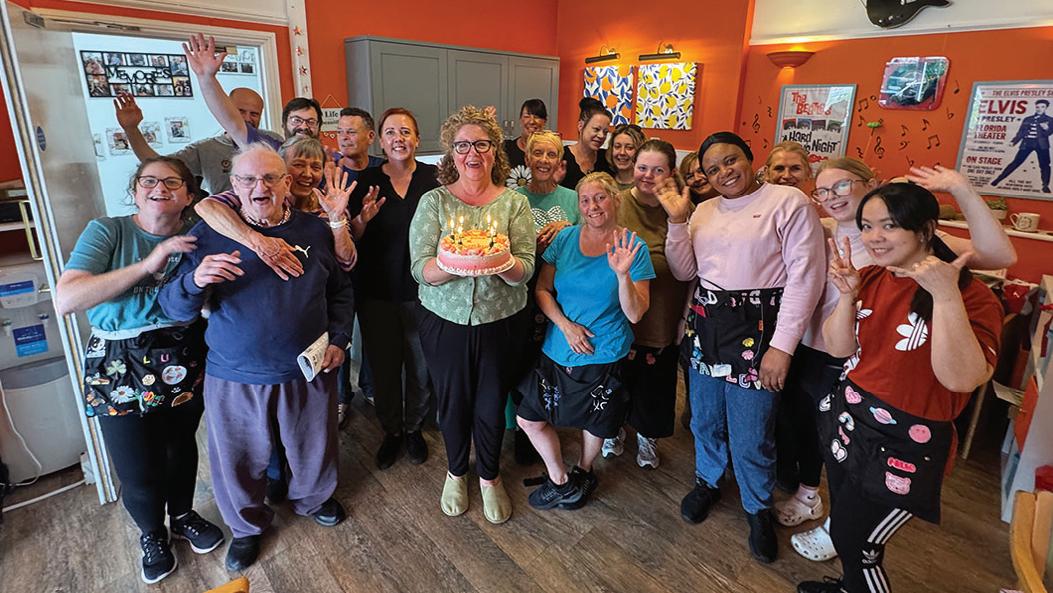
The Butterfly Approach has a meticulous focus on creating a culture where people are ‘free to be me’. It values emotional intelligence and the core belief that everyone has a unique story that has meaning and matters. It also encourages care providers to put the focus back on the people they care for and their emotions, by engaging in the reality of people’s lived experience in the ‘here and now’.
The transformation at West View included splitting the home into two separate living areas – Wren and Robin – where people with early-onset dementia or without dementia live together and people who experience more complex needs or later stage dementia live together. This fundamental change to a small household approach has enabled holistic care to flourish, where emotions-based care is balanced with clinical care best practice.
The home has also been decorated with vibrant colours and murals to bring warmth, with items of interest all around representing each individual and their life story – what Meaningful Care Matters calls the ‘stuff of life’, creating a family atmosphere.
Diane Kehoe, Manager at West View Care Home, said: “As a second-generation family-run business, we always aspire to create a stimulating, engaging and enjoyable environment – and the Butterfly Approach has provided us with the platform to offer that around the clock. I was already familiar with the approach
and saw the potential West View had in achieving it. The transformation was not easy, and we had a few challenges along the way, but the rewards upon completion have made it so worthwhile.
“We believed in the whole process from the outset and the staff embraced it – showing so much patience and kindness. They treat the residents like family, enjoying life together with lots of laughter and fun. When you step into the home now you can really sense the buzz of the place, and the level of care is both phenomenal and heartwarming.”
The overall findings from Meaningful Care Matters during a final audit last month identified the home as “excellent”, offering a highly engaged service that prioritises meaningful moments and where emotion-focused care is consistently seen, felt and heard in interactions with people. It also reported that individuality and self-expression are encouraged within the home, allowing people to freely be themselves.
Peter Bewert, Managing Director of Meaningful Care Matters, said:
“West View has transformed into a truly wonderful home. The team have clearly embraced the desire to change and have achieved amazing results, being guided and supported by Diane. They have also lifted their CQC rating from ‘Requires Improvement’ to ‘Good’ and are aiming over the course of the year to reach ‘Outstanding’. They have also been supported by the local service improvements team, who were so impressed at the transformation that they plan to use West View as a role model for other homes.”
Peter continued: “The journey has been incredible. From what we would call a ‘traditional’ care home, West View has come alive and now has a genuine feeling of family, togetherness, love and purpose for the people living there.”
The home aims to continue elevating its high standard of care, with ambitious plans to be acknowledged and approved by the National Dementia Care Accreditation Scheme. It also plans to achieve the ‘gold standard’ for end-of-life care by the Gold Standards Framework.
For more information on West View Care Home, please visit https://westviewcarehome.co.uk/.
For more information on Meaningful Care Matters and its cultural transformation models, visit https://meaningfulcarematters.com/.
The Care Quality Commission (CQC) has published its annual controlled drugs oversight report for 2024, revealing key challenges facing care homes in managing controlled medications, particularly for end-of-life care.
The report, published on 15 July 2025, examines the CQC’s oversight activity under the Controlled Drugs (Supervision of Management and Use) Regulations 2013 and highlights findings from inspections and engagement with local controlled drug intelligence networks led by NHS England.
Among the primary issues identified in the report, the CQC specifically highlighted difficulties with “access to controlled drugs in care homes for end of life care” as a significant concern. This continues to be a persistent challenge for residential and nursing care providers seeking to ensure appropriate pain management and comfort care for dying residents.
The regulator also emphasised the critical importance of healthcare professionals working within their scope of practice – a particular concern for care homes where staff may not always have clear guidance on controlled drug administration boundaries.
The report identified concerning levels of fraudulent activity and diversion of controlled drugs by health and care professionals, as well as support staff. This included instances of people impersonating healthcare professionals to obtain controlled substances.
Of particular relevance to care settings, the CQC noted fraudulent prescriptions being produced within electronic systems in primary care to conceal theft, alongside ongoing fraud involving private prescriptions for controlled drugs in lower schedules.
NHS primary care services prescribed 74,160,671 controlled drug items in 2024, representing a slight increase of 0.4% compared with 2023. The report noted that overall prescribing levels across different schedules of controlled drugs remained stable.
Notable trends included increases in prescribing volumes of medicines licensed to treat ADHD, such as dexamfetamine, lisdexamfetamine and methylphenidate, and a continued increase in testosterone prescribing.
Conversely, there were reductions in prescribing of several medications commonly used in care settings, including pholcodine, pethidine, fentanyl, diamorphine, zopiclone and zolpidem.
The report highlighted significant growth in non-medical prescribing, with pharmacist prescribing continuing to expand and accounting for over half of all non-medical prescribing. Paramedic prescribing increased dramatically by 704% in 2024 compared with 2023, following legislative changes at the end of 2023 that permitted paramedic independent prescribers to prescribe a range of controlled drugs.
Cannabis-based products for medicinal use (CBPMs), which are Schedule 2 controlled drugs, continue to be prescribed almost exclusively in the independent sector. The most recent data showed a 130% increase in unlicensed CBPM prescribing in independent services between 2022/23 and 2023/24.
The report also flagged impending changes to NHS England and the regional and national controlled drugs oversight function, which may affect how care homes interact with oversight bodies in future.
The CQC noted the ongoing need to improve cross-border prescribing datasets on controlled drugs, which could impact care homes operating across different regions or accepting residents from various areas.
The report included themes identified from a review of Prevention of Future Death Reports, shared to highlight the risks associated with controlled drugs across healthcare settings, including care homes.
The CQC has made recommendations in the report to raise awareness and address the specific issues identified during 2024, with particular attention to ensuring appropriate access to controlled drugs for endof-life care while maintaining robust security and governance arrangements.
Staff and residents at Hilton Park Care Home in Bottisham are celebrating the news that one of the homes much-loved residents, John Waller, and one of their equally loved family members, Beverley Johnson, have been elected Resident Ambassador and Relative Ambassador, respectively.
The roles of Resident and Relative Ambassador are very important roles within a care home and everybody at Hilton Park unanimously agreed that were no other people that they would want to represent them other than John and Bev. John has been a resident at Hilton Park since November 2023 and has thrived in the care home environment, always taking part in the many activities that the home provides and is a well-loved resident. Bev has been coming to Hilton Park since the arrival of her husband, Dennis in November 2023 and can often be seen checking up on the other Hilton Park residents during her visits. Bev also attends
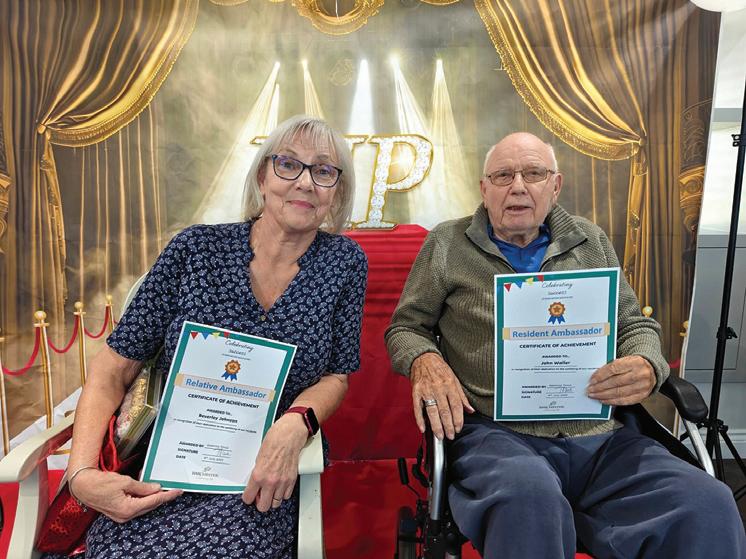
every resident meeting and is a positive voice for all of the other residents and their families.
Geanina Tinca, General Manger at Hilton Park Care Home, said: “We are all incredibly proud of John and Bev. The role of the Resident Ambassador is an important one and they both take it all in their stride. They are both really wonderful ambassadors for Hilton Park and we simply could ask to have two better people to represent the home.”
John said: “I was so touched to be elected Resident Ambassador by my fellow residents and the staff here, it made me quite emotional really that they picked me. I am very proud to represent all of the residents. Hilton Park is such a lovely place to live and I think it says a lot that they have a Resident Ambassador to ensure everyone’s voices are heard.”
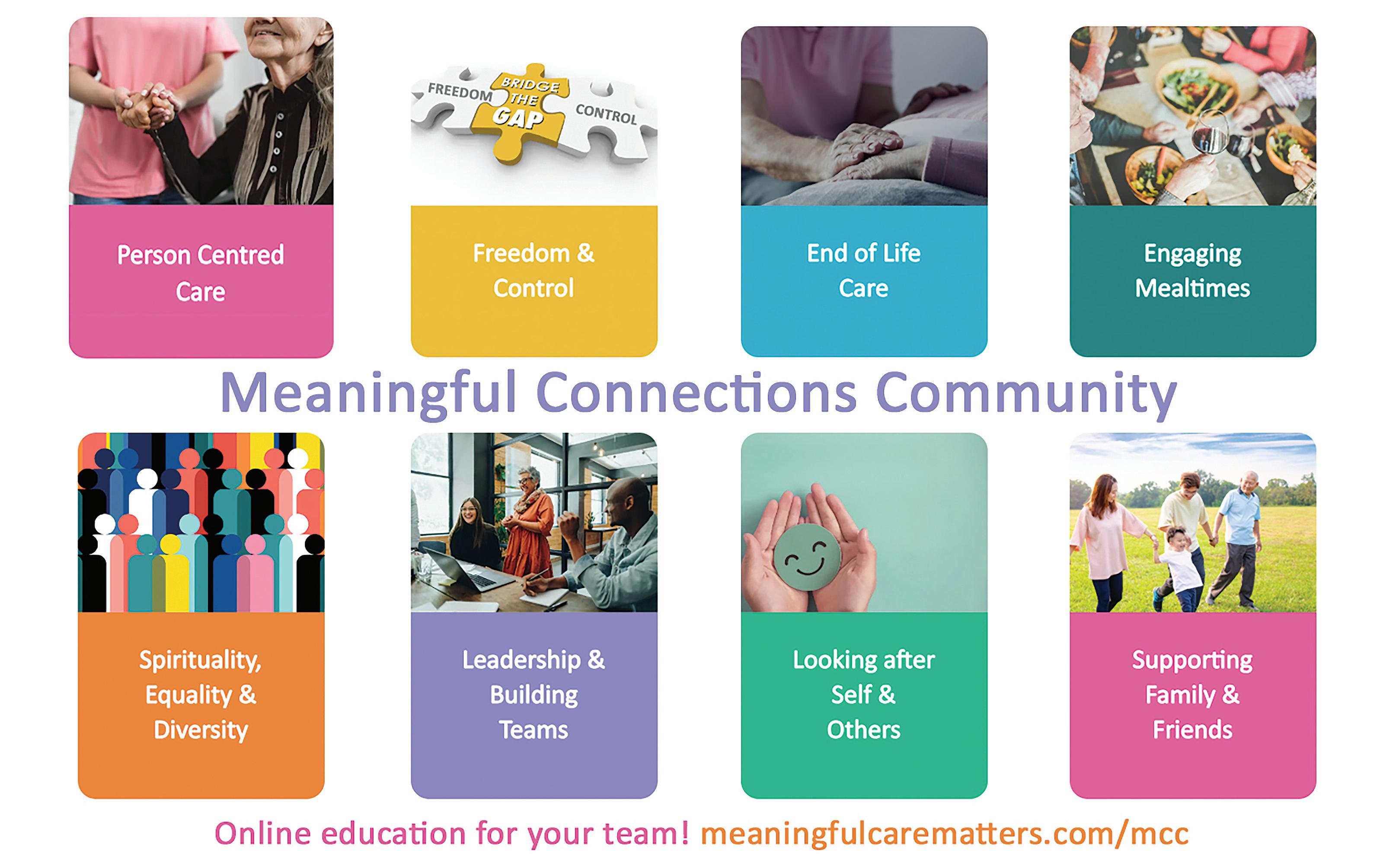
Skills for Care has unveiled a new nursing preceptorship package designed specifically for adult social care providers in England – a key step in delivering on the ambitions of the Workforce Strategy for Adult Social Care.
The Adult Social Care Workforce Strategy identifies tailored support for the “Small but Mighty” workforce of regulated professionals and registered managers who make up 6% of the social care workforce but make a huge impact on quality of care and support.
Funded by the Skills for Care ‘Small but Mighty’ programme, the package supports providers to develop structured preceptorship programmes for newly-registered nurses and nursing associates working in social care where this type of support is not currently widely developed or standardised.

The new package of support aims to address that gap and is designed to help providers improve recruitment and retention by embedding preceptorship programmes confidently and sustainably within their organisations.
Claire Leenhouwers, National Professional Lead – Nursing, Skills for Care, explains: “As we see a shift in focus from hospital-based care towards community care, and prevention over treatment, there are many opportunities for newly-registered nursing staff to build a career outside of the traditional hospital setting.”
“I’m really excited to offer this programme. Preceptorship is a vital step in building an effective and sustainable social care nursing workforce which is why it’s one of the key recommendations in the national Workforce Strategy for Adult Social Care.
Social care nurses and nursing associates play an incredible role in supporting people to live their lives well, and so it’s crucial they are provided with all the tools they need to be confident and effective in their roles.”
The package from Skills for Care includes a series of virtual events, including an introduction to preceptorship, a workshop for preceptors, and a workshop for preceptorship leads who will lead on embedding and championing preceptorship in their organisations.
The introductory session, delivered in partnership with the Nursing and Midwifery Council, will run on 3
September 2025, with the other workshops taking place on dates through September, October and November.
Preceptorship leads will also be invited to join a bi-monthly community of practice to network, receive peer support and ongoing guidance on how to continue to embed and monitor the quality of their preceptorship programme.
Marisa Spice, Head of Learning and Development, Nellsar Care Homes says: The Skills for Care offer around preceptorship will make all the difference. Easily accessible, reliable and relevant resources, guidance, and opportunities to attend free events which are not too long. Also, a great platform to network, find out more and feel safe in the familiarity of social care.
Donna O’Boyle, Acting Executive Director of Professional Practice at the Nursing and Midwifery Council (NMC), says: “Nurses and nursing associates working in adult social care are a lifeline for people and communities across the UK. Social care nursing offers a uniquely rewarding career path. That’s why preceptorship is so vital; it lays the foundation for confidence, connection, and professional growth from the beginning.”
“Preceptorship offers newly-registered professionals the structured support they need to build confidence, apply the Code in everyday practice, and feel a part of the team from the very start. At the NMC, our Principles of Preceptorship define what effective preceptorship looks like across all health and social care settings, helping to ensure a consistently high standard of support.”
“We welcome Skills for Care’s tailored package for social care providers. Helping employers embed consistent, high-quality preceptorship will not only support those new to the register – it will also strengthen retention, grow leadership, and help ensure people receive the safe and effective care they deserve.”
Sarah Gilbert, Head of Workforce Strategy Implementation Unit, Skills for Care, adds: “It’s great to be launching this new package of support during the one-year anniversary of The Workforce Strategy for Adult Social Care. The strategy is all about working together and I’m delighted we can use some of the Small but Mighty funding, to join with others from across the sector, on something which promotes safe, confident practice and fosters that strong sense of belonging in social care.”
Priory, the UK’s largest independent provider of mental health, addiction and workingage adult social care services, has reported significant progress in clinical outcomes, safety, co-production and staff engagement across its national network of services.
The organisation, which cares for more than 26,000 people a year across 280 sites, has published a range of findings in its latest quality account (2024–25), with results strongly aligning with ambitions outlined in the government’s Fit for the Future: the 10-Year Health Plan for England published earlier this month.
In its healthcare division, 83% of services were rated ‘Good’ or better by independent regulators (now at 84.4%), which is above the sector average for equivalent services.
More than half of patients in acute and specialist settings now have paired patient and clinician-reported outcome data which show measurable improvement in mental health conditions including anxiety, depression and psychosis.
Paired outcomes record how someone is feeling and functioning when they begin their treatment and again when they leave - with some information collected directly from the person themselves (called PROMs) and some recorded by clinicians (CROMs).
Mechanical restraint – which is the use of devices to restrict movement as a last resort to stop a person in crisis harming themselves or others – was eliminated in the final quarter of the year due to effective early intervention and de-escalation.

Additionally, average seclusion durations – where a patient is temporarily separated from others for their own safety and the safety of others – fell by more than 80% thanks to the same interventions and further action to reduce trauma.
In Priory’s adult care division, 89% of services were rated ‘good’ or better, with 90% of residents reporting satisfaction with staff support. Priory has also embedded Outcomes Star, a tool to enable residents to set and track personalised goals around wellbeing, independence and inclusion, across supported living
and residential care.
Investments in assistive technology – such as seizure monitors, doors sensors and alarms and falls detection – is enhancing both safety and dignity, along with better emergency preparedness.
The organisation has also made co-production – working alongside current and former patients and residents – central to its governance processes, with 17 Lived Experience Partners now contributing to service design, peer reviews, training and national working groups.
This supports a culture of accountability and inclusion, in line with the 10-Year Health Plan’s commitment to embedding the service user voice.
Workforce improvements have also continued, with staff turnover down by 45% since 2022 and staff engagement scores reaching a record 78% – a 20-point increase in just three years. In healthcare, 98% of colleagues reported feeling confident speaking up through the organisation’s Freedom to Speak Up programme.
Colin Quick, Chief Quality Officer at Priory, said: “We have seen significant progress across several areas in both healthcare and adult care over the past year, demonstrating what is possible when compassionate care is backed by strong values, data, lived experience and a stable workforce.
“Priory is proud to support national efforts to create a more preventative, personled and digitally connected health and care system and these results highlight how our work is already aligning with the ambitions of the 10-Year Health Plan – and is delivering for patients and residents.” In line with the 10-Year Health Plan’s system-wide approach, Priory continues to invest in NHS-commissioned capacity, digital infrastructure, trauma-informed care and affordable addiction treatment – offering joined-up, high-impact support across communities.
Social care collaboration and use of an “outside the box” approach to recycling of community equipment means daily life is now safe for teenager Rhianna Maness. The 17 year-old has complex disabilities, including seizures and being non-verbal. Her parents Melissa and Darren themselves have health issues.
Getting Rhianna up and down stairs was becoming a risk, but the conventional solutions- a stairlift or through-floor lift- were not viable.
Rhianna’s Occupational Therapist at Calderdale and Huddersfield NHS Trust found out about AAT’s Sella stairclimber, and reached out for assessment support. It worked!
A Sella was available at Medequip’s stores for Kirklees’ Council, as were some of the accessories needed to ensure Rhianna was sat secure and properly supported as she needed. As a result, using the re-issue capability of the stairclimber, Rhianna’s carers can now transfer her up and down the stairs without risk to her or themselves. Should Rhianna have a seizure en route, the stairclimbing process can be safely paused for as long as required.
“It’s been a real life saver,” says Melissa. “Rhianna’s face shows that she enjoys it, and it’s made the world of difference to us all.
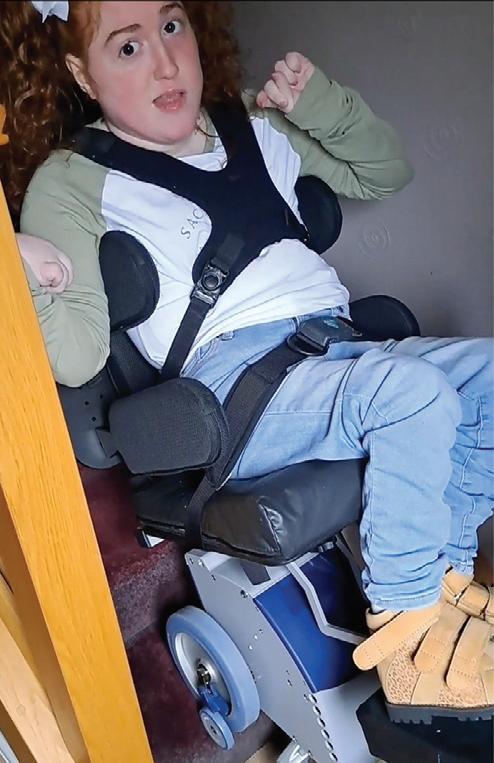
“It was a bit scarey to start with at the top of the stairs, but AAT trained us fully in how to use the stairclimber safely. If Rhianna has a seizure, we just stop until it’s passed and we can resume.”
Adds Gareth Brown of AAT, “Rhianna requires significant support to sit. We had most of the accessories she needed in stores @ Kirklees, so there was only need to purchase a couple of small additions. Her access to all levels of the family home has been made safe, including assessment, equipment and training, for around £1000- a fraction of the cost of other solutions, had they been viable.”
AAT’s re-issue facility for stairclimbers is unique within the sector. It means that- where appropriate- necessary, reasonable and practical changes can be made to make stairs safe for someone with reduced mobility, for <£1000/ £650 pa(1). There are no structural alterations nor permanent restriction of the stairs for other members of the household.

A groundbreaking new report has highlighted the urgent need for a fundamental shift in how society supports people living with dementia, emphasising connection, community, and personalised care as essential foundations for wellbeing.
The report, titled ‘I just want to be able to dance,’ presents a compelling vision for dementia care that moves beyond medical models to focus on what truly matters to those affected by the condition. Drawing from extensive consultation with people living with dementia, their families, carers, academics, and healthcare professionals, the research offers both hope and practical guidance for transforming care approaches across the UK.
Between September and December 2024, researchers conducted comprehensive conversations with 67 people living with dementia and their family and friend carers across London, the South East, Yorkshire, and Lancashire. The study employed various engagement methods, including group discussions, one-to-one interviews, and paired conversations, ensuring diverse perspectives were captured.

The research team also consulted with professionals from the NHS, academic institutions, and local voluntary organisations to gain a comprehensive understanding of current challenges and opportunities within the care sector.
The report reveals that people living with dementia consistently identify several crucial elements that significantly impact their quality of life. Participants emphasised the importance of maintaining a life beyond their diagnosis, feeling recognised and valued within their communities, and having opportunities to contribute meaningfully to society.
Connection emerged as a central theme, with many highlighting how staying engaged with others and avoiding isolation were fundamental to their wellbeing. The research also identified the damaging impact of negative attitudes and stigma, which can compound the challenges faced by those living with dementia.
Family and friend carers expressed clear needs for better guidance and support, as well as respite opportunities to sustain their caring roles effectively. The report notes that while these factors are recognised as essential, their availability and consistency vary significantly across different regions.
The report outlines nine specific recommendations designed to improve the lives of people living with dementia which include:
Enhanced Community Support: Expanding community-based initiatives that provide opportunities for people living with dementia to remain connected and active within their local areas.
Comprehensive Care Pathways: Investing in early intervention and ongoing support services that span from initial diagnosis through end-of-life care, ensuring continuity and quality throughout the care journey.
Stigma Reduction: Implementing targeted campaigns and education programmes to challenge harmful stereotypes and promote understanding of dementia within communities.
Improved Accessibility: Enhancing housing, public spaces, and services to become more dementia-friendly, enabling greater independence and participation in community life.
Technology Integration: Leveraging technological innovations to provide better support tools and resources for both people living with dementia and their carers.
The remaining recommendations focus on workforce development, policy reform, research advancement, and sustainable funding models to support these initiatives.
The report’s title, drawn from a participant’s simple yet profound statement, encapsulates the core message that people with dementia retain their fundamental humanity, aspirations, and rights. This perspective challenges traditional approaches that may inadvertently diminish the personhood of those living with the condition.
Neil Crowther, co-author of the report, emphasised that while medical cures for dementia remain elusive, there are numerous ways to address the loss of connection, purpose, and identity that many people with dementia experience. He highlighted existing examples of place-based social innovation and community development that are already making a difference across the country.”
“Our report focuses on the place-based social innovation and community development that is already helping people and families across the country to live each day as best they can,” Crowther explained. “We put forward some ideas for how these could inspire and inform action everywhere.”
The findings have significant implications for residential and nursing care providers. The report suggests that successful dementia care requires moving beyond task-focused approaches to embrace models that prioritise individual preferences, maintain connections with the wider community, and support continued engagement in meaningful activities.
For care homes, this translates to creating environments that feel less institutional and more communityoriented, where residents can maintain their sense of identity and purpose. The research indicates that such approaches not only benefit residents but also provide satisfaction for staff and families.
The report represents a call to action for policymakers, care providers, community organisations, and society as a whole to collaborate in creating more inclusive and supportive environments for people living with dementia. By focusing on what people themselves identify as important – connection, purpose, dignity, and the freedom to live life their way – the care sector can work towards a future where dementia does not automatically mean isolation or diminished quality of life.
Residents at an Ilkley home can visit places such as Scotland and the North York Moors without leaving their home thanks to a new train experience.
MHA Glen Rosa have installed the Jolly Journey Train Experience, a new initiative by Little Islands, who specialise in creating unique interactive environments.
The train experience showcases journeys across the UK from the viewpoint of a passenger looking out of the window.
The team from Little Islands installed and decorated a part of the home’s dementia unit and converted it into a train carriage with props such as suitcases, train times and journey information displays.
MHA Glen Rosa provides residential and residential dementia care for 47 residents.
Adam Carling, home manager said: “The Jolly Journey Train experience is a new initiative and one that is proving to be very popular here.
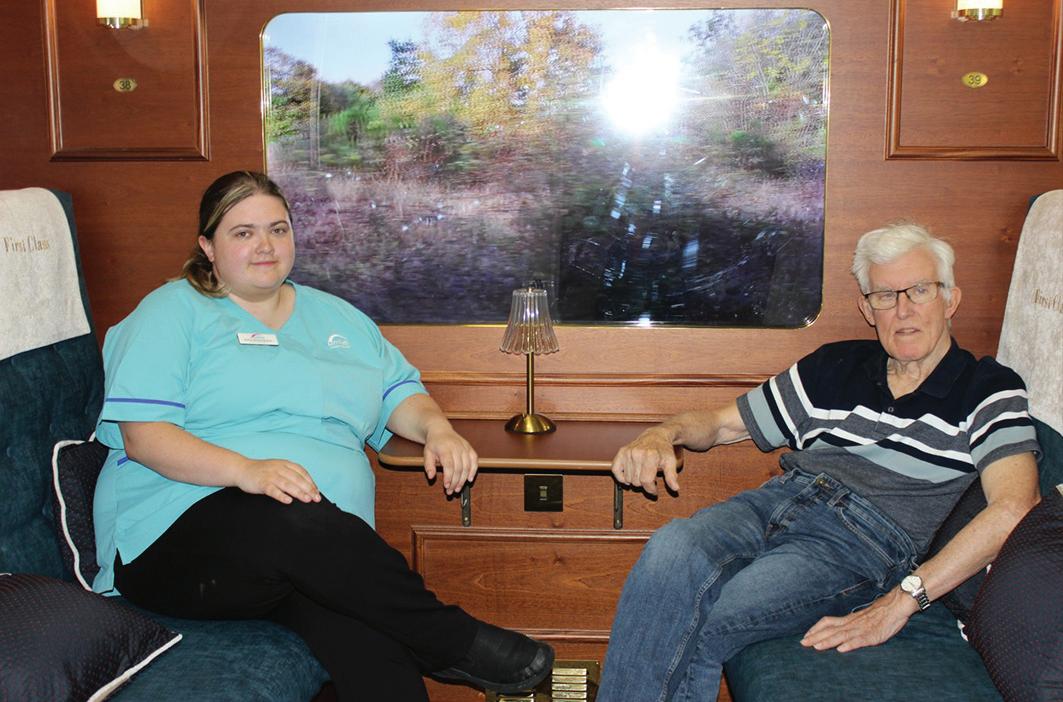
“We have received some great feedback since the experience has been installed.
“Ou residents love it, you will often see a number of them sat in the carriage and watching a journey.
“The idea came to me from my area who forwarded it to me, and I decided to look into it.
“I then contacted the team at Little Islands and the whole process took a couple of months from start to finish.
“We are quite privileged here at MHA Glen Rosa, where thanks to the generosity of the local community we are able to provide services such as this for our residents.
“We received a very generous donation via our Legacy Fund which enabled us to go for this experience.
“The location of the experience is really good as it’s in a high footfall area, where both residents and their relatives can sit and enjoy it.
“Alongside the Train Experience, we have also prepared a sensory garden thanks to funds we received.
“I do think this is something other MHA homes can look into having, it’s something quite unique and I do feel other homes will see the benefits just like we have.”
In care environments where hygiene and safety are paramount, Jangro’s Professional Nitrile disposable gloves (DG130) offer a dependable solution, meeting the rigorous demands of daily care tasks. Designed with caregivers in mind, these gloves provide a comfortable fit without compromising on protection.
Made from high-quality nitrile, these gloves are both powder and latex-free, making them an ideal choice for individuals with latex sensitivities. Nitrile technology provides an exceptionally soft and pliable material that conforms naturally to the shape of the hand. This flexibility reduces hand fatigue during prolonged use and extended wear, allowing caregivers to perform tasks with comfort and ease. Textured fingertips enhance grip, even when wet, ensuring precision during delicate procedures. Whether assisting with personal care, handling food, or performing cleaning duties, these gloves support a wide range of applications within care settings.
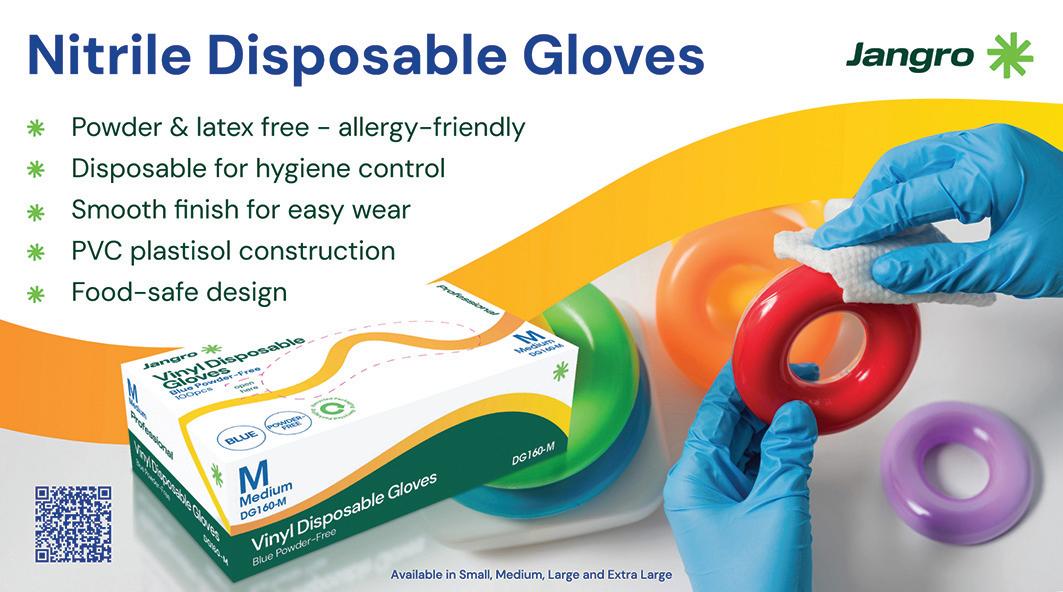
They’re more than just protective, these gloves are fully compliant with EN455 standards for medical use and EN ISO 374-5 for protection against bacteria, fungi and viruses, underscoring their suitability for infec-
visit Jangro’s official website. www.jangro.net
tion control protocols. They also comply with the Medical Devices Regulation (EU) 2017/745 Class I and are manufactured in accordance with the Personal Protective Equipment Regulation (EU) 2016/425. Plus, they’ve been tested for food safety compliance under Commission Regulation (EU) No 10/2011, meaning these gloves are as versatile as they are protective.
The design features, including ambidextrous fitting and ridged cuffs for easy removal and their vibrant blue colour to aid visibility, have been carefully considered to streamline workflow for busy care professionals.
At Jangro, we understand that the right protective equipment isn’t just about meeting standards, it’s about supporting the people who care for others every day. That is why our nitrile gloves are manufactured under stringent quality controls to meet the demands of healthcare environments, providing peace of mind for both staff and residents.
For more information or to view the full range of disposable gloves
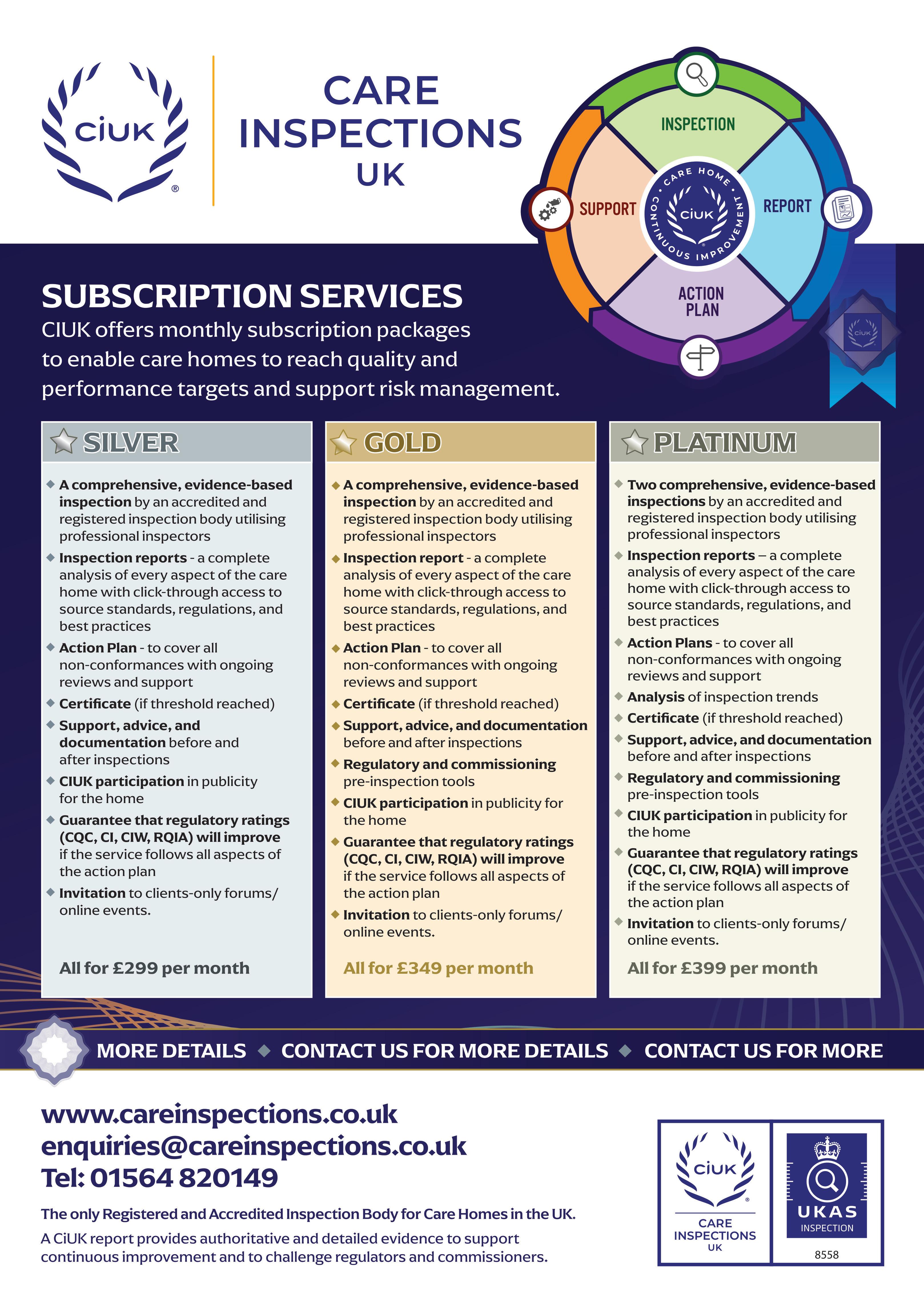
By Becky Mundie, RotaCloud (https://rotacloud.com)

How much time do you spend on admin?
How long are you locked away in your office to make the rota, only having to go back again and again for amends? How often have you realised you’re understaffed, resulting in overspending on agency staff? How frequently do payroll errors, messy audit trails, and chasing staff who missed a shift update occur?
It’s constant, the stress of it all. It’s enough to carry the care of your service users on your shoulders without being overwhelmed every day by repetitive admin and errors. You never thought you’d be spending more time amending schedules, chasing for cover, and correcting issues than your actual job.
But those inefficiencies — staff shortages, payroll errors, missed shift updates, and multiple spreadsheets you juggle — cost you money, time, staff retention, and, in some cases, compliance.
It’s easy to suggest investing in budgeting tools or certain tech to help you understand spending before it happens and to automate certain processes. Budgets are tight in care, after all. But there are simple fixes to cut your operating costs without cutting back on care if you can’t yet turn to digital systems. Cutting costs doesn’t just mean spending less. It’s about making smarter decisions – reacting to and fixing the cause of the problem, not the effect. And it all starts with your rota.
There are ways to take better care of your rota, which will, in turn, improve efficiency and staff morale. One main way: putting your staff first.
First, give your team more say in when they work by allowing them to submit their availability. Try making a rolling rota with a mix of most and least preferred shifts so everyone gets a fair share of them. It means far less admin for you when the rota repeats, far fewer last-minute amends, a more accurate payroll, an easier audit trail, and no more miscommunications on when everyone’s working.
Second. Share rotas at least two weeks in advance. Doing so allows enough time to make amends and for everyone affected to be updated. Sticking to this process is more efficient, which means less admin – which means more time to focus on service users.
Third Put in a more seamless process for holiday requests. Whether a submitted form or limiting to one means of messaging, sticking to one process means fewer lost or forgotten requests and much less paperwork. Plus, allow staff to arrange shift swaps themselves, leaving managers to simply approve or deny. Again, less time on admin means more time for service users.
All in all, your saviour is flexibility. Flexibility in rotas means less admin for managers, more efficient teams and safe staffing levels, happier staff (and higher retention rates), and, in return, happier service users – all saving costs in the process. After all, when you aren’t making last-minute changes or relying on agency staff to cover no-shows, you stick to the staffing levels and labour budgets you’ve forecast. So long, overspending, lost time, and inefficient processes.
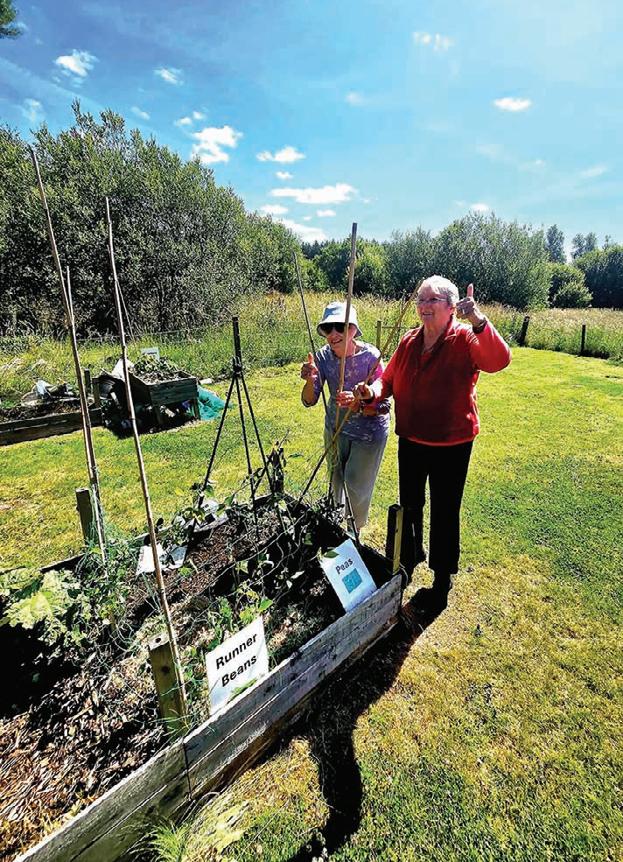
There’s something special growing at HC-One Scotland’s Redmill Care Home in East Whitburn, West Lothian, and it’s more than just vegetables.
With the help of dedicated care colleagues and enthusiastic residents, the home has transformed an unused outdoor space into a bustling vegetable garden, brimming with life, colour, and community spirit.
The project was spearheaded by caring team member
Louise Royneecurnow, a Senior Care Assistant at Redmill Care Home, who took it upon herself to begin building the garden during her own time, spending days off laying the groundwork, sourcing materials, and planting the first crops.
Louise’s passion quickly became infectious, sparking interest among residents and fellow colleagues alike.
Soon, what began as a solo effort blossomed into a wholehome initiative, with residents of all abilities and backgrounds getting involved, digging, planting, watering, and nurturing a wide range of produce including strawberries, courgettes, peas, tomatoes, lettuce, cucumbers, broccoli, runner beans, spinach, and herbs.
Residents have not only contributed physically to the garden but have shared their own gardening knowledge and stories from years gone by. Many recalled growing their own fruit and vegetables during wartime rationing or raising families, and
the project has become a deeply meaningful way to reconnect with those memories and skills.
Joanne Cunningham, Home Manager at HC-One Scotland’s Redmill Care Home, said: “The garden has brought so much more than fresh produce.
It’s provided an opportunity for residents to reconnect with nature, reminisce about their past, and work together toward a shared goal. Louise’s generosity and leadership ignited something truly wonderful here, and the pride our residents feel is heartwarming to see.”
Beyond its nostalgic charm, the garden has become a powerful therapeutic tool. Engaging with the outdoors and taking part in gardening has supported residents’ mental wellbeing, physical activity, and sensory stimulation, particularly for those living with dementia. From the smell of fresh herbs to the feel of soil and the vibrant colours of ripening produce, every sense is gently awakened.
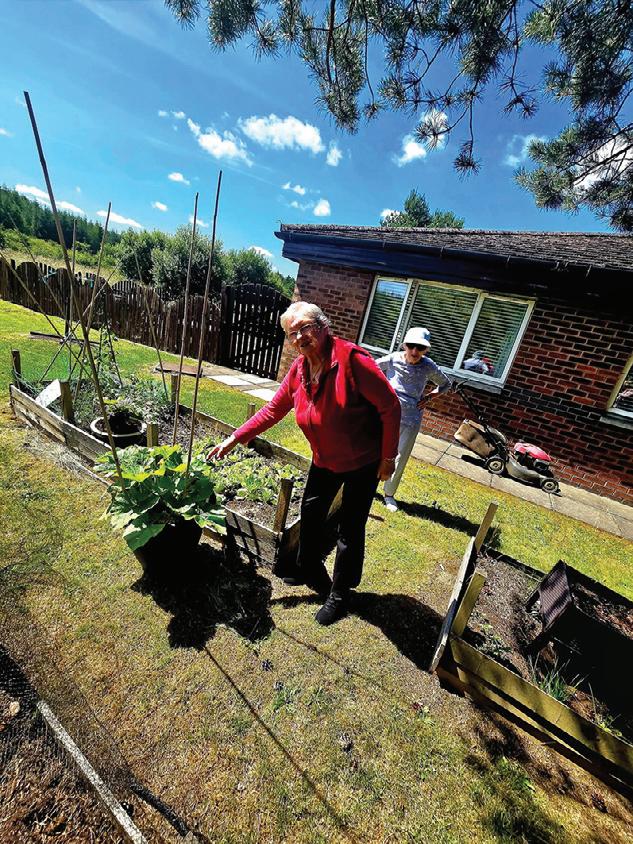
Louise Royneecurnow, a Senior Care Assistant at HC-One Scotland’s Redmill Care Home, added: “I’m so proud of what we’ve achieved as a team. I originally just wanted to create something nice for the residents to enjoy but now it’s something we all take care of together. It’s become a real talking point, and seeing the residents light up when they’re outside makes every bit of effort worth it.”
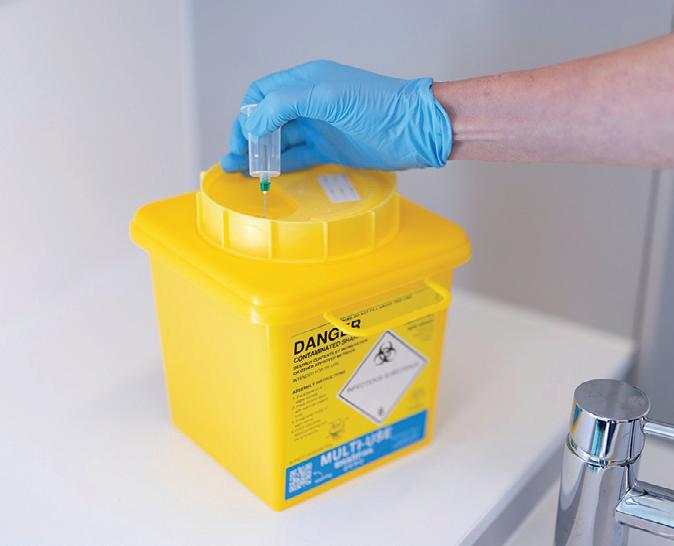
Sanaway, a leading clinical waste, sharps, and washroom hygiene service provider, has introduced new reusable and recyclable sharps containers as part of its auditable ‘Zero Waste to Landfill’ service commitment.
The initiative is part of Sanaway’s ongoing focus to reduce environmental impact for both the company, and its nursing and residential care home customers.
The new reusable recyclable sharps container enables one container to be reused 10 times before being recycled into new reusable sharps containers. The container’s VisiLOCK system optimises safety by eliminating the risk of content spills that may lead to cross-contamination or accidental needlestick injury.
The family-owned business operates across the South of England, servicing customers that demand a reliable, personal and high standard of service at a competitive price.
Co-founder and director, Patrick Martin says: “We are exceptionally proud of our environmental philosophy and commitment, which has been at the core of the company since day one.
“Providing the new reusable sharps service is now standard for all our customers, and at no extra cost. This not only demonstrates our dedication to help minimise the impact our industry has on the environment, but can also help customers achieve up to an 87% carbon saving. This being in line with the NHS’s targets for a 50% reduction in emissions by 2026.”
REDUCE, REUSE AND RECYCLE
Each sharps container has a VisiLOCK closing mechanism to ensure optimum user safety. Once full:
• The containers are collected by Sanaway delivered to the processing facility.
• A robot opens and photographs the contents before:
o Sharps are incinerated.
o Containers are sanitised and recovered.
• The sharps containers are thoroughly checked before being returned for reuse.
• Containers are tracked using barcode scanning to monitor their usage cycles, after 10 uses, the container is granulated and remanufactured into a new sharps container.
• This process is repeated 10 times, meaning the original plastic is reused 100 times.
• After completing 10 full cycles, the plastic is granulated again and repurposed into non-medical products, such as road traffic cones.
Sanaway’s Zero Waste to Landfill philosophy is a market leading standard, based on Energy from Waste (EFW) technology, which means it is a sustainable solution for both waste management and energy production. 99.995% of the process is recyclable and all the recyclable elements are removed before the incineration process leaving only 0.005% nonrecyclable.
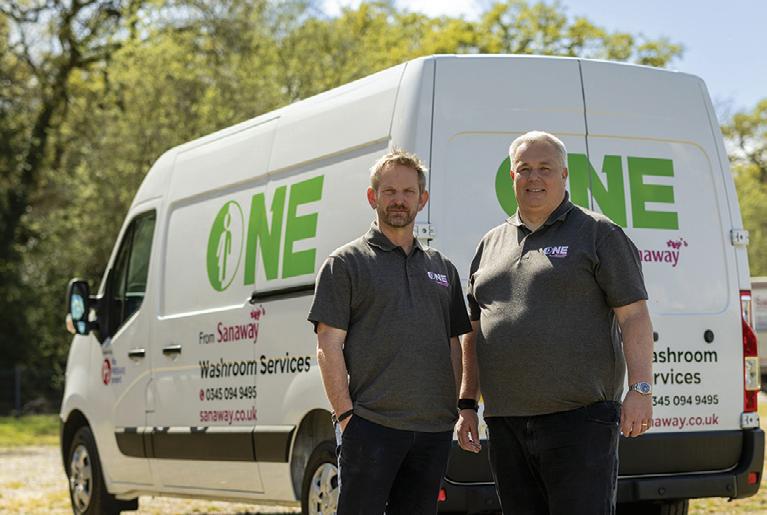
The company’s auditable Zero Waste to Landfill service diverts all of the 50 plus tonnes of waste the company collects from its customers every year from landfill, and contributes towards the power supply for more than 50,000 homes. The company’s ISO 9001 accreditation also gives the added peace of mind from a day to day management perspective, providing a benefit for nursing and residential care homes with ISO 14001 certification, enabling them to fulfil their continuous improvement requirements.
Commenting on the new service, Martin concludes: “We believe considered improvements like these to our customer first, high service standards are the main reason many of our clients have been with us for so many years, contributing to our enviable 95% customer retention rate and year on year growth.”

The UK care sector is grappling with its most challenging period in recent memory, according to the latest OakNorth Care Sector Tracker, with mounting financial pressures, severe workforce shortages, and regulatory hurdles creating a perfect storm for providers across the country.
The sector’s staffing crisis has reached alarming proportions, with over 131,000 vacancies – triple the UK average – now plaguing care providers. The situation has been exacerbated by the Government’s announcement in May that care workers will no longer be recruited from overseas as part of a crackdown on visas for lower-skilled workers.
The impact has been immediate and severe. An 81% drop in overseas care worker visas, coupled with the closure of the care worker visa route, has left providers scrambling to fill essential roles. The Department of Health & Social Care’s April 2025 workforce survey painted a stark picture: 71% of adult social care providers now find recruitment challenging, with 37% expressing serious concerns about sustaining service levels over the next six months.
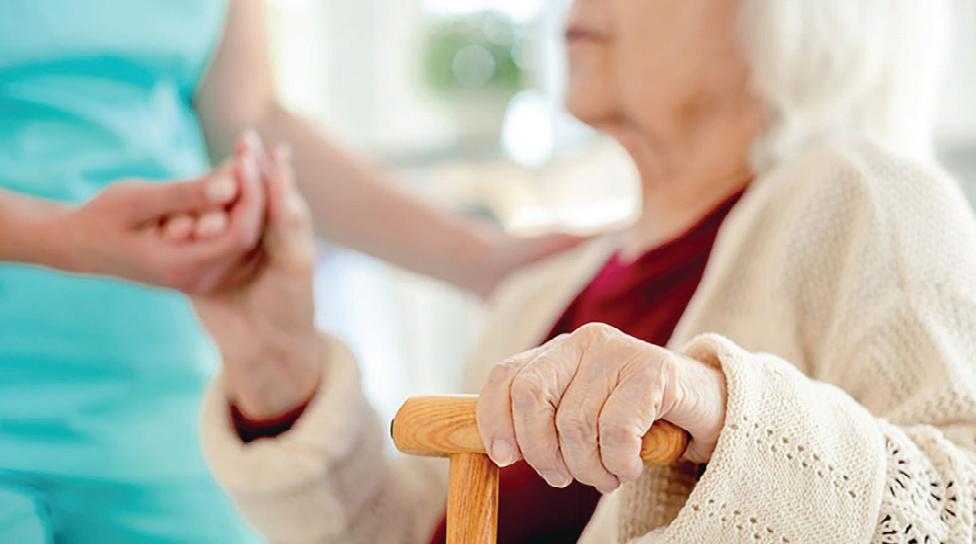
“Better pay in other sectors was cited as a primary factor affecting both recruitment and retention,” the report notes, highlighting the sector’s struggle to compete with other industries for staff.
FINANCIAL PRESSURES MOUNT
Care providers are facing an unprecedented squeeze on their finances. April’s changes to employment costs have hit particularly hard, with a 6.7% increase in the National Living Wage, employer National Insurance contributions rising from 13.8% to 15%, and the earnings threshold lowering to £5,000 – all taking effect simultaneously.
These staffing cost increases, combined with soaring utility bills and commercial water rate hikes of up to 50%, have disproportionately impacted smaller providers already operating on razor-thin margins. Care England estimates a staggering £2.2 billion shortfall for residential care, underscoring the scale of underfunding facing the sector.
Despite local authority and NHS funding uplifts of 6.1-7.4%, these increases remain insufficient to bridge the widening financial gap, leaving many providers in precarious positions.
MARKET CONSOLIDATION ACCELERATES
The challenging operating environment has created a stark divide between well-capitalised operators and struggling smaller providers. Alarmingly, 39% of providers are reportedly considering exiting the market, with past closures already displacing 20,000 residents.
However, the sector’s long-term prospects continue to attract significant investment interest. Major M&A activity in May included CareTrust REIT’s £448 million acquisition of Care REIT plc and Omega Healthcare’s £260 million purchase of 45 care homes, demonstrating continued confidence from institutional investors. US investors have been particularly active, accounting for over 68% of the £531 million invested in the UK
elderly care market during the first quarter of 2025. This international interest reflects growing confidence in the sector’s fundamentals, despite current operational challenges.
DEVELOPMENT PIPELINE UNDER PRESSURE
New care home development has slowed dramatically, with planning approvals at a 45-year low. New regulatory requirements, including mandatory sprinklers and enhanced energy efficiency standards, combined with severe planning delays and high construction costs, have created significant barriers to expansion.
This development bottleneck comes at a critical time, with delayed hospital discharges and rising dementia cases driving strong underlying demand. Occupancy rates remain robust at above 88%, with average fees rising nearly 10% year-on-year.
The approaching 2027 energy performance deadline presents another major challenge. Around 70% of care homes will require retrofitting to meet the EPC B target by 2030. While rising energy costs are accelerating the push for efficiency improvements, capital constraints – particularly among smaller providers – may limit their ability to invest in necessary upgrades.
Despite the challenges, Ben Barbanel, Head of Debt Finance at OakNorth, sees potential for positive transformation: “These challenges are driving much-needed innovation and consolidation across the market. We’re seeing well-capitalised operators adapt by modernising facilities, embracing sustainability, and enhancing care quality to remain competitive.”
The report highlights several factors supporting cautious optimism for the sector’s future: Strong Underlying Demand: An ageing population and high occupancy levels continue to drive fundamental demand for care services.
Potential Policy Relief: The next six months may bring clarity on planning and regulatory reforms under the Levelling-Up and Regeneration Act, potentially easing development bottlenecks.
Pension Reform Impact: The Government’s planned consolidation of pension schemes into £25 billion “megafunds” could improve retirees’ financial flexibility, potentially expanding the customer base for premium care services while attracting long-term investment into the sector.
The report suggests the next six months will be pivotal for the sector. While the recent rise in inflation to 3.5% may slow Bank of England rate cuts, investors remain cautiously optimistic about long-term prospects. “Operators that can demonstrate resilient trade performance, regulatory compliance, and a clear growth strategy are well-positioned to thrive,” Barbanel concludes. “With strategic investment, policy reform, and smarter delivery models, we believe the sector can emerge stronger, more efficient, and better equipped to meet the needs of future generations.”
In a heartwarming display of intergenerational engagement, eightyear-old Spencer Whittenham from Burton has embarked on a unique mission: teaching older residents the joys of modern gaming.
This initiative highlights the benefits of activities between young and older people, and the crucial importance of keeping them connected in an increasingly digital world.
Spencer, a keen gamer himself and owner of global YouTube channel Spencer Arcade, noticed a gap in digital literacy and social interaction among some older members of his community and inspired to make a difference, he began volunteering his time at local community centres and care homes, offering personalised gaming lessons to seniors eager to learn.
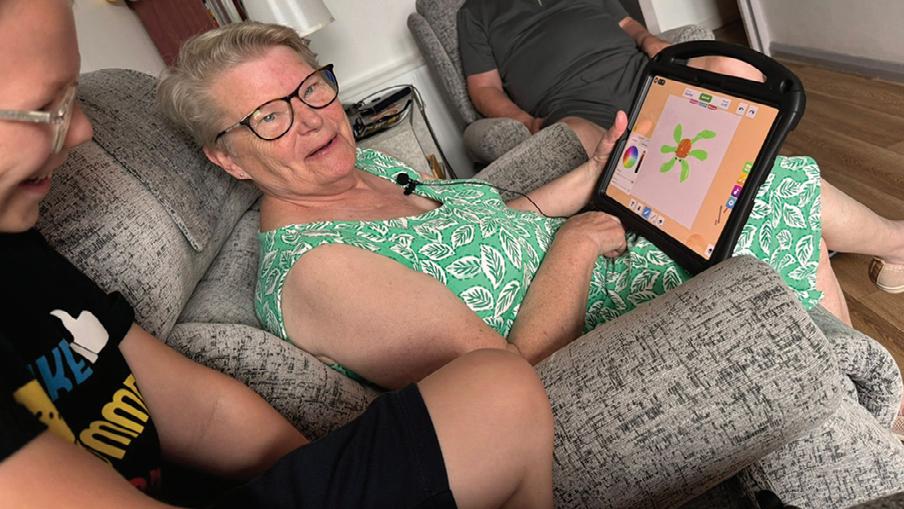
From navigating virtual worlds in Roblox to mastering simple puzzles, Spencer patiently guides his new friends through the digital landscape, fostering a sense of achieve-
ment and fun.
"It's really cool to see them laugh and get excited when they win a level," says Spencer. "Gaming isn't just for kids, it's for everyone and it's fun to teach."
The initiative has quickly gained traction, with participants reporting not only improved digital confidence but also a significant boost in mood and social interaction.
"I never thought I'd be playing video games at my age, but Spencer makes it easy and enjoyable," commented Ireene Bower, 78, a participant at Carlton Court retirement village in Burton. "It's wonderful to connect with the younger generation and learn something new. It really brightens my day."
"The importance of keeping older people is so important," said Spencer’s dad Jason. "Isolation can have serious impacts on health and happiness and I’m really proud that Spencer's own initiative is a brilliant example of how simple, creative ideas can make a huge difference in fostering vital connections.”
MHA Handsworth welcomed 16 members of staff from AstraZeneca who spent a day
The team spent time playing various games with residents as well as making some hanging baskets.
The day was arranged with the help and guidance of Employee Volunteering CIC, a not-for-profit organisation which creates employee volunteering programmes.
MHA Handsworth provides residential care for 43 residents. Charlotte Fowke, activities coordinator for the home said: “The residents had a great time with the team from AstraZeneca. “Having the opportunity to speak with different people is something

they don’t get to experience too often so it was a nice experience for them.
“The visitors were great, they really got involved and spent plenty of time sitting and talking to residents.
“We were told by the visitors as they are all from different parts of the country it was nice for them to get together.
“The residents really enjoyed the activities, especially playing bingo with the visitors.
“We received some lovely feedback from our residents which we shared with our visitors.
“This is something we would definitely like to do again at MHA Handsworth.”
The Care and Support Alliance recently hosted a drop-in reception for MPs in Parliament called Show Us You Care.
Policy experts from some of the Alliance’s 60 member organisations, as well as a range of older and disabled people with experience of drawing on care, plus their unpaid carers and care professionals met with MPs to discuss the current state of social care. They discussed the transformative impact good, reliable care can have, and the issues many people face trying to get the care they need. The Care and Support Alliance also encouraged MPs to engage with the independent commission on social care, and to keep the pressure on Government to support the 3.5 million people unable to get the support they need right now.
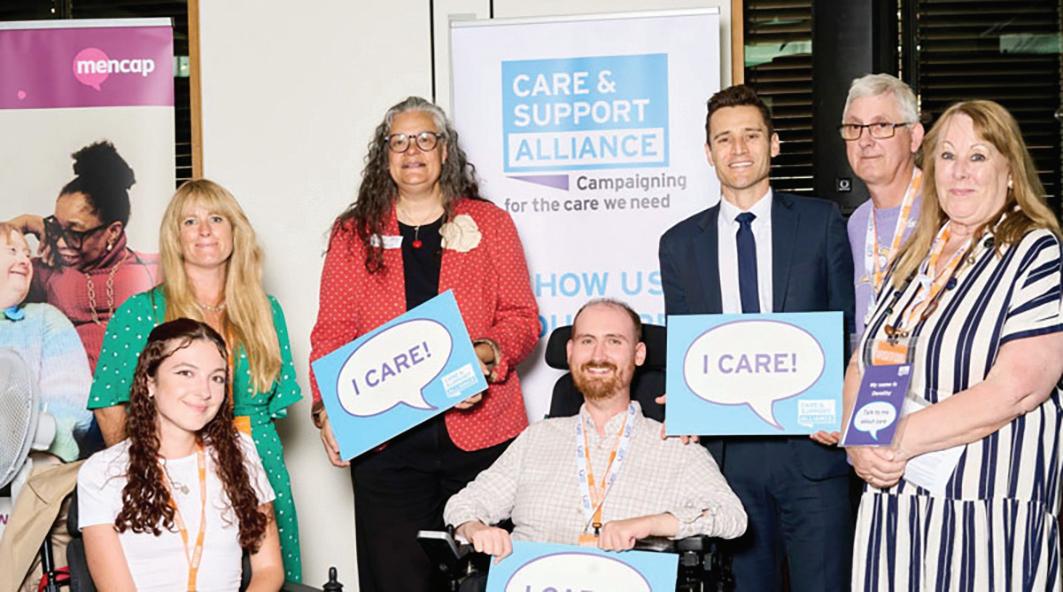
Anna Dixon MP, who hosted the event, said: “We must build political consensus on social care, and raise public awareness of how important care and support is. People who draw on and provide care are too often invisible. We have to change that and celebrate the value of care and support.”
Jack, who receives social care, said: “The less care I get, the less independent I am. There’s a real lack of aspiration for what a good life is for someone with a disability. We need a well-funded, needs-led care system that moves from enabling mere survival to fulfilling lives.”
Emily Holzhausen, Care and Support Alliance Co-Chair, said: “MPs –your voice really matters to us. We want you to hold decision makers to account and work with us to secure a better future for all of us. Investing in care is investing in all of us”
Wondering if your MP was there? Here’s a list of those who joined the Show Us You Care event, or who sent a member of their team on their behalf.
Anna Dixon, Ben Maguire, Ben
Bernard

Care for Veterans has held its annual Summer Fayre, welcoming many visitors from the local community.
Around 600 people attended the family-friendly event at the Home in Worthing on Saturday July 12, helping to raise £5,700 for the charity.
Those attending on a sun-kissed day enjoyed plenty of live music, food and drinks, martial arts demonstrations, arts and crafts stalls and traditional games for people all ages. Refreshments were also available from the newly reopened Cuppa Corner café, and there were more stalls and fun activities in the Home’s Wellbeing Hub.
Guests included Worthing West MP Dr Beccy Cooper, Tim Fooks, the High Sheriff of West Sussex,
Alan and Carol Cole have been married since 1965
A resident at a Hastings home marked their diamond wedding anniversary.
Alan Cole has been living at MHA Lauriston since January 2025 and marked his 60th wedding anniversary with his wife Carol.
The couple married in 1965 and have two children Simon and Daniel.

Alan was born in Liverpool and settled in Battle after his marriage and lived there for 50 years before moving to MHA Lauriston.
The home decorated one of the lounges with balloons and banners and treated the couple to a homemade cake.
Emma Lawlor, activities coordinator said: “Carol
C&S Seating Ltd have provided postural control equipment to residential homes, hospices, medical equipment services and NHS trust hospitals nationwide since 1991.
With 9 different sizes of TRolls and Log Rolls, in a removable and machine washable Waterproof Titex or Soft Knit material. These rolls are used to control posture and position of the body in either supine or side lying. Our Knee & Leg support wedges are available in 2 sizes.
visits Alan everyday so we wanted to make sure we do something special for the two.
“We knew the anniversary was coming up so we decided to plan something for them.
“We ordered some flowers for Alan to give to Carol, which was a nice surprise for her.
“Carol brought in her wedding photos and the cards they received from other family members.
“We invited Carol to stay with us for lunch and set up a table for them to sit together to be able to enjoy their lunch.
“It was nice to spend their big day with them, and the atmosphere at the home was amazing.”
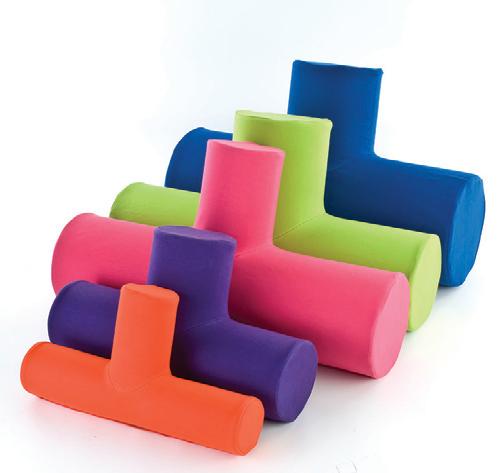
C&S Seating Ltd is the sole manufacturer of the
Alternative Positioning Support – also available in two sizes, which has removable side cushions and middle pommel for when more control of the abducted lower limb is required. Our popular and vibrant range of Soft Knit covers in a choice of 5 colours, provide a softer alternative, ideal for the colder seasons and are designed to fit snug over our waterproof rolls for maximum protection and comfort. Contact us on 01424 853331 or visit www.cands-seating.co.uk to request or download a brochure, pricelist or order form, request an individualised quotation, speak to an advisor or to place an order.
Worthing Mayor Cllr Cathy Glynn-Davies, and Town Crier Bob Smytherman.
Care for Veterans – a Royal Star & Garter Home – provides long-term nursing, rehabilitation, respite and end-of-life care to veterans and their families who live with disabilities, including acquired brain injury and degenerative neurological conditions.
Home Manager Vicky Strange said: “I’m thrilled that so many people came to our Home and enjoyed our Summer Fayre. I want to thank everyone who attended, and all our staff and volunteers who supported on the day. To raise nearly £6,000 is incredible and I’m grateful to everyone who helped made it such a memorable day.”


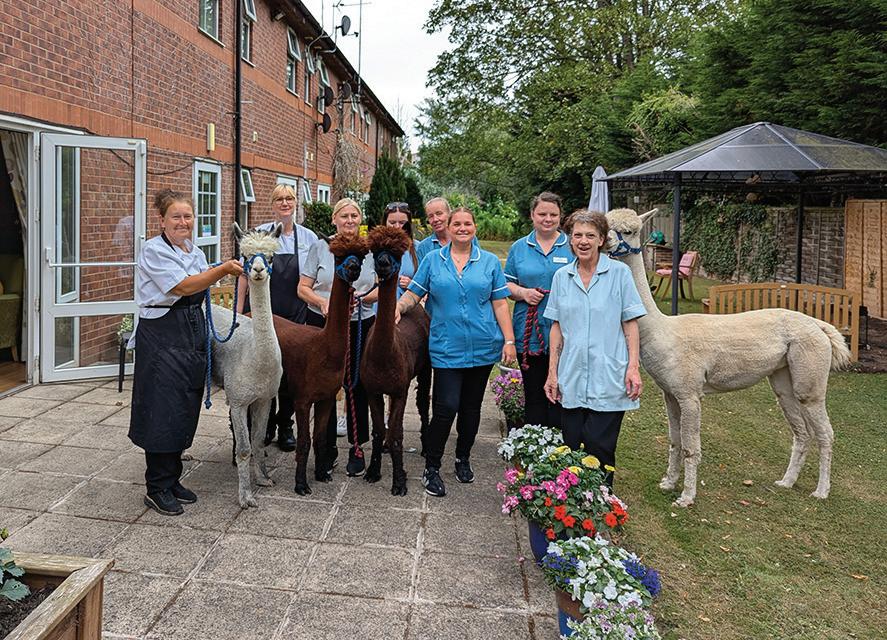
There was a buzz of excitement at Eaton Court Nursing Home in Grimsby last week as four very special guests trotted through the doors – a group of adorable alpacas from Westfield Alpacas.
Alpacas: Coco, Taz, Charlie and Kitty brought joy to everyone they met, charming residents and colleagues with their friendly, outgoing personalities and soft, gentle nature. The fluffy quartet made sure to visit every corner of the home, including popping in to say hello to residents who are bedbound or prefer to stay away from busy spaces.
Resident Eddie said: “They are such kind-natured animals, I love seeing them here – it’s always such a joy.” Sylvia, another resident, agreed as she beamed while stroking one of the alpacas.
Melanie Redgrift, Activities Coordinator and organiser of the visit, said: “This is the second time this year we’ve welcomed Westfield Alpacas into our home, and the seventh time in total, and, just as always, it was a brilliant day! Our residents absolutely adore them – so much so, we’ve already booked them in for another visit later this year – we can’t get enough.”
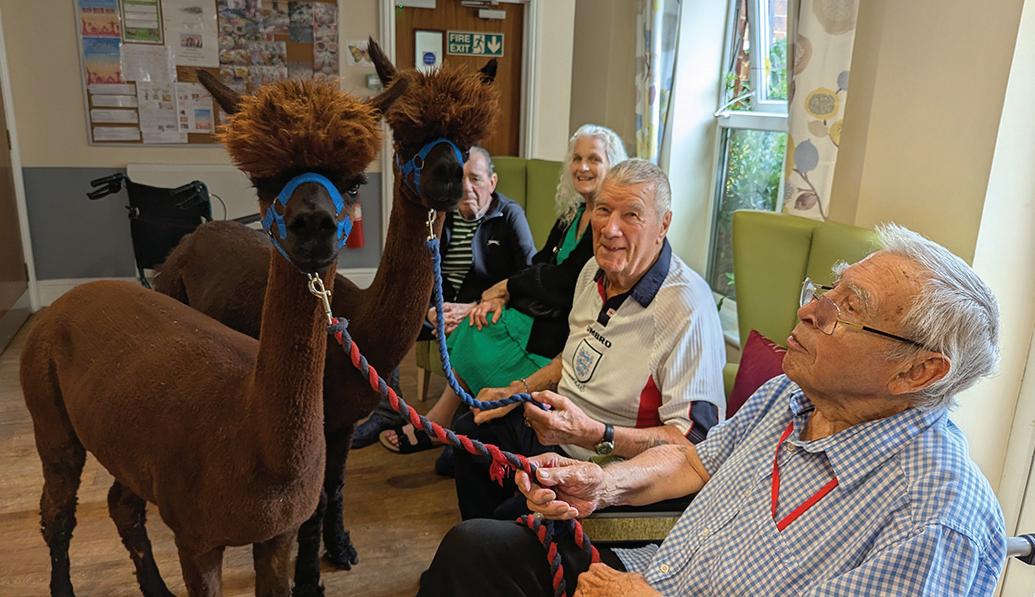
Anne Ruttle, Home Manager, said: “A huge thank you to the team at Westfield Alpacas for coming over and delighting our people! We had an unforgettable afternoon. Visits like this offer more than just a bit of fun; they’re a form of calming therapy. Gentle, positive interactions with animals can reduce anxiety, lift spirits, and bring real comfort to our residents, especially those living with dementia. We’re always looking for meaningful ways to enhance wellbeing, and this was a perfect example.”
HC-One’s Rievaulx House Care Home in Armley, Leeds, West Yorkshire, was visited on Friday 18th July by MP for Leeds South West and Morley, Mark Sewards.
Residents and colleagues of the HC-One owned care home enjoyed meeting their MP, Mark Sewards, and chatting to him about what life is like at Rievaulx House Care Home – which is an integral part of the local Armley community.
MP Mark Sewards enjoyed a tour round the 90 bedded residential and residential dementia care home, including the hair salon, kitchenette, lounge, quiet room, premier and ensuite bedrooms and gardens.
Samantha Foster, Home Manager at HC-One’s Rievaulx House Care Home, commented: “We were delighted to welcome MP Mark Sewards to our home. Everyone had a great time, chatting and discussing key
issues they care about and what actions can be taken to overcome them.”
MP for Leeds South West and Morley, Mark Sewards, said: “I was so pleased to visit Rievaulx House in Wortley to meet both staff and residents. It was so pleasing to see staff working so hard to care for residents. We are fortunate to have such a dedicated and caring workforce in Leeds South West and Morley. During our visit, the staff were working hard to ensure residents remained active and engaged in activities that they genuinely enjoyed.
“With an aging population, it is vital that all political parties work together to grasp the nettle of social care reform. We must create an adult social care system that is fit for the demands placed upon it, both now and in the future.”
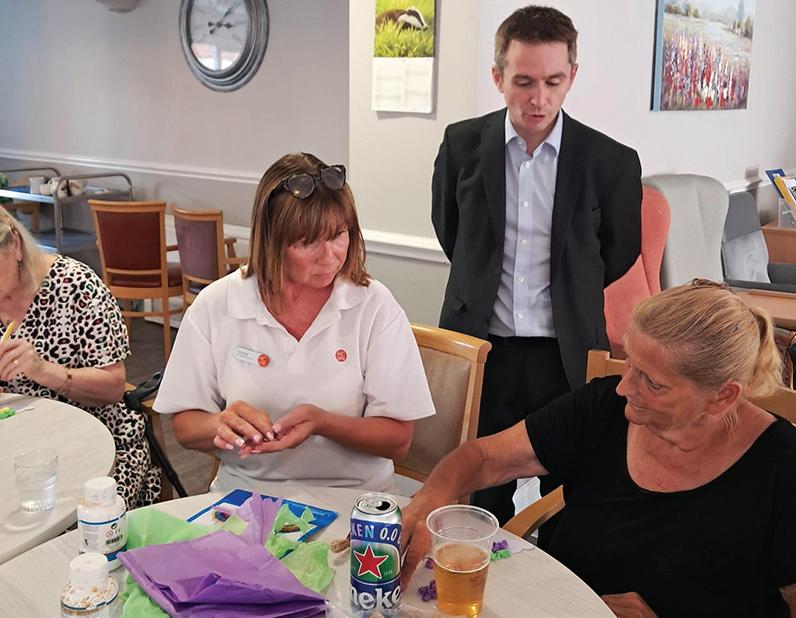
In care homes, where hygiene, safety, and reliability are paramount, it’s essential that laundry operations run seamlessly. Forbes Professional’s Complete Care solution is tailored to meet the specific demands of this environment, offering fully supported and cost-effective laundry systems.
With Complete Care, care homes benefit from access to premium commercial laundry appliances without upfront capital expenditure. The all-inclusive rental plan covers installation, routine servicing, maintenance, and repairs; enabling staff to focus on resident care rather than laundry appliance logistics. Unexpected breakdowns can severely disrupt operations, which is why Forbes provides nationwide, award-winning support with a same or next-day engineer response to minimise downtime.
Preventative servicing is central to Forbes’ approach. Their offering includes routine maintenance, full certification, annual gas safety checks, and professional dryer duct cleaning - ensuring systems meet all legal and regulatory standards. Whether supporting existing machines or those rented through Forbes, this

proactive strategy improves operational efficiency and reduces risk.
Under Regulation 35 of the Gas Safety Regulations 1998, annual gas inspections are mandatory. Forbes’ Gas Safe-registered engineers conduct these checks to ensure safe, legally compliant environments. Additionally, regular duct cleaning - often overlooked - is vital not only for performance but also for fire prevention. Forbes’ nationwide service mitigates these risks while optimising dryer efficiency.
Whether you need new rental equipment, service and maintenance for existing appliances, or a full purchase, Forbes offers flexible procurement routes to suit different operational models and budgets. Their expert consultants work closely with care providers to design tailored solutions for each setting.
With decades of experience in the care sector, Forbes Professional is a trusted partner to care homes across the UK; delivering dependable, fully supported laundry solutions that prioritise safety, compliance, and peace of mind.
forbespro.co.uk | info@forbes-professional.co.uk | 0345 070 2335
PASS by everyLIFE, the leading care management software provider, has announced a major recruitment drive following the successful launch of PASSgenius™ - its new suite of AI, data, and automation tools designed to help care providers make smarter
has opened up a new chapter for PASS," said Robin Batchelor, CEO of everyLIFE Technologies, the company behind PASS.

"We’re not only seeing increased demand from care providers, but also growing interest from talent who want to build technology that genuinely makes a difference in
sector continues to accelerate, with providers under pressure to deliver more with fewer resources. PASS’s latest innovations - including real-time performance dashboards and AIpowered care insights - have positioned it as a trusted partner to providers navigating operational and regulatory challenges.
For more information about current vacancies,

On 6 July, a team of dedicated staff and volunteers from Brunelcare’s Little Heath Care Home successfully climbed Pen y Fan, the highest peak in South Wales, raising over £1,000 to support activities and enhance the living environment for their residents across the home.
Pen y Fan is situated in Brecon Beacons National Park and stands at 886 metres (2,907 ft) above sea-level.
The fundraising initiative, led by team members Jess Ward, Business Manager at Little Heath and Ruth Easton, Homemaker at the care home, was launched with the aim of improving day-to-day life at the care home from
funding new activities to enhancing the overall environment. The challenge quickly gained momentum and was embraced by the wider team, becoming not just a charitable event, but a valuable team-building experience.
Krishna Mullekattu, Little Heath Care Home Manager said: “Climbing Pen y Fan in the wind, rain and mud was no easy feat, it was exhausting and, at times, even a little dangerous. But alongside an incredible team of staff and volunteers, we made it to the top! I’m proud that our determination helped raise funds for the meaningful activities we provide to our residents every day.”

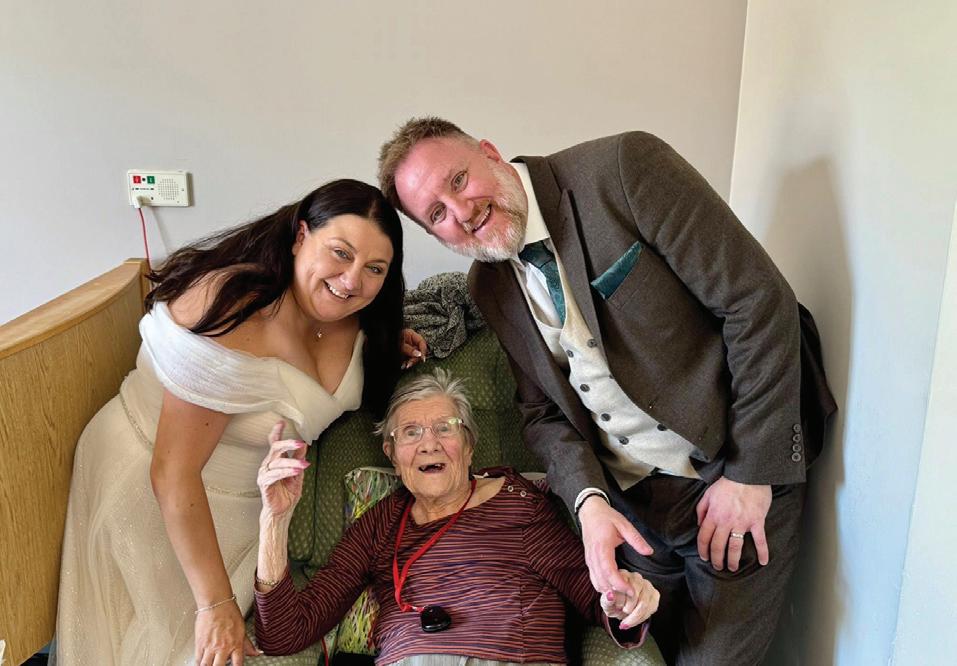
There was a special kind of magic in the air at Beaufort Grange in Cheswick Village, Bristol, as the team and residents gathered to celebrate a truly joyful occasion. Charly, the home’s much-loved Activities Coordinator, paid a surprise visit shortly after marrying her partner, Stuart—and she brought a whole lot of love with her.
Wearing their full wedding finery, the newlyweds arrived to cheers and applause from residents and staff alike. In a touching moment that brought tears to many eyes, the couple recreated their first dance right in the home’s lounge, surrounded by music, smiles, and a few emotional embraces.
“It was just beautiful,” said one of the ladies residing in Beaufort Grange “You could see how much love they have for each other, and the fact that they came back here to include us made me feel like part of their family. I even cried a little!”
The celebration continued with a toast to the couple’s future. Glasses of champagne and Prosecco were raised high as residents and team members joined together to wish Charly and Stuart a lifetime of happiness.
Those who weren’t able to attend the lounge gathering didn’t miss out. The couple made a point of vis-
iting residents in their rooms, sharing personal moments, heartfelt smiles, and plenty of stories from their big day.
General Manager at Beaufort Grange, Raji Sunil said:
“We always say this is more than just a care home—it’s a family. Charly has been such a bright, uplifting presence here. To see her bring part of her special day back to us was incredibly moving. She gave the residents a gift they’ll never forget.”
Charly has built strong relationships with residents during her time at Beaufort Grange, and her decision to include them in such an intimate part of her life speaks volumes. The joy she and Stuart brought into the building that day was contagious, and it’s clear the memory will linger warmly for a long time.

As the couple departed amid cheers and waves, there was a sense of something greater than just a celebration—it was a reminder of how powerful community, connection, and love can be.
From all of us at Beaufort Grange: congratulations, Charly and Stuart! Thank you for sharing your happiness with us.
Residents and staff at Rownhams Manor care home are supporting Southampton City Hospital by donating a large collection of much-needed adult clothing items.
The donation was delivered directly to the Patient and Family Support Hub at University Hospital Southampton NHS Foundation Trust (UHS), which is currently experiencing an urgent shortage of adult-sized clothing for patients. 94-year-old Rownhams Manor resident Audrey Jones, who was among those to donate, shared her thoughts on taking part:
"It was so lovely to be able to donate some of my clothing items. Knowing that something as simple as a clean shirt can make someone feel a little more comfortable during a difficult time really touched me. It’s a small gesture, but one that can mean so much to someone."
Samantha Grace, Deputy Manager at Rownhams Manor who delivered the

donations, added:
"We always foster a spirit of compassion and community within our home. Our residents were so enthusiastic about giving, and it was heartwarming to see how much thought they put into selecting items they hoped would help someone feel a little more at ease.
“We’re proud to support our local hospital and hope our contribution helps make a difference."
You can learn more about Rownhams Manor’s community initiatives during the home’s weekly event, Tea on Tuesday, every Tuesday at from 10:30. Taking place at the home on Harrison Way in Rownhams (Southampton, SO16 8NG), all are welcome to join the residents and staff for homemade cakes and refreshments.
HC-One’s Mossdale Residence Care Home in Burnholme, York, proudly hosted a Dementia Support Coffee Morning and Social Event in support of the Alzheimer’s Society, welcoming residents, family members, and the wider community to join in a meaningful day of support, understanding, and togetherness. Held in the home’s spacious communal lounge, the event provided a safe and friendly environment where people could share their experiences of dementia, connect with others, and learn more about the condition and the resources available for those affected by it.
The morning featured a variety of activities designed to foster connection and engagement, including:
A selection of homemade cakes and refreshments, lovingly prepared by the Mossdale catering team.
Information stands offering leaflets and guidance from local and national dementia support organisations.
Friendly one-to-one chats with members of the Mossdale care team, who shared advice and insights into dementia care practices.
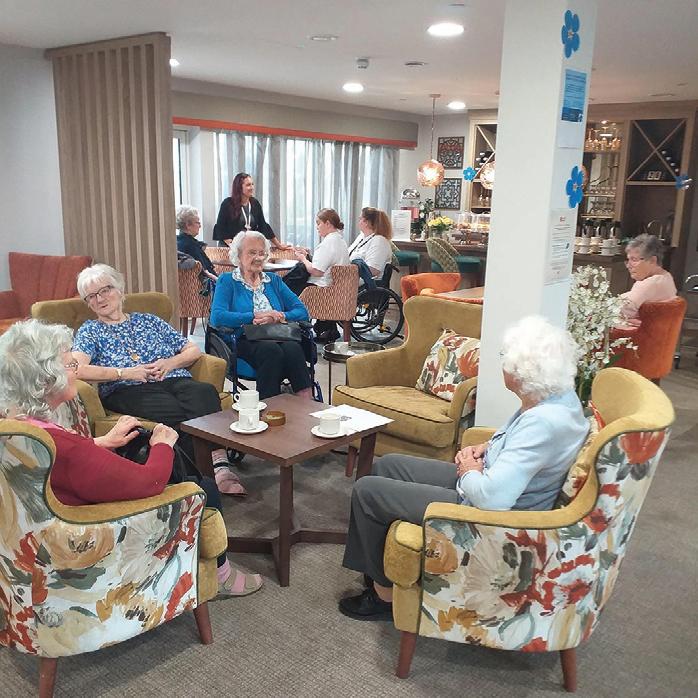
A warm and inclusive atmosphere, designed to put attendees at ease and encourage open conversations about a condition that affects millions across the UK. Visitors also had the chance to learn about the specialist dementia care provided at Mossdale Residence, and how the home creates a supportive, stimulating environment for those living with memory loss and cognitive decline.
Julie Banks, Home Manager at HC-One’s Mossdale Residence Care Home, said: “We were delighted by the incredible turnout and support from our local community. Dementia affects not just individuals, but families and loved ones too and events like this help build a strong network of support, understanding and compassion. We’re proud to be part of a care group that champions awareness and education.”
The Dementia Support Coffee Morning events are held monthly at HC-One care homes located in York including Mossdale Residence, Handley House and Ebor Court on the fourth Thursday of every month, 10am – 12pm, alternating venues between the three homes.
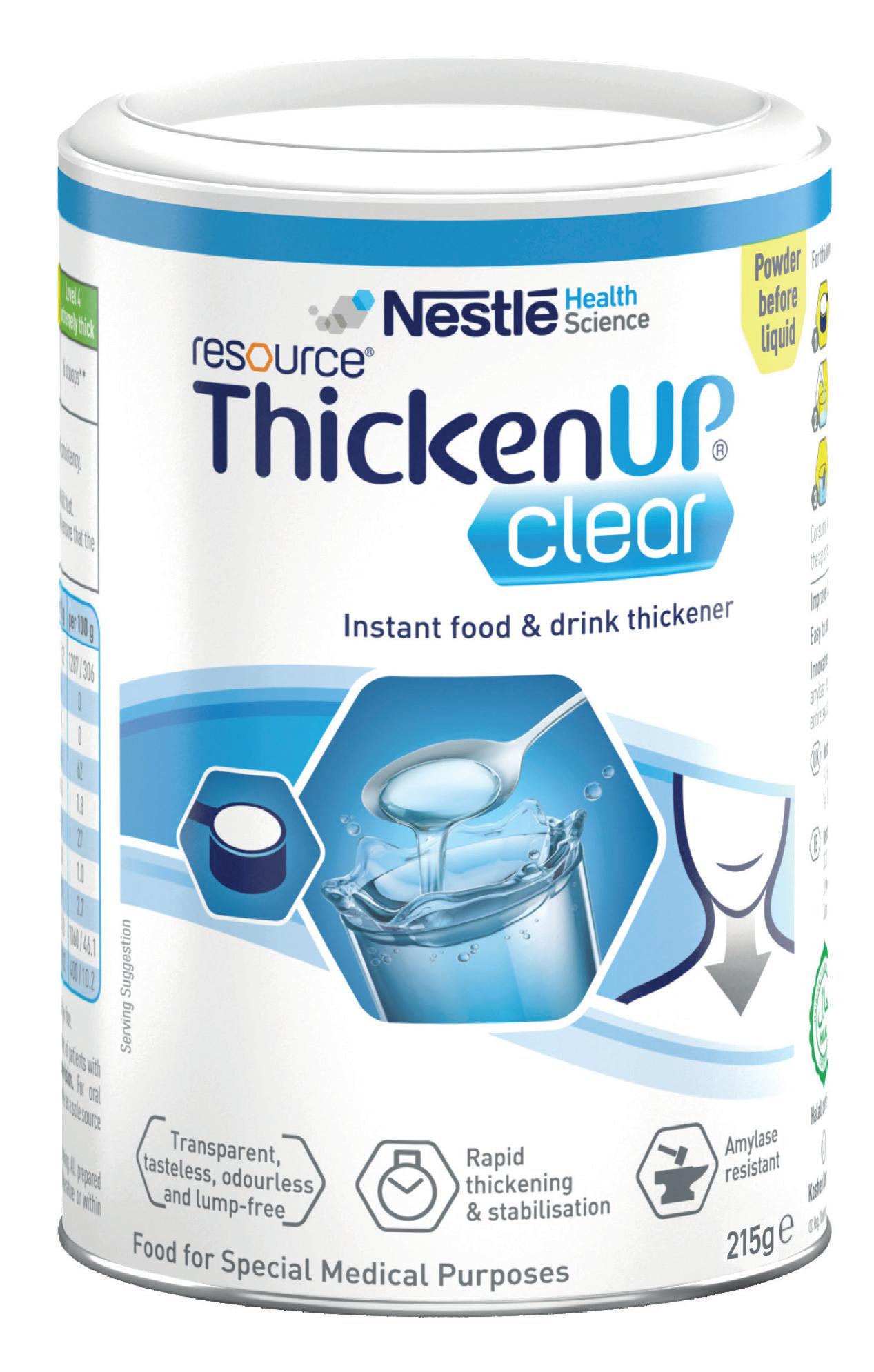
From March 31st, new waste disposal regulations came into effect as part of the Government’s Simpler Recycling initiative. Designed to reduce waste and increase recycling rates across the country, this has direct and potentially significant implications for the care home and nursing home sector. Anenta, the UK’s leading independent healthcare waste management specialist for the care home sector, explains to issues at hand.
Under the news Simpler Recycling regulations, in addition to segregating clinical waste and offensive waste into separate waste streams, care homes now have a legal duty to separate out all recyclable materials from general waste.

Paper and card, plastic, glass, metal, and food waste all need to be separated and stored in segregated waste collection streams, necessitating larger storage areas, more waste receptacles, and more waste collections.
Although this has implications and associated costs, the new regulations are important because incorrectly disposed waste not only puts a strain on England’s waste capacity – hampering sustainable waste targets – but also significantly adds to the cost of care home waste bills.
FOOD FRUSTRATION
Of all the new waste streams, food waste is likely to be one of the biggest headaches for care homes. That’s because if you produce more than 5kg of food waste per week, you will need to implement a separate food waste disposal system.
Food is a particularly significant form of waste for most care homes as it’s almost impossible to avoid when catering for residents.
In some cases, care homes will have good protocols in place for uneat-
en or waste food, with collections for anaerobic digestion or composting in place. However, for many others this will not be the case, quite simply because it’s always been easier to put waste food into general waste.
And while food waste from canteens or communal eating areas may be relatively easy to collect and recycle, it’s important to remember that a significant amount of other food waste – resulting from items being consumed by both staff and residents in other areas – have the potential to end up in general waste too. Under the new rules that cannot be allowed to happen and that means you now need to make separate food waste bins readily available in public areas.
WHAT IF YOU DON’T COMPLY?
Under the new legislation, if you put food waste into the wrong bins, your supplier will not be permitted to collect them. However, you’ll still be charged, and repeated non-compliance could result in fines or other penalties, which could be as high as £5,000 or more.
To avoid this, you’ll not only need to have sufficient food waste bins in place within your care home, but appropriate training to ensure that all staff are aware of the importance of segregating waste correctly. Here, appropriate signage is also advised to avoid any confusion.
You’ll also need to ensure that food waste collected within your care home – including inedible food parts such as bones, eggshells, fruit and vegetable skins, tea bags and coffee grounds – actually make it into the designated food waste bin for collection.
When you consider that general waste for care homes costs anything between £180 and £250 a tonne, whereas food waste – collected for
Mobile Kitchens Ltd specialises in the hire or sale of temporary catering facilities and foodservice equipment. Ideal for events or to provide temporary catering facilities during your kitchen refurbishment, our versatile units and equipment offer an efficient and economic solution to the caterers’ needs.
Production Kitchens, Preparation Kitchens, Ware-washing Units, Dry Store Units, Cold Rooms and Restaurant Units are available as individual units in their own right or they can be linked together on site to form a complete complex.
Alternatively, we can offer modular, open-plan facilities, usually for larger, longer-term hires.
We offer a free design service, and project management from concept through to delivery and installation on site, plus full technical support throughout the hire period.
The standard specification of our smallest Production Kitchen unit includes a six burner oven range, sala-

anaerobic digestion – costs between £105 to £190 per tonne, it simply doesn’t make sense to continue putting food in your general waste.
Quite apart from avoiding large fines – which could affect your reputation – switching from using the general waste stream for food disposal to anaerobic digestion will save your business anything between 8% and 16%. That’s a saving of £60-£120 per 1,100 litre bin per annum. For care home groups with multiple locations, that’s a saving that soon mounts up.
So, far from being a bad thing financially, the new recycling regulations actually have the potential to bring about long-term cost savings for care homes throughout England. Viewed through that lens switching to segregation makes complete sense.
But it’s not the only benefit. By diverting your food waste from general waste into a separate food waste recycling stream, it can be reprocessed through anaerobic digestion to create organic fertiliser and biogas, helping your business move one step closer to becoming zero-to-landfill and achieving your environmental targets.
This avoids your care home food ending up in landfill where it would release methane, a gas which, according to the UN Environmental Programme, is 80 times more harmful than carbon dioxide
Adopting this process will help to ensure that the correct waste goes into the correct channels, saving your care home money, keeping you compliant, minimising environmental impact, and avoiding inadvertent contamination that could cause issues with your waste collection, leading to extra cost, and stringent action by the authorities.
Far from being feared, the new Simpler Recycling regulations should be embraced, saving your care home money and playing a part in saving the future of the planet.
For guidance and advice on how to meet the Simpler Recycling Workplace Rules, and for information on the best systems to adopt for waste storage and collection, email Anenta at contact@anenta.com or call 033 0122 2143. www.anentawaste.com
mander grill, twin basket fryer, upright fridge, hot cupboard, single bowl sink unit with integral hand wash basin, plus ample power points to plug in Microwaves, Food Processors, Toasters etc. Internal equipment can be interchanged and clients can effectively specify their preferred layout.
We have many tried and tested design layouts and would be pleased to put forward our recommendations for your project.
So if you’re planning a refurbishment or need to cater for an event then why not give us a call and we’ll be happy to provide advice and put forward a competitive proposal.
For further information or to arrange a site visit, email: sales@mk-hire.co.uk or call us on 0345 812 0800, or visit our website: www.mk-hire.co.uk
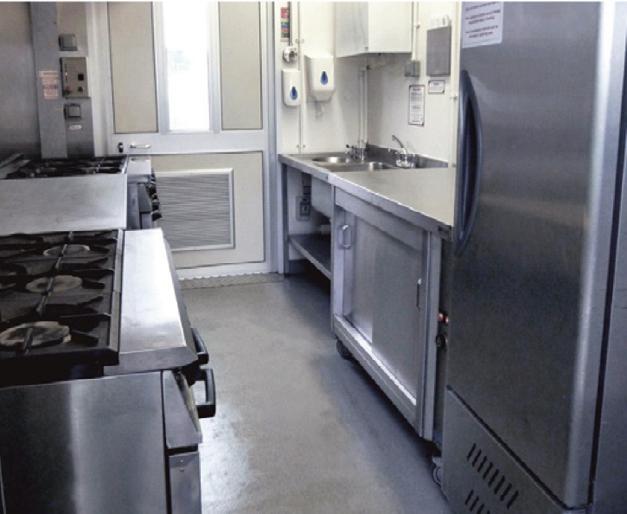
At Simply Food Solutions, we believe that everyone deserves access to delicious meals tailored to their specific dietary requirements. Founded over 20 years ago, the company began with a vision to provide high-quality halal meals to hospital patients. Today, as part of the Bidfood family, Simply Food Solutions offers an extensive range of food solutions designed to meet the diverse needs of healthcare providers, care homes and individuals across the UK.
Our Product Ranges
SIMPLY PUREE
Designed for individuals with swallowing difficulties (dysphagia), the Simply Puree range offers texture-modified meals compliant with IDDSI guidelines. From Level 3 (Liquidised) to Level 7 (Regular), our meals ensure safety without compromising on taste. Options include soups, main courses, desserts and snacks, all crafted to the highest safety standards. Additionally, the Simply Puree Junior line caters to paediatric needs, providing meals that are both safe and appealing for children.
SIMPLY HEALTHCARE

Meeting the needs of patients with allergies, intolerances, or specific dietary requirements, the Simply Healthcare range includes gluten-free, allergen-aware and renal-suitable meals. Each dish is pre-plated and ready to serve, ensuring convenience and consistency in meal preparation. The range encompasses a variety of meat, fish and vegetarian options, all designed to support patient health and satisfaction.
SIMPLY WORLDFOODS
Reflecting the UK's rich cultural diversity, Simply Worldfoods offers a selection of cultural meals, including halal, kosher and Afro-Caribbean meals. This range allows healthcare providers to offer patients a taste of home, enhancing mealtime experiences and promoting cultural inclusivity.The range also provide multiportion dishes that are ideal for staff or visitor feeding cafes.
Explore our full range of products and discover how Simply Food Solutions can enhance your mealtime offerings, please visit https://simplyfoodsolutions.co.uk


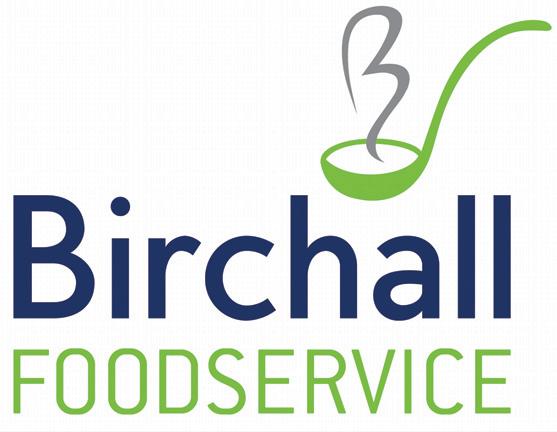
Burnley-based wholesaler and founder Country Range member, Birchall Foodservice, has launched its first-ever Care Home Activity Pack — a 62-page guide designed to support activity coordinators and caterers working within the healthcare sectors.
Recognising the challenges that care home teams face in delivering engaging, enjoyable, and meaningful activities for residents, the pack offers a comprehensive range of creative ideas built around food. Its aim is simple: to spark joy and connection through shared experiences that centre on mealtimes, cultural celebrations, and interactive activities.
At the heart of the pack is a month-by-month events calendar, highlighting key seasonal dates such as Valentine’s Day, Easter, and Remembrance Sunday — each paired with activity suggestions, food ideas, games, and even suggested decorations. These are supported by easy-to-follow recipes and product recommendations.
Popular food-themed games include Biscuit Jenga, Build Your Own Pizza nights, and Food Bingo, which are designed to encourage motor skills, social interaction, and laughter. There's also a "World on a Plate" section, offering immersive cultural experiences for countries including Italy, Mexico, Spain, France, China, and the UK — complete with themed menus, music ideas, and crafts.
To help tackle hydration in fun and engaging ways, the pack features ideas such as mocktail parties, milkshake decorating, and “Guess the Drink” challenges — all designed to improve fluid intake without it feeling like a chore.
Joe Moulton, Marketing Manager at Birchall Foodservice, said: "This pack combines food and fun to help care homes deliver meaningful activities that residents will genuinely enjoy. It’s all about sparking joy through shared experiences, whether that’s a themed afternoon tea or a game of Food Bingo."
The pack has been developed with support from trusted foodservice brands including Albany, Soreen, McVitie’s, Kellogg’s, Lakeland Dairies, and Nestlé. It offers a mix of inspiration and practicality, helping care teams save valuable planning time while delivering enriching experiences. Available now to all Birchall Foodservice customers and care homes across the UK, the pack is free to download.
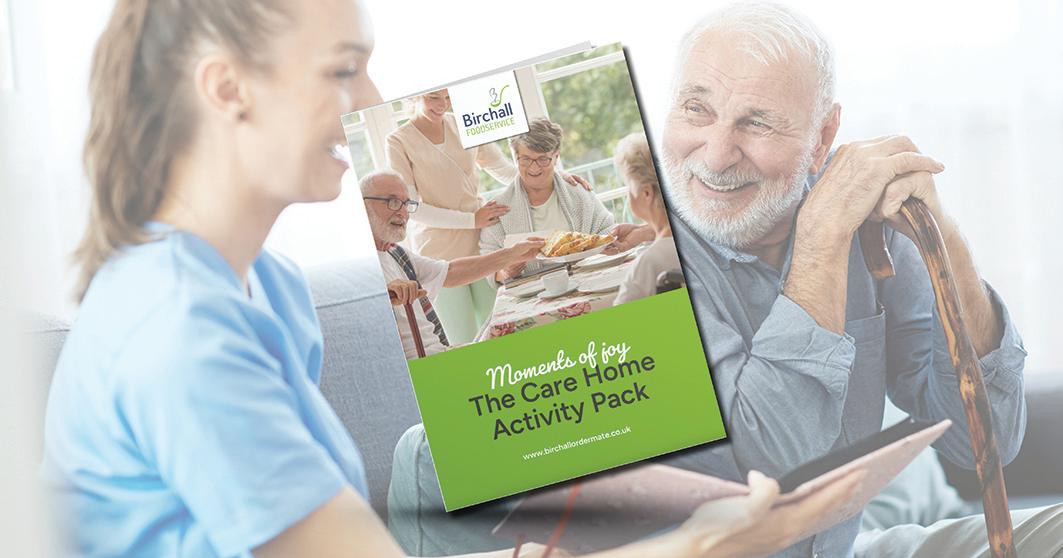
To access the Care Home Activity Pack, visit: www.birchallfoodservice.co.uk/resources or get in touch with the Birchall team by calling 01282 429446.
Jelly Drops (backed by the Alzheimer's Society through their Innovation Accelerator programme) have announced a new 288 pot ‘bulk’ pack for the care sector allowing care homes and in-home agencies to buy in bulk at a reduced rate, ahead of the anticipated warmer summer weather. These award-winning water sweets with added electrolytes boost hydration for people living with dementia and others that struggle to adequately hydrate. By eating two to three pots of Jelly Drops throughout the day, residents with hydration challenges can easily top up their fluid intake in a dignified and independent way.
Dehydration is a common challenge for people living with dementia and aspects like memory problems, potential lack of dexterity and/or avoiding drinks due to fear of incontinence or confusion about where
the toilet is, can all make individuals more susceptible to the dangers of dehydration. Conversely, being well hydrated supports brain function, reduces the risk of urinary tract infections (UTI’s) and unnecessary hospital visits. Even mild dehydration can significantly impact an individual’s wellbeing when they are already dealing with cognitive challenges like dementia.
Jelly Drops have supported over 100,000 families since being developed by Lewis Hornby for his late Grandma Pat who struggled with staying hydrated whilst living with dementia.
If you are interested in learning more about the 288 pot ‘bulk’ case of Jelly Drops to support hydration for your residents or clients,, please contact hello@jellydrops.com or visit www.jellydrops.com

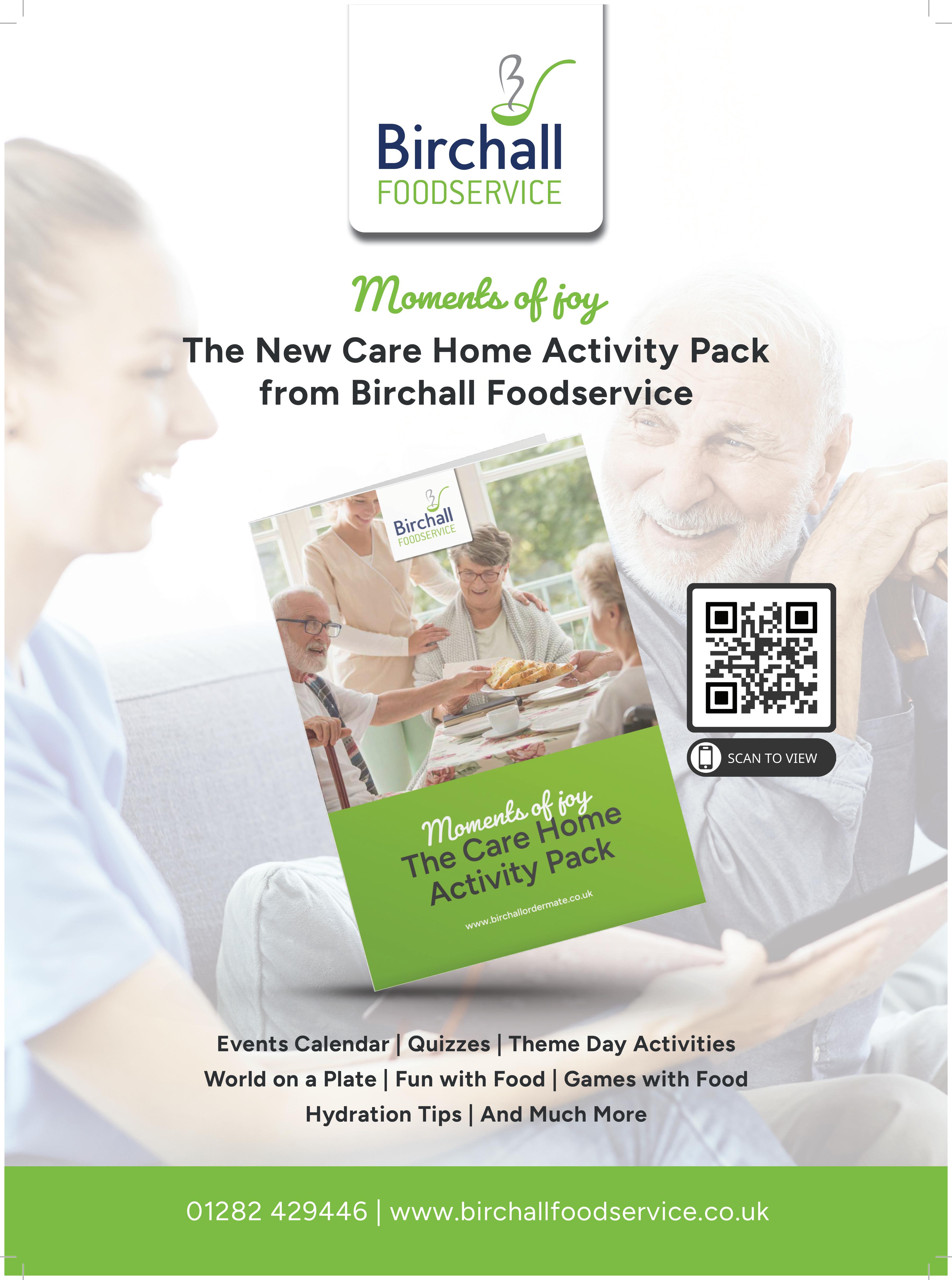
The Treat-Eezi full length pressure relieving mattress overlay (very high risk to stage 4 pressure ulcers) is designed to be laid on top of mattresses. It naturally and gently moves with the patient creating an almost zero chafing area allowing the patient a silent, comfortable sleep along with the assurance any pressure sores present are given the best possible chance to breathe and heal.
Quotations available via checkout.
£241.40p (Exclusive of VAT)
PRODUCT BENEFITS

• Precision Relief: Using advanced 3D pressure sensor mapping, our pressure-relieving mattress overlays provide targeted relief by accurately identifying pressure points, ensuring optimal support for patients.
• Pressure Relief: Our unique 4-layer pressure-relieving mattress overlays offer unique pressure sore prevention, trusted by over 10,000 medical professionals since 2016.
• Sleep Benefits: No noisy pump systems; our static solution guarantees a peaceful sleep environment, free from disruptions or maintenance hassles and allows the patient to sleep with their partner.
• Breathability: Enhanced breathability ensures optimal airflow for keeping patients comfortable and cool.
• Endorsements and Warranty: Backed by endorsements from NHS community services and a full two-year warranty.
• Easy Application: Our pressure-relieving mattress overlays have easy-to-follow instructions.
WHO IS IT FOR
The Treat-Eezi full-length pressure relieving mattress overlay is ideal for individuals who spend prolonged periods in bed or seated, including:
• Elderly individuals with limited mobility
• Patients recovering from surgery or injury
• Those at risk of developing pressure sores
• Caregivers looking to enhance comfort for their loved
ones
Sales/General Inquiries: 0208 133 2851 www.danmedicasouth.co.uk
See the advert on page 11 for more information.
At Novamed, we understand the daily challenges that incontinence brings.
With that in mind, our specialist team, which includes a retired NHS continence nurse, have developed a premium product range designed to give users comfort, protection, and dignity, as well as being manufactured to ISO 13485 quality standards. Our comprehensive incontinence care solutions include: All-in-one (slips) for moderate to heavy use Pull-up pants for light to moderate needs Disposable underpads to protect beds and furniture

• Biodegradable bamboo pads for light protection with an eco-conscious approach Each product provides skin-friendliness, odour
control, and ease of use. With consistent quality and comfort, Novamed are trusted by care professionals across the UK. Our Devon-based warehouse ensures fast, discreet delivery throughout the country. We offer free samples to help you assess the best fit. Novamed products are also trusted internationally, with distribution in Gibraltar, Montenegro, the Middle East, and Europe. For continence care you can depend on, contact Novamed today to learn more or request your free samples 0808 196 2070 www.novamedpads.co.uk info@novamedeurope.com
See the advert on page 4 for details.
CareZips® Classic are patented, easy dressing unisex adaptive pants designed for older and disabled people suffering with problems associated with continence, mobility, mental function and cognition. Suitable for persons living in care institutions, receiving care at home or living independently at home, CareZips® Classic enable people to dress themselves or with assistance from carers.
CareZips® Classic feature patented 3-zipper system, which opens the front of the pants from the waist to the knees for quicker access during toileting, continence pads changes and personal hygiene.

The forward positioning of the two side zippers lessens pressure on sensitive hip areas, helping to eliminate discomfort. The third zipper facilitates simple full frontal opening for faster more dignified diaper changes, catheter adjustments, personal cleansing and hygiene routines.
CareZips® Classic have many benefits for the older and disabled users and their carers:
• People dressing themselves enjoy the practical
Based in Derbyshire, we’re a family-run business with over 30 years of experience committed to helping care homes create safe, welcoming outdoor spaces for residents, staff and visitors.
We offer a wide range of garden furniture, including benches, companion seats, dining sets, picnic tables and planters, all crafted to be strong, durable and splinter-free. Unlike traditional timber, our furniture won’t rot, warp, or require painting, making it a low-maintenance, long-term solution for care environments.
Our products support the circular economy by transforming waste plastic into something both functional and stylish. Each piece is made here in the UK and built to withstand all weathers, year after year. In recognition of our sustainable practices, we’ve been awarded the King’s Award for Enterprise in Sustainable Development. Here’s what Darley Hall Care Home had to say
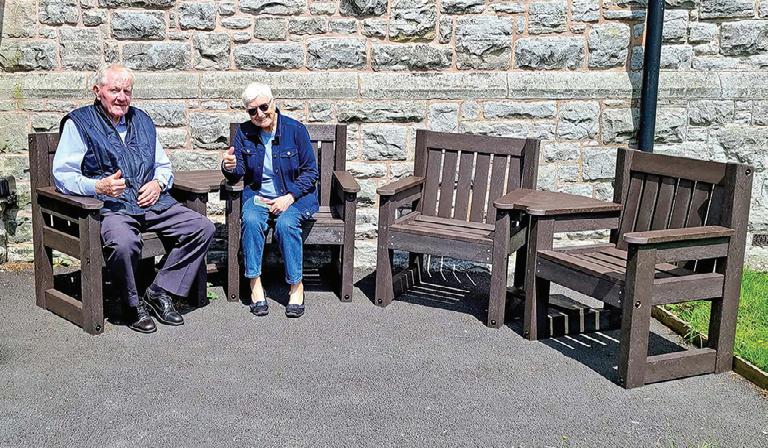
Watch your resident's eyes light up when the trolley arrives! Euroservice trolleys can also be used as a vending trolley or to sell personal care products to residents. How about a delicious snack/pastry trolley or even a drinks trolley for that afternoon tipple? Your lovely trolley could do so much for you and your residents! Visit the website at www.euroservice-uk.com to see the full range.
Or see the advert on page 13.

Angloplas are a UK manufacturer who specialise in producing dispensers for the health and hygiene industry. Although these are designed to keep the workplace tidy and uncluttered they are, more importantly, built knowing the control of healthcare-associated infections (HCAIs) are a priority for healthcare providers, and who are employing a combination of infection prevention and control strategies, including hand hygiene, cleaning, training and the adoption of new technologies, to tackle the problem.

As a result, a wide range of infection control products and technologies are emerging on the market, including antimicrobial technology. Angloplas’ range of dispensers are produced in the world’s first
proven Antimicrobial PVC with silver ion technology and which is exclusive to Angloplas. This helps reduce the risk of cross infection by stopping the growth of bacteria and mould and works continuously for the lifetime of the product, reducing levels of bacteria such as MRSA, E Coli, Legionella, Salmonella and mould by up to 99.99%.
For non-clinical environments Angloplas has recently launched its new Budget Range of products which are made to the same exacting standards as the antimicrobial protected ones but with lower price tags.
You can order Angloplas products directly from its website at www.angloplas.co.uk
See the advert on page 9.
functionality and versatility of the CareZips® Classic, all day comfort and easy garment care.
• People dependent on assisted dressing appreciate quick easy dressing process with less stress, embarrassment and greater dignity offered by CareZips® Classic.
• CareZips® Classic offer practical gains to the carers, helping them to provide better care, whilst reducing physical efforts and saving valuable time.
CareZips® Classic are unisex, available in 6 sizes and 3 practical colours (i.e. black, charcoal and navy). Tapered fit at the ankles gives a tidy appearance. Made from breathable moisture-wicking 4-way stretchy crease-free and easycare durable fabric, CareZips® Classic are comfortable, practical and conveniently functional. For more information, contact Win Health Medical Ltd - 01835 864866www.win-health.com
See the advert on page 3 for further information on Win Health’s product range.
Since our founding in 2010, Activities to Share has been dedicated to enhancing the lives of those in care by providing thoughtfully designed activity products. Our mission is to support activity coordinators in delivering uplifting, engaging experiences that foster connection, joy, and well-being.
We achieve this by listening closely to your feedback and evolving with your needs. Whether over the phone, via email, WhatsApp, or Live Chat on our website, our team is always ready to offer advice and help you find just the right products to bring your ideas to life.

While we embrace the convenience of technology to expand our resources and share knowledge, we remain firm believers in the irreplaceable power of sensory engagement. That’s why we continue to
make our Reminiscence Kits and Sensory Bags with real, tactile items that stimulate the senses. Some experiences— like popping bubbles for the splash, breathing in a familiar scent, or piecing together a puzzle with others—simply can’t be replicated on a screen. These sensory moments are invaluable in encouraging storytelling, sparking memories, and fostering conversation. Our values remain rooted in this commitment to meaningful connection. We’re here to partner with you—the professionals on the front lines of care—to create a sense of structure, well-being, and fun for those who need it most.
for your activity diary
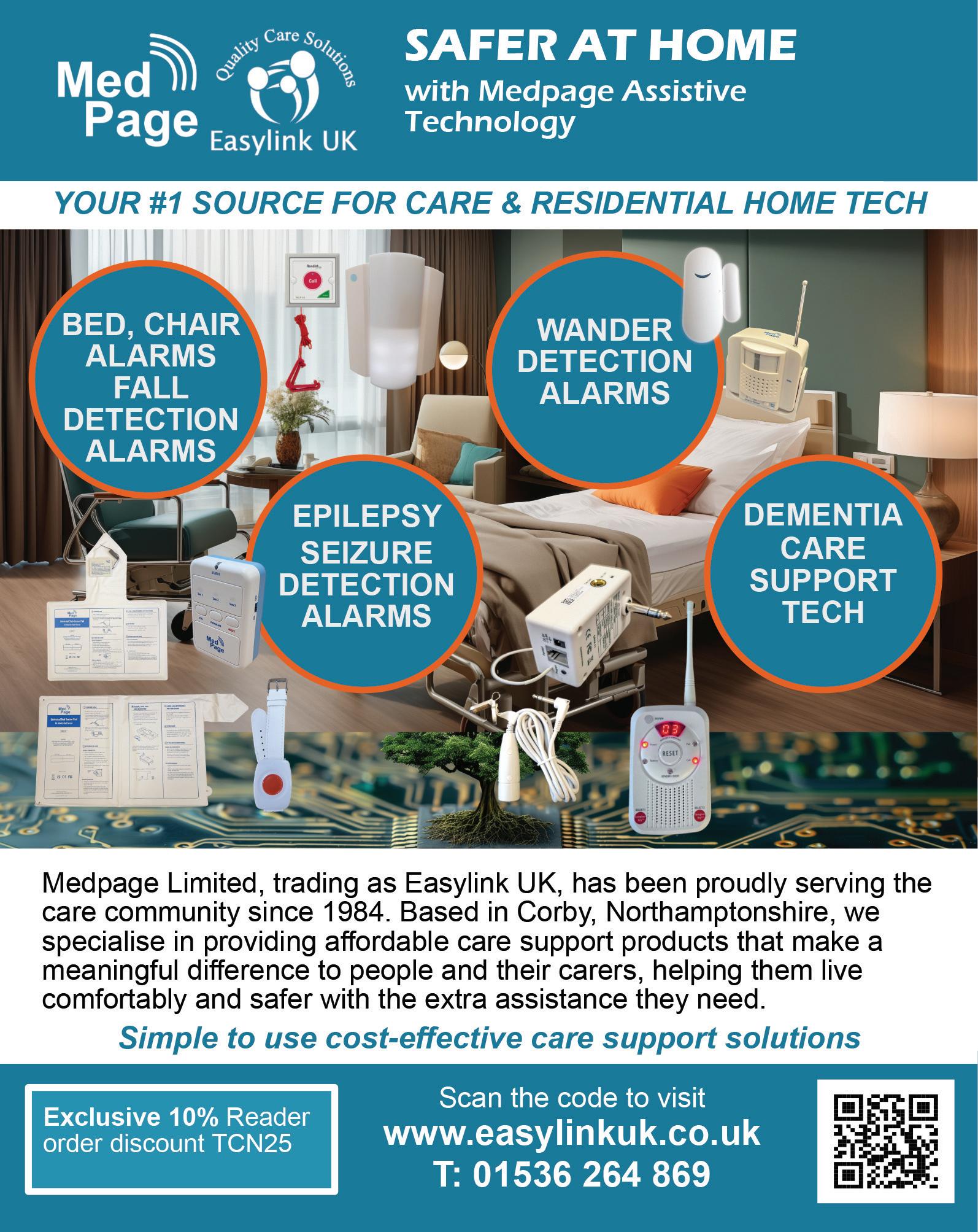
In the evolving landscape of residential and nursing home care, technology now plays an increasingly pivotal role in enhancing said patient safety, staff responsiveness, and overall operational efficiency.
One of the most critical technologies at the heart of this transformation is the nurse call monitoring system. These systems serve as the backbone of communication between residents and care staff, and their importance cannot be overstated in delivering timely and effective care.
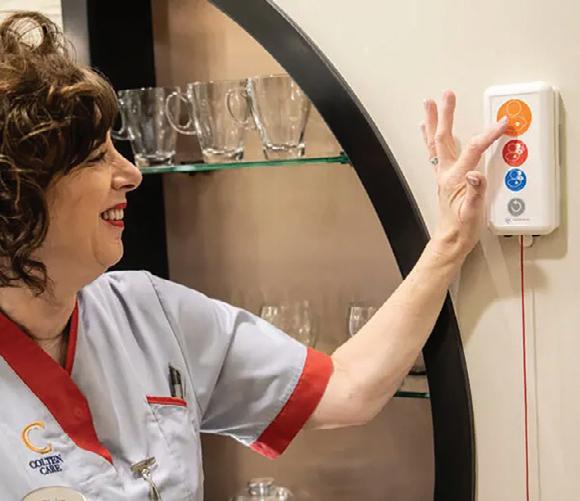
UNDERSTANDING NURSE CALL MONITORING SYSTEMS
A nurse call system enables residents to quickly and easily summon assistance. However, modern systems have evolved far beyond simple buzzers. Today, care facilities can choose from wireless, integrated, and modular systems—each designed to meet different operational needs, with modern solutions now connecting with fall detection sensors, electronic patient records (EPR), and mobile caregiver apps. This integration not only streamlines workflows but also helps care homes meet Care Quality Commission (CQC) compliance requirements while delivering faster, more personalised care.
Wireless Systems are ideal for facilities seeking flexibility and ease of installation. Without the need for extensive cabling, these systems can be deployed rapidly and expanded as needed.
Integrated Systems tie into a facility’s broader infrastructure—such as fire alarms, CCTV, and building management systems—allowing for a holistic response to emergencies and enhanced safety protocols.
Modular Systems provide a customisable solution, enabling care homes to scale up or down based on the size of the facility or changing care requirements.
The implementation of an advanced nurse call monitoring system delivers measurable benefits across multiple areas:
• Improved Staff Efficiency: With real-time alerts and data analytics, care teams can streamline workflows and focus attention where it’s most needed, reducing unnecessary checks and overlaps.
• Enhanced Patient Safety: Immediate access to assistance reduces the risk of falls, unattended health episodes, and delayed medication administration.
• Greater Resident Satisfaction: Prompt responses foster a sense of security and dignity among residents, improving their overall experience.
Operational Cost Savings: Efficient use of staff resources and reduced emergency incidents contribute to long-term financial sustainability for care providers.
As regulatory expectations and resident needs continue to rise, nurse call monitoring systems are no longer a luxury but a necessity. They not only support compliance with Care Quality Commission (CQC) standards but also set the tone for a culture of responsive, resident-centred care.
Implementing a nurse call system offers numerous benefits, including improved communication, enhanced safety, increased staff efficiency, better resource allocation, and improved documentation. These advantages contribute to a higher quality of care, improved patient/resident satisfaction, and a more efficient and effective healthcare environment
Investing in the right system requires careful evaluation of a care home’s size, staffing levels, and longterm care strategy. However, the return on investment—in terms of safety, efficiency, and satisfaction—makes it one of the most impactful upgrades a care home can undertake.
In today’s care environment, technology must work in harmony with human compassion.
Nurse call monitoring systems exemplify this synergy, serving as a quiet but powerful ally in the mission to deliver safe, dignified, and effective care.
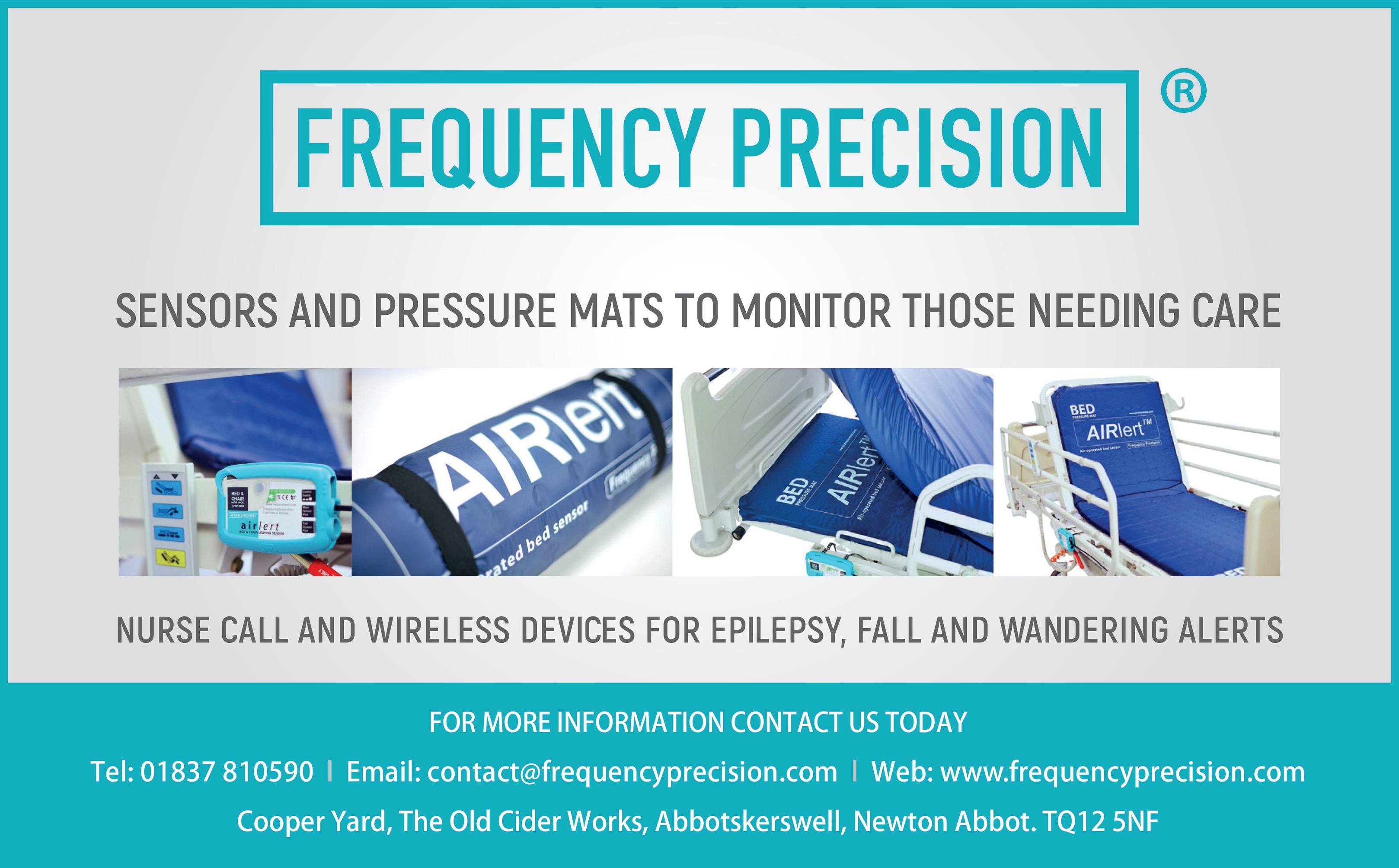
Technology has made people more connected with the world around them and the revolution in assistive care devices has made it possible for the elderly to spend their last years in a comfortable and familiar environment. These devices have also made it easier for home carers to provide quality care for their loved ones while managing their own lives. They allow you to care for your elderly whether they are travelling in the city for errands, staying alone at home, or staying in the same home as you. They are also helping nursing homes provide better care for them with discrete monitoring and quick responses to emergencies.
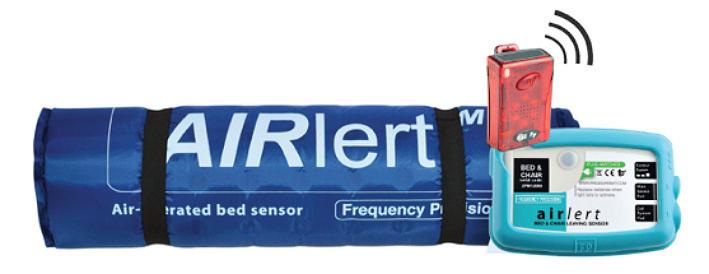
If you’re looking for these kinds of assistive care devices for your loved ones or nursing home, Frequency Precision produce some of the best systems available to help you with elderly care and mobility monitoring, ranging from bed, chair and floor sensor mats through fall monitoring and GPS tracking to fully integrated nurse call plug or wireless systems.
Phone: 01837 810590
Email: contact@frequencyprecision.com
Website: www.frequencyprecision.com
Blaucomm’s Nurse Call Messaging Service (NMS) is the market leading solution to remove the dependency on noisy nurse call panels and pagers, through its intelligent software, which delivers the alerts straight to the care staff who need them.
Care homes are rapidly introducing smartphones for digital care planning and eMar - now, the same devices can be used to receive the nurse call alerts they need for the residents under their care.
Furthermore, Blaucomm NMS is deeply linked into Person Centred Software MCM, so call bell data is linked straight to care plans. This unlocks a huge benefit to care homes to enhance the staff performance with how they accept and respond to residents, which ultimate-
ly promotes better response times and visibility for management to audit their performance.
The best part is that Blaucomm NMS links into your existing nurse call system - we work with all major brands such as Aidcall, ARM, Courtney Thorne, C-TEC, ENS, Intercall, Medicare, SAS and TeleAlarm.
Care operators are constantly recognising Blaucomm NMS for its reliability and dependability to their care operations, which is why we’ve been chosen time and time again over other solutions.
Head of IT Trudi Harrow at WCS Care had this to say about Blaucomm NMS:
“We find Blaucomm is a genuinely fantastic company with a reliable product.
"We would highly recommend this to anybody who wants to replace expensive pagers and silence those annoyingly loud nurse call screens!” To find out more about Blaucomm NMS, visit www.blaucomm.co.uk/healthcare
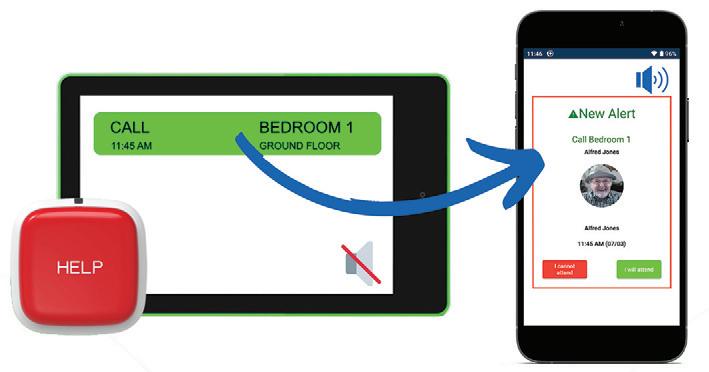
Fall Savers®, are an experienced market leading healthcare provider of resident safety solutions for over 15 years.
FALL SAVERS ® WIRELESS MONITOR
Eliminate all cables with our new generation falls management solutions!
Upgrade your falls programme with the latest technology from Fall Savers®. The NEW Fall Savers® Wireless eliminates the cord between the monitor and sensor pad. This results in less work for nursing staff, improved safety for patients and reduced wear and tear on sensor pads. Wireless advantages include the ability to use one monitor with two sensor pads simultaneously and support for many new wireless devices. BENEFITS INCLUDE:
Safer for patients; less work for staff
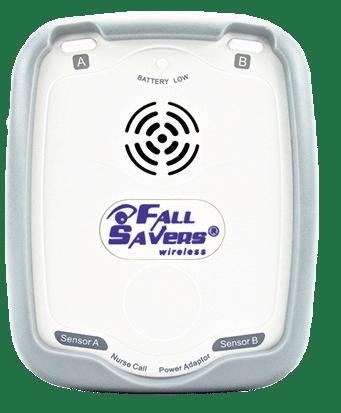
Bed and chair pads available
One monitor works with two sensor pads
Integrates with most nurse call systems
A variety of options, including: Call button
sensor mat Wireless door/window exit alerts TREADNOUGHT ®FLOOR SENSOR PAD
The TreadNought® Floor Sensor Pad is built to last with a durable construction that far out lasts the competition. Our anti-bacterial floor sensor pad is compatible with most nurse call systems or can be used with a portable pager to sound an alert when a person steps on to the sensor pad. Caregivers typically place the sensor
pad at the bedside, in a doorway or other locations to monitor persons at risk for falls or wandering. An optional anti-slip mesh reduces the potential for slippage on hard surface floors.
FEATURES INCLUDE:
Connects directly to most nurse call systems
High Quality anti-bacterial Floor Sensor Pad
Large Size Pad: Measures (L) 91cm x (H) 61cm
Options (sold separately): Anti-slip mesh for hard surface floors

See the advert on this page for further details or visit www.fallsavers.co.uk.
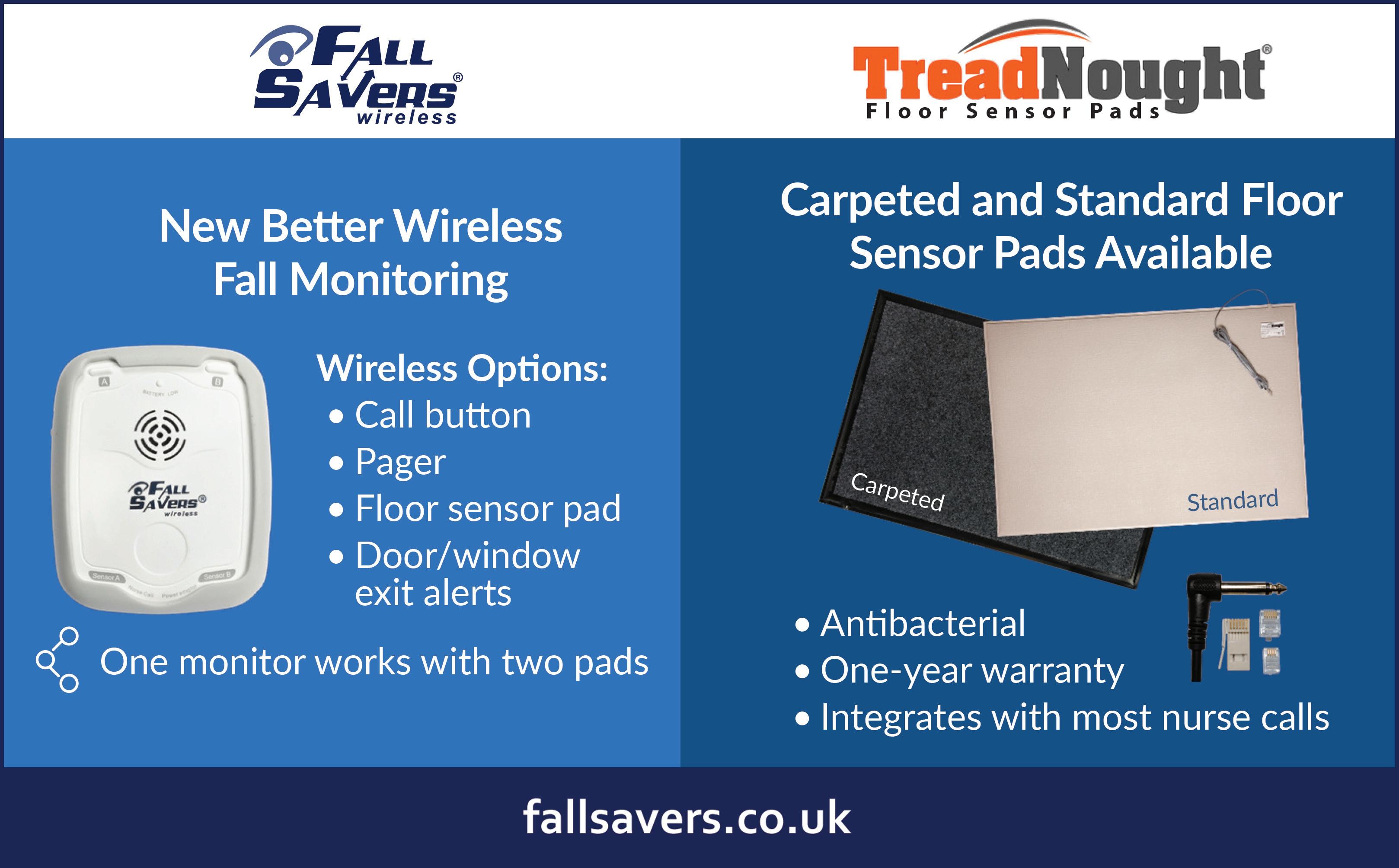
Falls are a significant concern for vulnerable individuals, especially seniors and patients at risk. Medpage, a leader in assistive technology, offers a range of cuttingedge products designed to enhance safety and provide peace of mind for caregivers and families. Here’s an in-depth look at some of their standout solutions:
MPRCG1 (2023) BED LEAVING DETECTION ALARM WITH CAREGIVER RADIO PAGER
The MPRCG1 is a comprehensive system tailored for fall prevention in domestic, commercial, and NHS care settings. This all-inclusive kit includes a bed pressure mat sensor, a BTX21-MP alarm sensor transmitter, and an MP-PAG31 radio pager. The system is designed to alert caregivers when a patient leaves their bed, reducing the risk of falls. Key features include:
Wireless Alerts: Notifications are sent to the caregiver’s pager via tone or vibration.
Customizable Alarm Delays: Options for instant, 15-minute, or 30-minute delays.
Durable Design: Antimicrobial and disinfectant-resistant materials ensure longevity.
• Ease of Use: Minimal installation required, making it user-friendly and portable.
HDKMB2 HOSPITAL DISCHARGE KIT FOR FALLS RISK PATIENTS
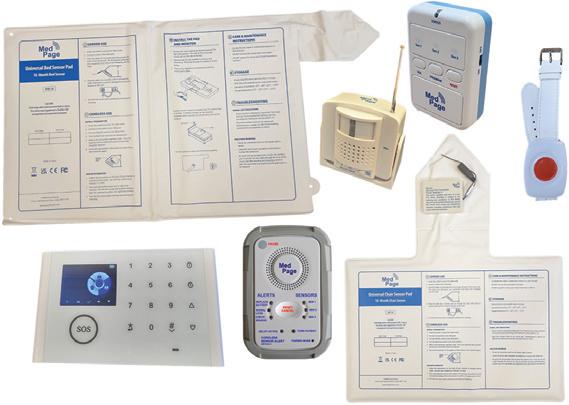
monitoring capabilities of healthcare facilities. Its versatility makes it a valuable addition to any care environment, ensuring timely responses to patient needs.
RON-WC2 WATERPROOF DISABLED PULL CORD ALARM TRANSMITTER WITH WIRELESS ALARM RECEIVER
The RON-WC2 is a robust solution for disabled individuals requiring immediate assistance. This waterproof pull cord alarm is ideal for use in bathrooms and other high-risk areas. Paired with a wireless alarm receiver, it ensures that help is just a pull away.
Features include:
Waterproof Design: Suitable for wet environments.
Wireless Connectivity: Reliable transmission to the alarm receiver.
Ease of Installation: Simple setup for quick deployment.
WHY CHOOSE MEDPAGE?
Medpage’s commitment to innovation and quality is evident in their product range. Each solution is designed with the user’s safety and convenience in mind, making them a trusted choice for caregivers and healthcare providers alike.
The HDKMB2 is a thoughtfully curated kit aimed at supporting patients transitioning from hospital to home care. It includes essential tools to mitigate fall risks and promote recovery. This kit is ideal for caregivers seeking a comprehensive solution to enhance patient safety during the critical post-discharge period.
CMEX-21 MULTI-PORT WIRELESS SENSOR INPUT EXPANDER FOR NURSE CALL CONNECTION
The CMEX-21 is Medpage’s latest innovation, designed to integrate seamlessly with existing nurse call systems. This multi-port expander allows for the connection of multiple wireless sensors, enhancing the
By investing in these advanced fall prevention tools, families and facilities can create safer environments for those at risk. Medpage continues to lead the way in providing practical, reliable solutions that make a real difference.
For more information, visit Medpage’s official website or contact their team to explore these products further. Safety starts with the right tools, and Medpage delivers just that. www.easylinkuk.co.uk
T: 01536 264 869
Courtney Thorne, a long-standing innovator in healthcare communication systems, is setting new standards in the care home sector with its advanced wireless nurse call technology—designed to improve resident safety, enhance staff efficiency, and support a more responsive care environment.
With over 30 years of experience serving the UK healthcare market, Courtney Thorne’s systems are now trusted by thousands of care homes nationwide. Unlike traditional hardwired solutions, their wireless nurse call systems offer non-invasive installation, scalability, and smart analytics—making them ideal for both new builds and retrofit projects.
“At the heart of our technology is the belief that better communication leads to better care,” says Graham Vickrage, Managing Director at Courtney Thorne. “Our wireless systems not only reduce response times but also empower staff
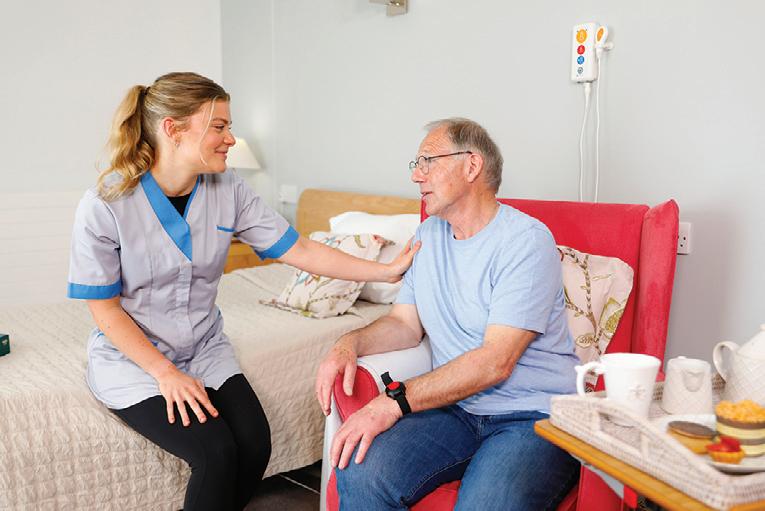
with the tools they need to deliver safe, person-centred care.”
Care providers are increasingly choosing wireless systems for their flexibility, reliability, and cost-effectiveness. With a full suite of accessories—including neck pendants, door monitors, fall detection, and bed sensors—Courtney Thorne systems can be tailored to meet the specific needs of each home and resident.
In an industry where compliance, safety, and staff pressures are always front of mind, Courtney Thorne provides more than just products—they offer ongoing support, training, and a commitment to innovation that helps care homes futureproof their operations.
For more information or to book a free demo, visit www.c-t.co.uk or contact info@c-t.co.uk.

Adult social care is changing fast. Across England, providers are swapping paper and patched-together systems for complete digital records, in step with the government’s Digitising Social Care programme.
Primera Healthcare, which supports people at home in Birmingham and London, has moved early and decisively.
The team started 2025 by upgrading their older care system to Allin-one PASS, adding digital care planning, rostering and finance tools so that every part of the service now sits under a single platform.
The switch felt less like a software update and more like turning on the lights. Travel times, staff skills and visit continuity now feed automatically into the rota, so late or missed calls are spotted and fixed before they become problems.

Medication notes flow straight into electronic MAR charts, and live GPS data shows managers exactly where carers are, cutting the need for frantic phone calls on busy shifts.
Most striking of all is GP Connect. With one tap, authorised staff can see up-to-date diagnoses and prescriptions, saving time and keeping visits focused on the person rather than the paperwork.
“The transition was seamless,” says Shaelene Dewar, Quality Assurance Auditor. “The journal view gives us a live window on the whole business, and the Data Creation Team at PASS built our new forms in record time. GP Connect is brilliant. Reliable information in seconds, and the new charts help us spot patterns we never saw before.”
3. ENHANCED MONITORING
many care settings, the impact it can have is huge.
Here’s a closer look at why AI is set to make waves in social care:
1. BOOSTING EFFICIENCY
AI can help handle those resource-draining tasks in seconds. Whether it’s crunching a mountain of data, summarising care notes, or suggesting next steps, it frees up your team to do what they do best.
It can also improve communication, such as helping new team members quickly access policies or answer routine questions without waiting for assistance. By handling these background tasks, AI allows organisations to redirect resources to other core priorities.
2. ENSURING PERSON-CENTRED CARE
AI can support your teams when providing persona-centred care by analysing data over time, so they can build tailored plans that align with each individual’s goals, preferences, and abilities. It can even predict future needs, flagging issues before they arise so your team can act proactively.
Care organisations often operate round-the-clock, and AI can offer real-time monitoring to support this. For example, AI can highlight subtle behavioural changes, like someone sleeping poorly or becoming more withdrawn. These insights can alert your teams to potential concerns early, which means better, faster decisions can be made to support your clients.
For organisations, this level of tracking ensures care quality stays high, without adding to the workload. It’s like having an extra layer of support that’s always on duty.
4. EMPOWERING TEAMS
AI is here to help empower your care teams, not replace them. AI tools can provide instant recommendations or resources, which could help your newer employees confidently manage unexpected situations. Similarly, AI can assist with summarising care notes or giving quick access to up-to-date best practices, helping your teams provide the high-quality care they work so hard to deliver.
5. OPTIMISING COSTS
One of the big wins of AI is its ability to do more with less. By automating tasks and making resource allocation more efficient, it
Those changes have delivered quick, concrete gains. Oversight is tighter, risk is lower, and staff spend more minutes each day with the people they support.
Everything is logged, time-stamped and ready for inspection, which reassures families and pleases regulators.
As everyLIFE Technologies marks ten years of PASS, Primera’s experience shows what the next decade can look like when digital tools are placed at the heart of care.
Good care can always get better, and better starts with digital.
Ready to explore your own next step? Visit www.everylifetechnologies.com or call the everyLIFE team to see how PASS can help your service.
can help organisations manage tight budgets without compromising on care.
AI can even help reduce staff turnover by easing workload pressures, which means savings on recruitment and training costs too. Plus, because AI solutions are scalable, it can adapt to your organisation's needs.

AI in social care isn’t about replacing people with tech. It’s about giving your teams the time, insights, and tools they need to focus on the people they care for. That’s why OneAdvanced AI, the first UK hosted fully secure, private AI tool for businesses, was created. OneAdvanced AI can help care providers improve efficiency, deliver person-centred care, and empower teams, all while safeguarding your data. This marks a significant step towards a more innovative and sustainable future in social care.
Find out more at: www.oneadvanced.com/ai
See the advert on the back cover of this issue for further info.




People with dementia can enjoy productive and rewarding working lives in the digital era, contrary to the widespread stereotype that dementia is incompatible with the use of modern technology, according to new research from the University of Bath.
The study - Working lives with dementia: A digital futures perspective – argues that the digital revolution risks exacerbating inequalities amongst those with diverse needs but that organisations can and should develop, adapt and deploy digital technology and the working environment to help those with dementia to continue in employment.
“The bottom line is that we have an ageing population and workforce in which dementia will feature and which should, and can be, accommodated by the judicious use of digital technology and adapting working conditions. The reality is, this is not dealt with in any meaningful way right now – there are very rarely strategies in place,” said Dr James Fletcher of the University of Bath School of Management.
“There is widespread prejudice that those with dementia cannot cope with, or benefit from, digital technology, and they often get bundled into the same category as the oldest people. But it’s worth putting some perspective on this – an experienced 60-year-old employee with early stage dementia will have grown up through the digital, internet and social media revolutions – and with the right support, they will still have much to offer,” Dr Fletcher said.
The study was published as the UK government announced its welfare reform plans, part of which is to encourage more disabled people into work. Dr Fletcher said he hoped the research could be a useful example of the prospects and challenges of fulfilling that goal.
Dr Fletcher noted that quite simple adjustments to the working environment, such as improving workstation lighting, using appropriate fonts and colour schemes, and providing workers with calendars, voice activated controls, and automatic reminders could make a big difference for somebody diagnosed with dementia.
“And AI offers really interesting opportunities – it is superb at solving many of the problems faced by those with dementia, such as finding words, organising text and putting words in the right sequence. Couple that with the potential offered by hybrid working for those with dementia, and you can see the benefits for both employees and companies,” he said.
Dr Fletcher and his co-researcher Dr Olivia Brown argue that dementia is not inherently disabling and that its impact depends heavily on the environment and surroundings in which an employee is operating. Employers might consider, for example, that an employee with dementia may be able to access a building with a swipe card but may be foiled if access relies on codes that they have to remember.
“We need to approach this in the way we already respond to people with diverse needs, which is already familiar to most employees. Also, there is a misplaced tendency to see a dementia diagnosis in black and white terms when the reality is, the effects can vary day-to-day and hour-to-hour depending on environment and relationships,” Dr Brown said.
Dr Fletcher said that employees could suffer tremendous stress from a dementia diagnosis and disclosing this to their employer, with some developing strategies to conceal their condition. He said that, while we lack good statistics, it appears that the ‘vast majority’ of those diagnosed with dementia go into unemployment, often unwillingly.
“There are many who could stay in the workforce and don’t. And this is not just an issue for older people –growing numbers of younger people are being diagnosed,” he said.
The researchers noted that dementia is often considered to be a post-retirement phenomenon, but estimates suggest that 9% of the 35.6 million people worldwide with dementia are under 65 years of age, with around 370,000 new cases of young onset dementia annually.
Technology is a key part of the CQC’s improvement agenda; especially when it comes to how care services record performance during inspections.
THE PROBLEM
Many care providers want to move away from pen and paper-based audits and spreadsheets, but most software lacks the capability and flexibility to handle the complexity of the CQC requirements and ratings structure – leading to gaps in oversight and accountability.
THE SOLUTION
Drawing on our experience providing CQC improvement support, we developed an easy-to-use care audit platform designed to help care providers stay on top of their compliance obligations with the user in mind and the CQC framework at its core.
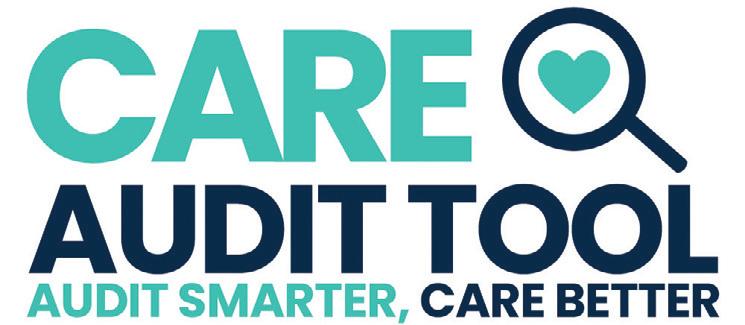
Our Enterprise Care Audit Tool enables care providers to improve oversight and respond to CQC requirements with confidence — delivering greater visibility, accountability, and control.
Now, we’ve made that same expertise and capability more accessible.
Our new cloud-based version is built on the same trusted foundation, giving providers of all sizes a faster, more flexible way to manage compliance with ease.
KEY FEATURES
• CQC-Aligned Dashboard - View audit outcomes and actions against CQC rating thresholds, with drill-down visibility for full organisational oversight.
• 100+ Ready-to-Use Audits - Covering all core operational areas including Care, Health & Safety, Estates, Catering, HR, and more.
• 2,000+ Question Library - Choose from a comprehensive library of questions, each aligned to statutory regulations and the CQC inspection framework.
• Automated Action Management - Audit outcomes that require follow-up are automatically fed into the dashboard and actions portal for clear accountability and tracking.
Reporting - Access a suite of structured reports to support internal reviews and inspection readiness.
• Engagement Surveys - Collect feedback from staff, service users, and relatives
STRESS LESS. TRACK MORE. BE READY.
If you’re spending hours chasing paperwork or stressed about being prepared for any inspection any day
- Care Audit Tool can help.
Website: careaudittool.co.uk
Email: info@careaudittool.co.uk
Phone: 0333 577 0807
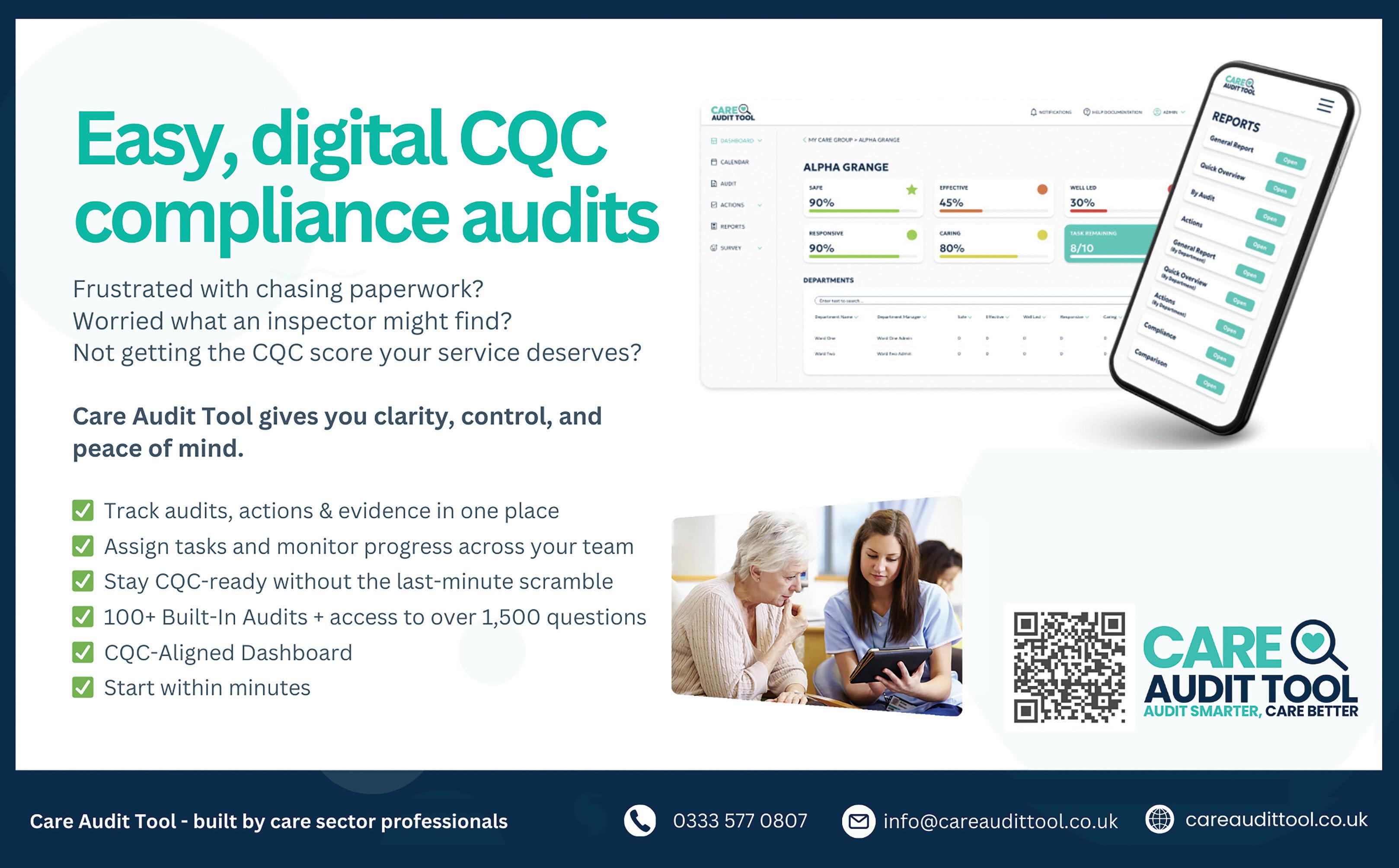
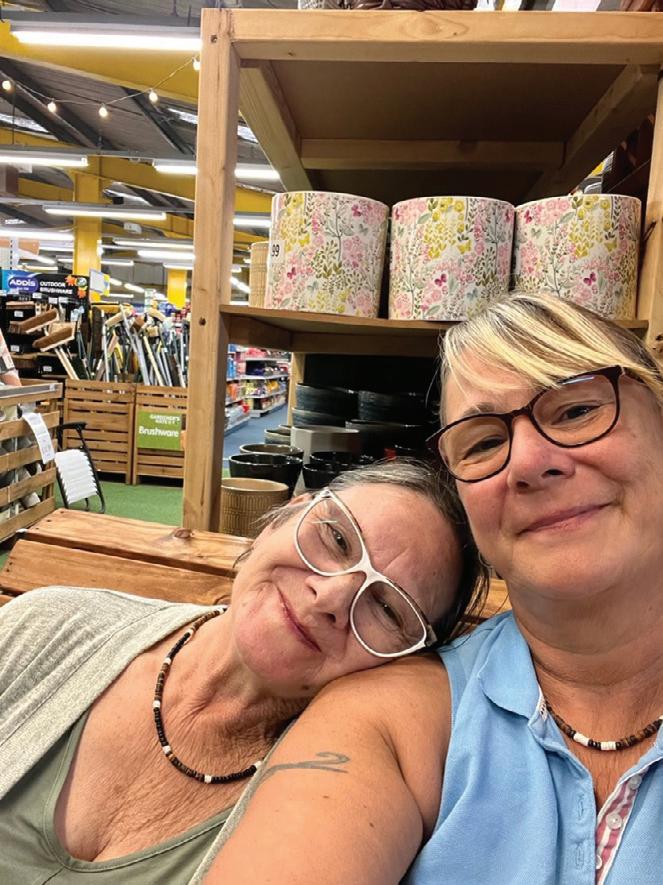
When Sharon’s mum Monica lost her partner and began struggling with her health, Sharon found herself trying to care from a distance—juggling a demanding job in Exeter with near-daily phone calls and constant worry about her mum, who lives alone with her two dogs in Barnstaple, Devon.
“Mum was always independent, but after losing her partner and being told she needed a hip replacement, she became withdrawn and physically frail. I was constantly worried,” said Sharon.
“I’d ring every morning to check she was up, had taken her pills, had something to eat. It was overwhelming.
“She didn’t want a carer. She insisted she didn’t ‘need care.’ But with living over an hour and a half away, I knew I needed to find some kind of support for both of us.”
Sharon learned about new technology being offered by her employer Bluebird Care N.E.W. Devon in partnership with Access Health, Support and Care (HSC), using discreet technology enabled care (TEC) to provide reassurance without intrusion.
The system, Access Assure, uses non-intrusive smart home devices – no cameras, no recordings – just sensors placed around the home to understand daily routines. Movements like opening a cupboard, boiling the kettle, and general mobility patterns are monitored, with alerts sent to family members if anything out of the ordinary occurs or daily living activity patterns change.
For Sharon, the reassurance was instant and the relief had an immediate positive impact on her own wellbeing.
Article supplied by The Access Group
“Suddenly, I wasn’t waking up worried. I knew Mum was up and moving, when the kettle went on, when she’d opened the medicine cupboard. And I knew I’d be alerted if anything changed for Mum.
“It completely changed our dynamic. I could go back to being her daughter again, not just her carer.”
A Bluebird Care N.E.W Devon professional now visits once a week to check the equipment and provide some company.
What started as a technical check-in is now something Sharon’s mum actively enjoys, helping ease the path toward accepting future care, should she need it.
“I didn’t expect technology to bring us closer,” Sharon reflected. “But it has. When I visit now, we go out, we laugh, we just enjoy each other’s company again.”
The smart system behind Sharon’s peace of mind uses AI to learn her mum’s typical routines and flag any irregularities, like missed medication or disrupted sleep, while preserving her Mum’s privacy.
It’s a lifeline that’s helping more families keep loved ones safe at home, without compromising their dignity or sense of autonomy.
“This has been a game changer for us,” Sharon said. “I’d recommend it to anyone.”
William Flint, Director for Bluebird Care N.E.W Devon said: “Using TEC has changed the way we think about care at home. It’s not just about early intervention or risk reduction, it’s about giving families space to reconnect, to be daughters and sons again for example, not just carers.
“It’s a powerful reminder that the right technology, used in the right way, can be deeply human.”
Andy Sparkes, Managing Director for Access TEC, added: “Access Assure is about more than sensors, smart technology, or even an intelligent dashboard that transforms data into meaningful action.
At its core, it’s about reassurance and restoring peace of mind. Families like Sharon’s shouldn’t have to choose between their loved ones living independently and their safety.
“This technology works quietly in the background, empowering individuals to live fulfilling and meaningful lives in the place they choose, while making sure someone’s always on hand if they need that extra layer of support.”
Following stories like Sharon’s, Bluebird Care N.E.W Devon is now preparing to roll out Access Assure across more of its services, bringing the benefits of technology enabled care to families across the region.
PASS by everyLIFE has announced the launch of PASSgenius™, a powerful new suite of data, AI and automation tools built into its award-winning care management software – marking a major step forward in digital innovation for social care.
Designed to turn complex data into clear, actionable insight, PASSgenius™ helps care providers make faster decisions, plan smarter rotas, reduce admin and stay ahead of risk – using the information they already collect.
Commenting on the launch, Robin Batchelor, CEO of PASS by everyLIFE, said: “Care providers are under more pressure than ever. With PASSgenius™, we’re giving them the tools to unlock the power of the data they already hold, helping them make better decisions, deliver safer care and free up time for what really matters.”
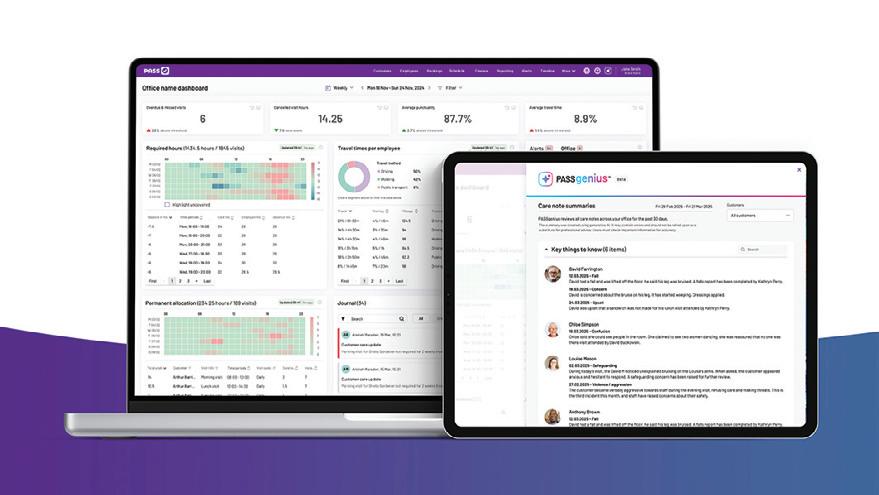
One of the standout features of PASSgenius™ is its AI-powered care note summaries – a tool that can scan weeks of care logs in seconds and highlights key changes in behaviour, health or mobility, helping
teams identify risks earlier and provide more responsive, person-centred support. Instead of reviewing long records manually, users receive concise summaries and recommendations that surface what’s changed and what needs attention, improving both care quality and continuity across shifts. At the heart of the new suite is the PASSgenius™ Dashboard – a fully interactive, customisable dashboard that provides real-time oversight across key performance areas, such as:
• Required hours: Spot gaps in care hours early and plan ahead
• Pending hours: See unassigned visits and fill them faster
• Travel time: Flag long journeys and improve routing
• Punctuality: Track lateness trends and take action sooner
• Cancelled hours: See costly cancellations and reduce repeat offenders
• Missed and overdue visits: Catch missed visits fast and protect care quality
PASSgenius™ is available now at no extra cost to All-in-one PASS users.
To learn more or see PASSgenius™ in action, visit: www.everylifetechnologies.com/passgenius
Under-25s (Generation Z) have much to offer the world of care, especially as it progresses. In a constantly adapting industry, young people are key to helping care companies grow with the times, especially surrounding technology.
However, young people make up only 11% of care workers. Why is this? What is keeping Gen-Z from joining and staying in the world of care?
With the average care worker aged 45 and over a quarter of the workforce potentially choosing retirement in the next 10 years, there aren’t enough young workers to pick up the many mantles left behind. With social care already having the highest number of vacancies in the UK, care providers cannot afford for this number to grow and for their workforces to decrease.
Supporting service users is no 9-5 or Monday to Friday job. This alone can be off-putting to the under-25s, who may juggle education and prioritise a larger social life.
This is what Gen-Z values. They have entered the career world understanding the importance of mental health and their worth in the workplace - and they are often viewed negatively for this. But they couldn’t be more correct.
Just as care services get a bad rep for offering a poor work-life balance, Gen-Z gets a bad rep for prioritising a healthy one. You can see the dilemma. So, how can this be fixed?
Irregular, unsociable hours, poor workload management, and low resources can easily lead to poor staff retention. From the most recent

findings in 2021-2022, care saw a high turnover rate of 53% for those under 20 years old while care workers over 60 had a rate of 24%. It’s common for shift-based workers to feel they have very little control over their working lives, leading them to accommodate the shifts they have no say over. Especially due to last-minute scheduling and changes, many shift workers often must change or completely scrap personal plans - or wait until after shifts are allocated - resulting in lives only revolving around work.
As much as someone can be a work-first individual, removing time
By Becky Mundie, RotaCloud (www.rotacloud.com)
for personal and social lives - and simply downtime - can be damaging in the long run, causing stress and mental health issues. Factor in graveyard shifts or being on-call, and the feeling is greatly exacerbated.
Is there any wonder, when combining this with the high workload and responsibility that comes with care, that the under-25s - the generation valuing mental health - make up so few care workers?
There are simple ways to remedy this, however.
Simply offering flexibility, allowing staff to have a say in the days and hours they work, and offering the ability to oversee shifts further in advance, can make all the difference.
Implementing digital automation allows staff to feel more in control of their work and lives. This alone can greatly improve employee experience.
Surprisingly, employee experience can go hand-in-hand with updated technology - and what goes hand-in-hand with technology? The generation that has grown up with it.
Not only does digital automation benefit your service users, employees, and overall business growth, but it will also make your workplace more attractive to the new generation - who, once joining, can make adopting these new technologies and processes all the smoother. Under-25s are the future, as well as new technologies. It’s time to start investing in both.
For further information on RotaCloud, please see facing page.

By Elena Martin, Director of Operations and Commissioning, Langdale Care
Homes Group (www.langdalecarehomes.co.uk)
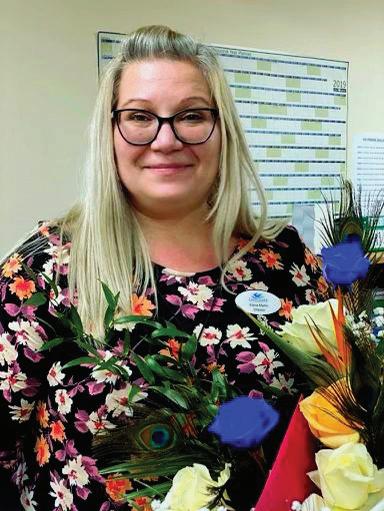
In the ever-evolving landscape of adult social care, it is essential to ensure that training initiatives not only equip care professionals with the necessary knowledge and skills but also nurture an environment where they feel confident and supported to deliver their best.
As a Registered General Nurse with over two decades of experience in the care industry, I have seen first-hand how thoughtfully designed training programmes can bring about meaningful changes that resonate with both staff and residents. These programmes, when aligned with the real-world needs of care professionals, have the power to transform not only the quality of care but also the overall morale and satisfaction within the care setting.
One of the key features of impactful training is its accessibility, relevance, and applicability to the challenges faced by care staff on a daily basis. From comprehensive first aid instruction to specialised courses on dementia care, well-designed training modules can provide care professionals with the tools and techniques required to respond effectively to a variety of situations. By prioritising the development of our staff's clinical proficiency, we enable them to deliver high-quality, person-centred care that focuses on the well-being and dignity of residents.
However, building confidence and capability goes beyond technical skills alone. It is equally vital to focus on the interpersonal skills that underpin meaningful relationships with residents and contribute to their overall happiness and fulfilment. Training programmes that emphasise relational care, for instance, can help care staff appreciate the importance of creating an atmosphere of trust and understanding. By encouraging
staff to focus on these human aspects of care, we cultivate a setting that radiates warmth and kindness, ensuring that residents feel valued and respected.
Moreover, to ensure that staff can consistently provide the best possible care, our training must remain adaptable and responsive to emerging trends and best practices in the sector. By implementing regular refresher courses, we reinforce foundational knowledge, address any skill gaps, and ensure that care professionals are up to date with the latest advancements. Similarly, ongoing supervision and performance evaluations play a vital role in identifying opportunities for professional growth, creating a framework of accountability and continuous development. This commitment to lifelong learning not only enhances the quality of care but also reinforces a sense of purpose and pride among staff.
The ripple effect of robust training programmes extends far beyond individual care professionals. When staff feel confident, valued, and well-equipped, they are better positioned to deliver exceptional care that is tailored to the unique needs and preferences of each resident. This, in turn, results in improved well-being for residents, greater peace of mind for their families, and stronger outcomes for the care community as a whole.
At the core of our training philosophy lies the understanding that empowered staff lead to empowered residents. When care professionals are equipped with the knowledge, skills, and assurance to excel in their roles, they are better able to encourage residents to maintain their independence, involve them in decisionmaking, and take the time to truly listen to their stories and concerns.
In conclusion, aligning training with the practical needs of both staff and residents goes far beyond fulfilling regulatory requirements—it is the foundation for fostering confidence, compassion, and excellence in adult social care. As we look ahead to the challenges and opportunities of the future, let us remain steadfast in our commitment to investing in our staff, enabling them to make a lasting difference in the lives of those they care for.
In today’s care home environment, staff training is under constant pressure. Limited time, tight budgets, and high workloads mean traditional training methods often struggle to keep up. Yet, with complex conditions like diabetes affecting up to one in four residents, there’s never been a greater need for effective, accessible learning.
Game-based learning (GBL) offers a powerful way forward. Whether through board games, card games, or digital tools, GBL turns essential training topics into engaging, memorable learning experiences that fit seamlessly into busy care home routines. It’s proven to boost knowledge retention, spark discussion, and improve practical understanding.

Focus Games (www.focusgames.com) leads the way in this space, with a wide range of evidence-based games developed for health and social care. Their innovative Virtual Care Home is a standout example—a digital environment where staff can explore realistic care scenarios, click on hotspots, and practise deci-
Do you want to provide Gold Standard end of life care in your Care Home?
Sign up to our Training & Accreditation Programme today and receive 50% Off! (Limited-Time Offer)

Offer Includes:
8 live interactive webinars over 6 months, led by a clinical team
Ongoing support and access to the GSF Member’s Area
GSF Accreditation, enhancing your CQC rating and setting your care home apart
Next Steps:
Autumn training begins 10 September – secure your place today by scanning the QR code below. th Use discount code: GSFCarer25 to get the full programme for £1,095 + VAT
Everyone deserves Gold Standard end of life care.


sion-making in a safe, simulated setting. From managing blood glucose to identifying signs of hypoglycaemia, staff gain confidence in handling real-world challenges. All on their pc or smart pnone!
Best of all, these ready-to-use resources are designed to be flexible. Maximising every learning opportunity. With options tailored to your setting, including customisable content and multi-modal learning styles, there's a solution for every home. In a sector facing increasing demands, GBL offers a costeffective, forward-thinking way to build skills and confidence. Whether you're new to game-based learning or ready to take it further, now’s the time to explore the difference it can make. To discuss our virtual care home resource contact info@focusgames.com.
See our cover advert for a special discount code to get started today. Visit www.focusgames.com

As our population ages, the need for compassionate, high-quality end of life care is more pressing than ever. The Gold Standards Framework (GSF)
Charity is helping to meet this challenge by supporting health and social care teams to deliver care that truly makes a difference.
Through its nationally recognised Service Improvement Programme, GSF equips staff with the skills, confidence, and structure to provide proactive, person-centred end of life care. The results speak for themselves: 97% of organisations report better experiences for residents and families.
GSF Accreditation is more than recognition - it’s a mark of quality that is CQC-recognised, sectorendorsed, and impactful across entire organisations.
Whether you're in a care home, GP practice, hospital, or community service, GSF helps embed a culture of dignity, compassion, and coordinated care. Hundreds of organisations have already joined the GSF community, raising the standard of care for those nearing the end of life.
Find out how your team can get involved at: www.goldstandardsframework.org.uk
Future-proof your care. Empower your workforce. Everyone deserves Gold Standard end of life care.

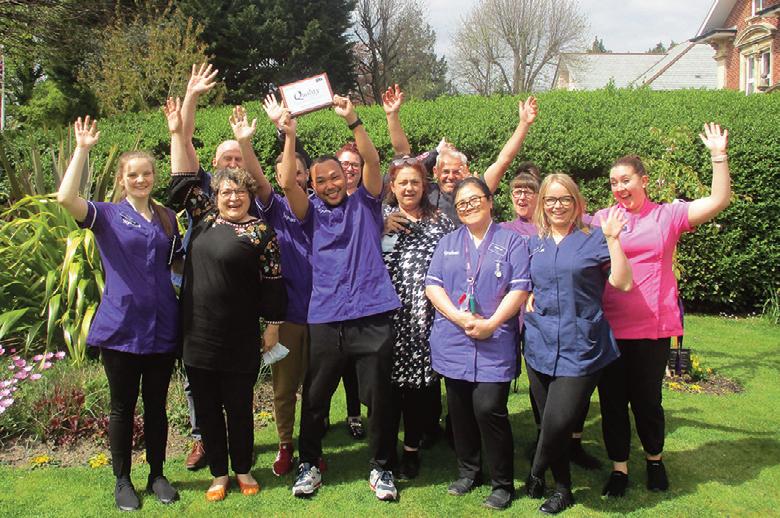
Cyber security is an increasing concern in social care, with data breaches, phishing scams, and cyber attacks putting sensitive information and essential services at risk. However, learning about cyber security can often feel overwhelming, full of jargon, and difficult to apply to everyday situations. That’s where the Digital Care Hub’s new Cyber Game comes in—an engaging, interactive way for adult social care providers to learn vital cyber security skills.
Learning doesn’t have to be dull. In social care, where training is essential but time is scarce, gamification—using game-like elements such as quizzes, rewards, and interactive challenges—makes learning more engaging and memorable. It provides a safe space to learn and make mistakes, increasing engagement, motivation, and knowledge retention. Gamification also allows for instant feedback and supports long-term behaviour change, making it an effective tool for cyber security training.
The Digital Care Hub has launched the first-ever Cyber Game designed specifically for adult social care providers. It offers a fun and practical way to learn about cyber security and data protection, helping care managers, care workers, and other staff members develop the skills they need to keep their organisation safe.
The Cyber Game takes players through real-world scenarios relevant
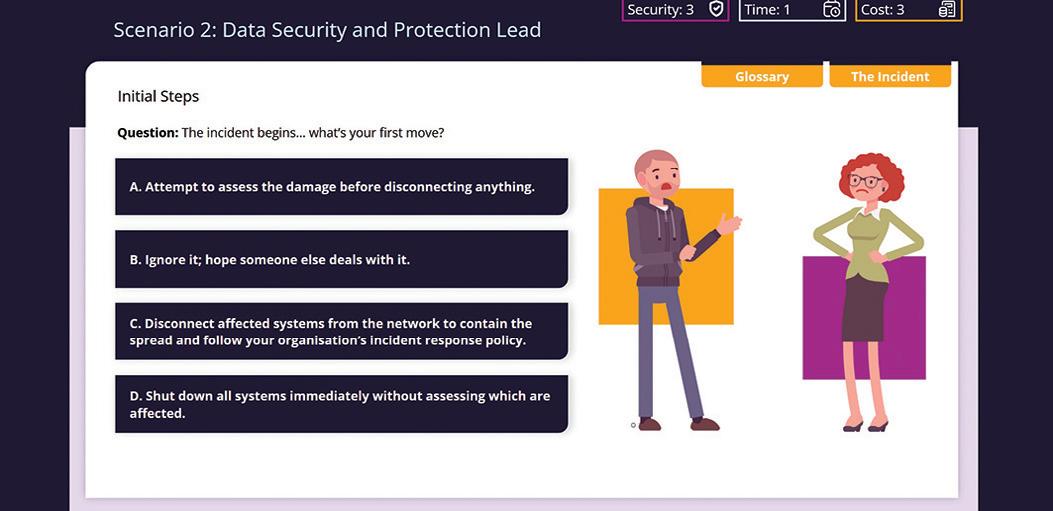
to social care settings, making it easier to recognise and respond to cyber risks in a safe environment. Whether it’s identifying a phishing email, ensuring secure data sharing, or responding to a cyber incident, players gain hands-on experience that translates directly to their work environment.
One of the biggest challenges in cyber security training is making it relatable. The Cyber Game brings cyber risks to life through realistic characters and workplace situations. Players can take on the role of a registered manager, a data protection lead, or a care worker, each facing different cyber threats.
Each scenario is based on real cyber incidents that have affected
The delivery of safe care is the paramount responsibility of social care providers. Central to achieving this is the governance framework adopted by service providers. And at the core of this framework are policies and procedures. These enable the provider to comply – and evidence compliance – with relevant legislation and regulations, as well as facilitating best practices, supporting business needs, and assisting in recognising and managing risks.
Providers have a legal duty of care to the people they employ. Policies and procedures should provide clear guidelines to staff on how the organisation operates, as well as informing them of best practices and processes to be followed.
Policies should be reviewed annually as a minimum to ensure they are still fit for purpose and align with legal and regulatory requirements. They should be reviewed not only by employees of the business, but also by experts in various subject matters (e.g., infection control or medicines management).
For many small- to medium-sized providers, there may not be the in-house skills, knowledge, and experience to complete such a robust annual review. Many choose instead to purchase their policies and
social care providers. The goal is to manage the crisis effectively—containing the damage, notifying the right people, and implementing steps to prevent future incidents. Decisions impact security, time, and cost, requiring players to balance risk and consequences.
WHY GAMIFY CYBER SECURITY TRAINING?
Daniel O’Shaughnessy, from the Digital Care Hub, explains:
“We created the Cyber Game to make cyber security training more accessible and engaging. Gamification encourages active participation and helps staff retain information better, making learning feel rewarding and practical.”
WHAT CARE STAFF SAY
Care staff who tested the game found the scenarios helpful and realistic:
“These are good scenarios – typical and indicative of what may occur and give people an idea of what they need to be thinking about.”
Through interactive decision-making, players experience the consequences of their choices, reinforcing key lessons in a way that traditional training cannot.
TRY THE CYBER GAME TODAY!
The Cyber Game is available online, completely free to play. It’s a great way for care providers to improve their cyber security awareness in an engaging and practical way.
Play the game online at: www.digitalcarehub.co.uk/cyber-game
procedures from a reputable provider like W&P Compliance & Training, who will also complete reviews and ensure their policies and procedures remain up to date. This way a provider not only ensures they remain compliant; they also benefit from best practice policies and procedures that provide a solid foundation for safe working practices and – ultimately – protect and support service users and staff.
Ben Erskine – Director at W&P Compliance & Training www.wandptraining.co.uk | Tel: 01305 767104

See the advert on page

By Satya Cashman, Partnerships Manager for national charity Dementia Carers Count
Here at Dementia Carers Count we’re supporting professional carers, looking after increasing numbers of people with dementia. Day in, day out, we provide emotional advice and practical support to family carers, as they cope with the challenges of dementia care. Those challenges don’t stop when a loved one moves to a care home. They change. And what many families tell us is, they would like better support from the professional carers they meet.
In fact, of the 1,300 family dementia carers who responded to our 2023 survey, only one third agreed that paid carers understood their needs. This is worrying, given the best possible person-centred care is only possible through working in partnership with families
With estimates of the number of professional carers receiving dementia training as low as 29%1, it could be that some carers just don’t have the training or practical experience to support families well. But most care homes invest in regular dementia training, and a host of other professional requirements. Despite this, many families are not confident about paid carers’ understanding of dementia. Only around a quarter (27%) of our 2024 survey respondents said that paid carers had a ‘good understanding of dementia and dementia care2
So, what could you do differently to ensure your busy, committed and hard-working team have everything they need to support residents and families with the care and compassion you’d want?
Well, whilst you’re busy arranging shift patterns, cover, inspections,
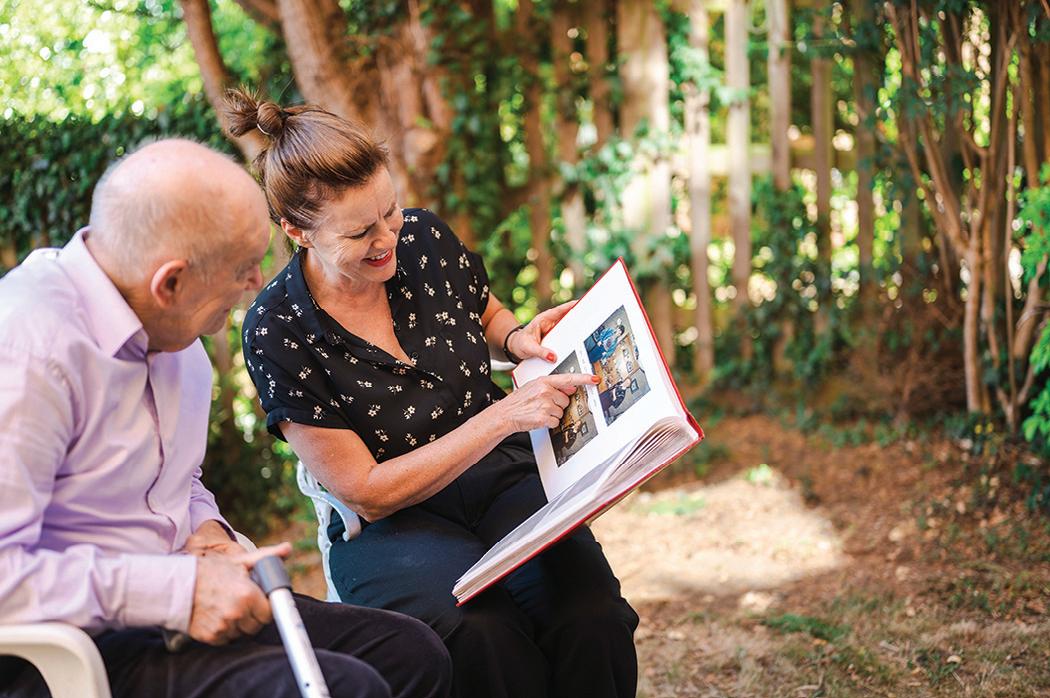
visits and the rest, it’s easy to overlook problems with the current basic training model:
1. Dementia has so many presentations, and no one prognosis, affecting every person differently. To provide high-quality, person-centred care for people with dementia, you need a wide range of knowledge from a broad practice base.
2. Staff churn is challenging for any care business. But all too often, staff
move on because they don't feel confident or supported by low-quality training, when they do face those challenging situations.
3. It’s tough getting carers together for a whole or half day of training. Arranging shift patterns and cover, transport from other sites, or managing sickness and emergencies.
At Dementia Carers Count, we understand the pressures you face and the genuine commitment you have to your residents. As a dedicated charity, our mission is to improve support for anyone caring for someone with dementia. That’s why we’ve developed short, regular interventions, delivered live by trainers with experience and insight, to help your staff understand all the dimensions of expert dementia care for your clients and their families.
Our 90-minute format minimises disruption to your schedules, while maximising learning outcomes. These focused sessions share genuinely useful knowledge in an accessible and engaging way. And as all our CPD accredited training comes from years of experience supporting carers, you can feel confident you’re your staff will learn from the very best. What’s more, proceeds from our training go to our work for family carers across the UK. When you work with us, you're supporting your team and your local community.
To speak to Satya and find out more about training – visit www.dementiacarers.org.uk/what-we-do/dementia-training
A host of health and social care courses delivered by leading training provider Realise have received the new Quality Assurance Care Learning Services (QACLS) endorsement.
The Department of Health and Social Care (DHSC) has taken on responsibility for reviewing the quality of individual courses and qualifications delivered by training providers within the sector.
Realise submitted 11 of its health and social care
programmes to be quality assured – and all received the stamp of approval, including the Level 2 Adult Social Care Certificate.
Funding for health and social care qualifications is now provided through the Government’s Learning and Development Support Scheme (LDSS), which has replaced the Workforce Development Fund.
From April this year, only courses and qualifications delivered by training providers that have been
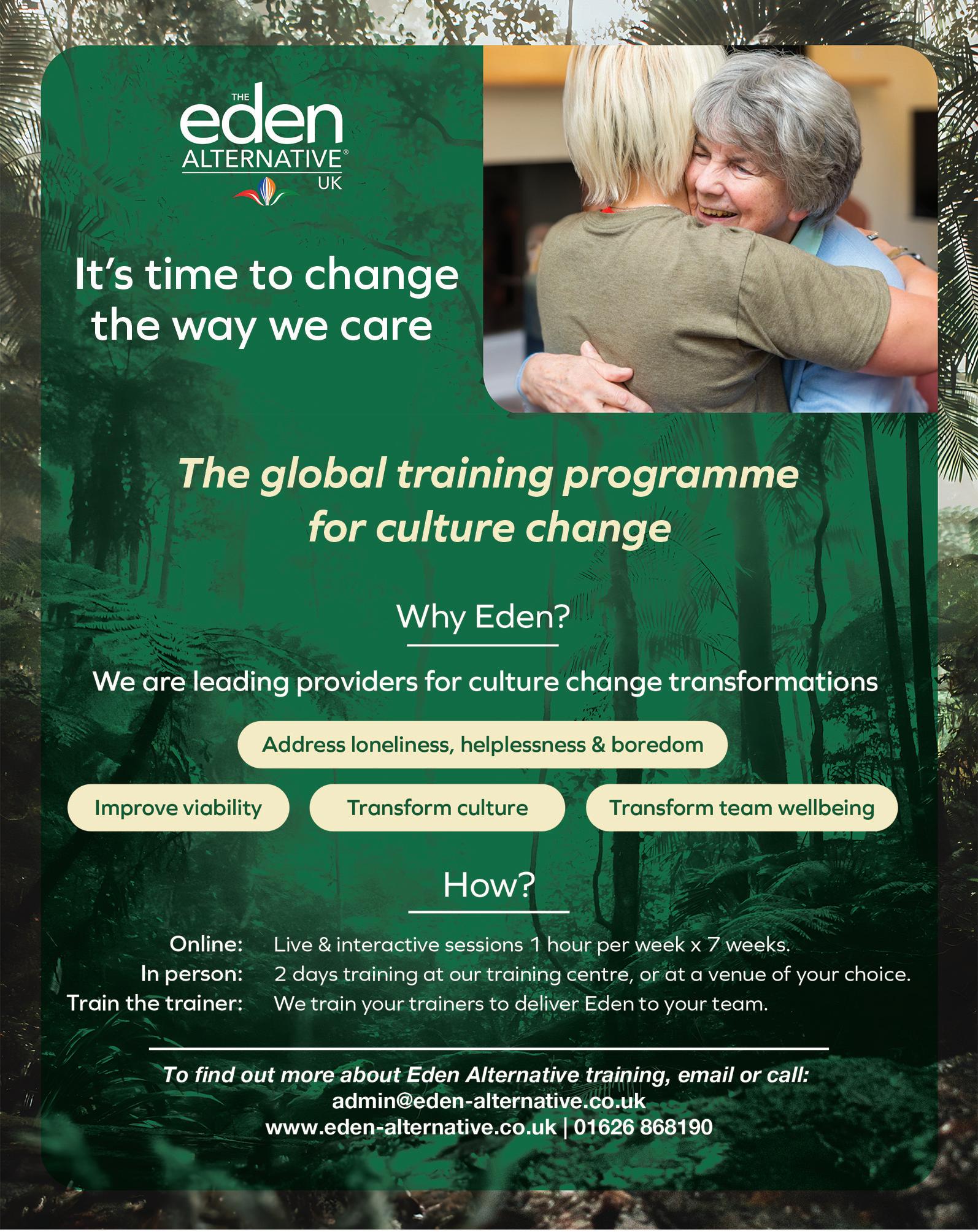
QACLS endorsed will be identified as preferred options by LDSS.
And from next year onwards, employers will only be able to claim LDSS funding for courses that have been quality assured.
Care providers currently have to replace almost a third of their workers each year due to staff leaving their jobs. This high turnover has a negative impact on the quality of care - and the DHSC hopes the QACLS endorsement will help boost retention.

Lesley O’Connor, Head of Strategic Development at Realise, said: “We are absolutely delighted to be one of the first training providers to achieve endorsements across a wide range of courses.
“This new system marks a step-change for the industry as it means, for the first time, individual courses are being reviewed rather than the training provider as a whole in an attempt to drive up standards.
“The approval process was thorough, looking at evidence of quality of delivery, testimonials, achievement rates and policies.
“Being QACLS endorsed is very important as it demonstrates quality and also allows employers to continue to claim LDSS funding. Soon employers will have to pay the full price for programmes that are not endorsed.
“We look forward to working with employers who
"23 years, operating 4 Devon Nursing homes, has been pretty tough, as anyone in social care, knows, only too well. And if it was hard already, after 2024 budget, it's just got harder.
Anyway, at heart, I am just customer of Eden Alternative, and it was a stroke of luck to come across this whilst on holiday in New Zealand in 2009. It started in USA in 1994 and now runs in 22 countries.
The fact that I am now involved with this not-forprofit organisation (in the UK area) came about when one of the 2 main UK directors died suddenly just before Covid. But it's something I have run with for 11 years to help make 'vision' a reality, not a struggle. So, being both a customer and helping the admin seems quite natural.
It is a modern philosophy of care, but moreover, it's
can benefit from quality assured training.”
The QACLS endorsement lasts for three years, with regular monitoring every six to nine months.
Realise will strive to have all its health and social care programmes approved through QACLS during phase two and three of the process. Phase two runs from now until the end of the 2025-26 financial year, and phase three follows immediately after.
The Government says it is "fully committed to a professional, well supported social care workforce" with learning, development and training that is "of outstanding quality, relevant and accessible".
The full list of Realise’s 11 quality assured courses are: Level 2 Certificate in Understanding Autism, Level 3 Certificate in Understanding Autism, Level 2 Adult Social Care Certificate, Level 2 Certificate in Understanding the Care and Management of Diabetes, Level 2 Certificate in Falls Prevention Awareness, Level 2 Certificate in Understanding Nutrition and Health, Level 3 Diploma in Adult Care, Level 4 Diploma in Adult Care, Level 5 Diploma in Leadership and Management for Adult Care, Level 2 Certificate in Understanding the Safe Handling of Medication in Health and Social Care and Level 2 Certificate in Awareness of Mental Health Problems For more information, visit www.realisetraining.com
a programme that is straight forward, tried and tested for 30 years and really works. Its member care organisations generally become trainers for their own teams, and run it themselves. The programme is run in person over 2-3 days or online 1 hr a wk for 7 weeks. You choose. It addresses loneliness, helplessness and boredom and operates through 10 principles to underpin 7 critical domains of wellbeing.
Moreover, it's effective, transformational and really works. As residents, and team members wellbeing, matter so much , it's a must, in my opinion. Geoffrey Cox Southernhealthcare.co.uk eden-alternative.co.uk"

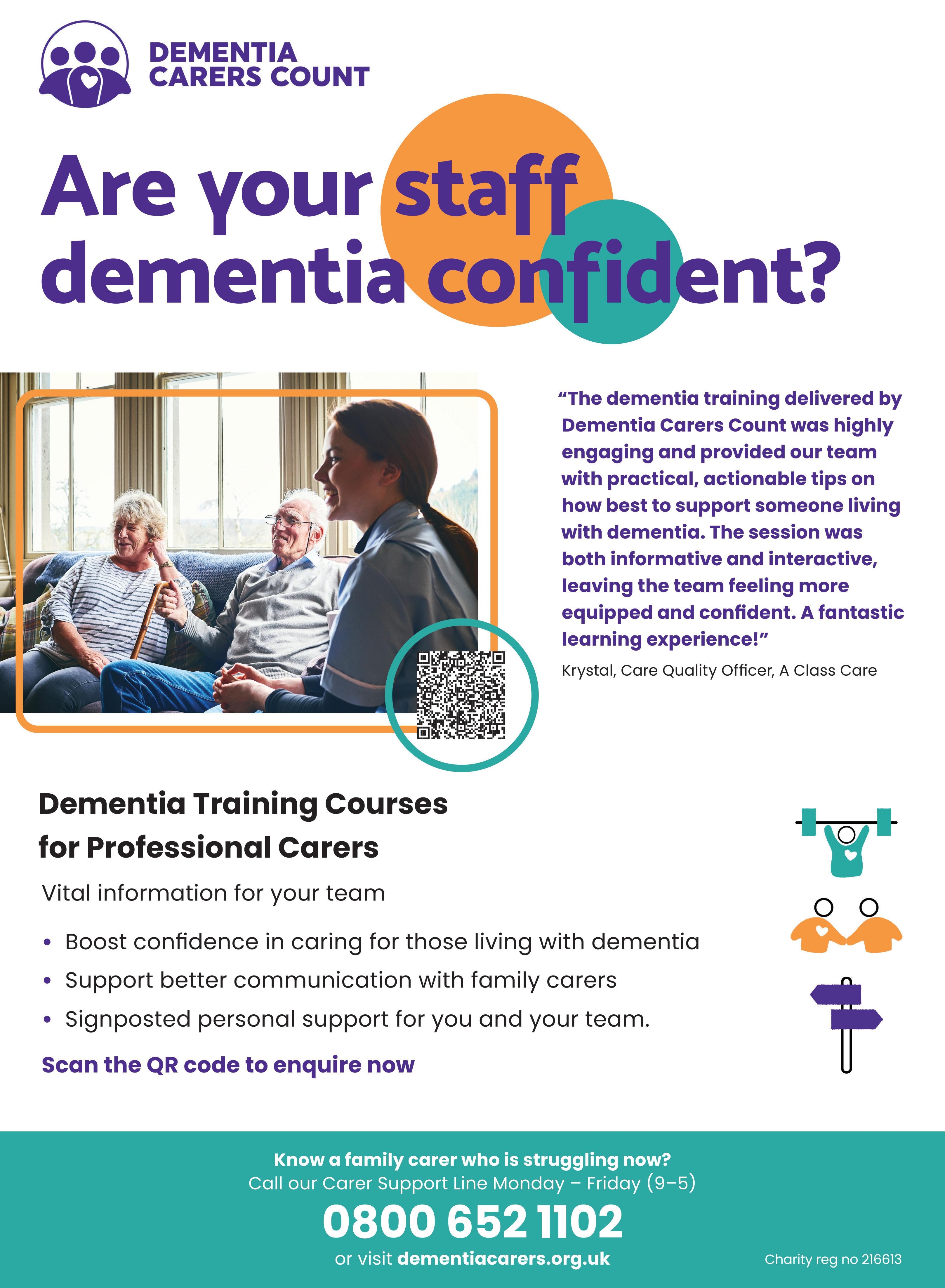

From April 2022, the Health and Care Worker visa route gave UK care providers a desperately needed pipeline to international talent. But with the current Labour Government signalling an end to this route, providers are once again staring into the eye of a workforce storm.
It’s a pivotal moment. The social care sector already faces more than 150,000 vacancies. Labour costs are rising sharply, up to 10% in 2025 alone, driven by increases in the National Living Wage and employer National Insurance contributions. Now, with international recruitment under threat, many operators will see their already narrow options for staffing become even tighter.
Ending the care worker visa route is more than a headline, it has real operational consequences. It’s no secret that providers have leaned heavily on overseas hires to fill roles that remain persistently unattractive to the domestic workforce due to pay, flexibility and public perception.
Cutting off this access will likely drive greater dependence on agency staff, which are not only costly, often commanding 30% premiums, but also disrupt continuity of care and team morale.
Even before this immigration shift, providers were bracing for significant
financial pressure. A typical organisation with a £100m income is already facing £5.5m in additional labour-related costs, including £7m from wage increases and £5m from higher employer NI contributions.
And that’s without factoring in the operational impact of the upcoming Employment Rights Bill. Since April, predictable scheduling, compensation for last-minute changes and stricter zero-hours rules have become mandatory. That means more administrative load, less flexibility and higher staffing costs.
In short, the financial squeeze is very real. And the traditional cost-cutting playbook, reducing staff ratios, asking councils for more funds, or freezing employee benefits, is no longer viable, especially when quality of care and compliance are non-negotiable.
A modern response: smarter operations. So what now?
The good news is that providers aren’t powerless. The most resilient organisations are shifting from reactive crisis management to strategic operational transformation. That means investing in systems that make labour smarter, not just cheaper.
In our latest industry report, we break down how providers are already unlocking significant savings and efficiencies through smarter operations.
Modern shift management platforms, for instance, allow providers to surface open shifts to existing team members quickly, reducing the need to fill gaps with costly agency staff. In one example, agency spend dropped by 38% within four weeks of deploying a new digital scheduling solution.
Additionally, better time tracking tools with geo-fenced clock-ins and payroll integrations have helped providers save up to £4.2m annually by avoiding overpayments and automating manual processes.
Intelligent scheduling systems now also use commissioned hours and
By Abbey Milne, Social Care Lead of Sona (www.getsona.com)
real-time staffing data to avoid both understaffing and costly overstaffing. This has led to 2–5% savings in total labour costs, equivalent to up to £3m for some organisations.
With new compliance demands arriving this year, reducing the administrative burden is critical. Tools that consolidate scheduling, HR and payroll into one workflow can free up hundreds of hours per year, allowing managers to focus on team support and care quality.
This isn’t just about efficiency, it’s about survival. According to a recent Hft and Care England report, a third of providers are now considering exiting the market due to cost pressures and long-term uncertainty. But those who embrace operational transformation stand a chance not just to weather this shift, but to emerge stronger.
At Sona, we help social care providers meet today’s challenges head on, with solutions that drive efficiency, empower teams and elevate care. Advinia, a residential care provider with over 4,000 employees, was spending between £35,000 and £40,000 a week on agency cover. After transforming their internal scheduling strategy, they brought that figure down to £16,000 a week, a change that’s not just financial but operationally transformational.
As leaders, we need to view this moment not just as a policy change but as a call to action. The gap between those who invest in smart systems and those who don’t is widening, and fast. Providers that digitise their operations, empower their teams, and deliver consistently high-quality care will be the ones who thrive in this new era.
While we can’t control the economic landscape, we can control how we adapt. The providers who do so with agility and foresight will help shape the future of social care, not just survive in it.

We are a leading supplier of comprehensive healthcare staffing solutions to care, residential and nursing homes, hospitals, medical facilities and establishments that need person-centred personnel.
By providing staffing solutions that are both cost-effective and highquality, Nexime Healthcare helps with everything that is required. Our extensive database of experienced Support Workers, Carers, Healthcare Assistants and Nurses of various specialities is available to provide highquality care on demand to our clients for:
• One-off shifts, staff absence and shortfalls (often at very short notice),
• Establishing a new unit, whilst permanent staff are recruited,
• Emergency cover during very busy periods,
• Temporary or permanent positions,
• Regular support to full-time teams,
• Contract or SLA (Service Level Agreement) arrangements.
We’re a one-stop, temporary employment business operating nationwide and providing dependable and experienced Nurses, Healthcare Assistants, Carers, Support Workers, domestic and other types of staff.
We are proud of our values, manners, good timing and a friendly ‘can do’ attitude. We’re professional and our clients know that there’s no substitute for our dependability, reliability and our prices.
Owned and managed by people who have years of experience within the healthcare sector, Nexime Healthcare knows what it takes to match the right staff with clients needs. Using our insights into what is required
for each situation, we provide a service with professionals trained for each and every scenario. With access to a broad network of available staff, we can find the right person for the assignment. Nexime Healthcare will make sure you gain access to the reliability, flexibility and experience that you need to support your own clients. We know how critical these are to you.
What we have always done better than anybody else is to provide the highest quality care staff. We apply internal Quality Assurance Systems, that are continually being improved, during our rigorous hiring process. It is essential to us and our clients that our staff are compliant. 0151 673 1899
info@neximehealthcare.co.uk www.neximehealthcare.co.uk
A TEAM of experts have come together to disrupt the expensive and complex social care system by launching an ‘app’ to bring care homes/providers and carers together using AI.
AgoraStaff, a temporary staffing app for the social care sector, is the brainchild of Richard Williams-Pears, a longstanding Cornwall councillor and former mayor of St Austell, who saw firsthand the rising costs and inefficiencies in social care.
He teamed up with his wife Jolene, AgoraStaff’s Director of Outstanding Compliance, who has an extensive background in operating theatres, and Janet Shreeve, who brings hands-on care sector experience from running Shreeve Care Services, based in Wiltshire.
Together, they partnered with tech experts Ben Grave and Simon Wetherell —creators of the UK’s leading asbestos management system - to bring the app to life.
Richard said: “Providing care is expensive and it’s even more expensive if a care home, local authority, or other care provider has to pay an agency to find carers, particularly at the last minute. The carer gets minimum wage, or just above and the agency takes a hefty cut on

average around 30% of the fee from the provider.
“We felt there had to be a better way, using modern technology, to speed up this process leaving more money available for carers and providers. So much money is lost on agencies sitting in the middle between providers and carers, our app is designed to cut through this inefficiency.
“We have therefore combined deep sector knowledge with smart tech.”
Janet Shreeve is the Chief Business Development Officer

for AgoraStaff. She said:
“Many carers throughout the UK are self-employed and rely upon agencies to find them suitable shifts. Our marketplace gives them the opportunity to not only register for free but have complete control over the shifts they apply for and undertake.
“We are committed to ensuring the carers within our marketplace are the best professionals for individual roles. We achieve this with a vetting process to ensure they are legally entitled to work in the UK (if relevant) and must register their relevant training. They will also have the option to undertake more training to enhance their rolesa concept not commonly found within traditional agencies.”
AgoraStaff goes live week commencing May 19th in Somerset and the surrounding counties.
Care providers can sign up for the app for a monthly fee of £34.99 per location (plus five per cent from the agreed daily shift fee) and trained carers sign up FREE once they have completed the vetting process.
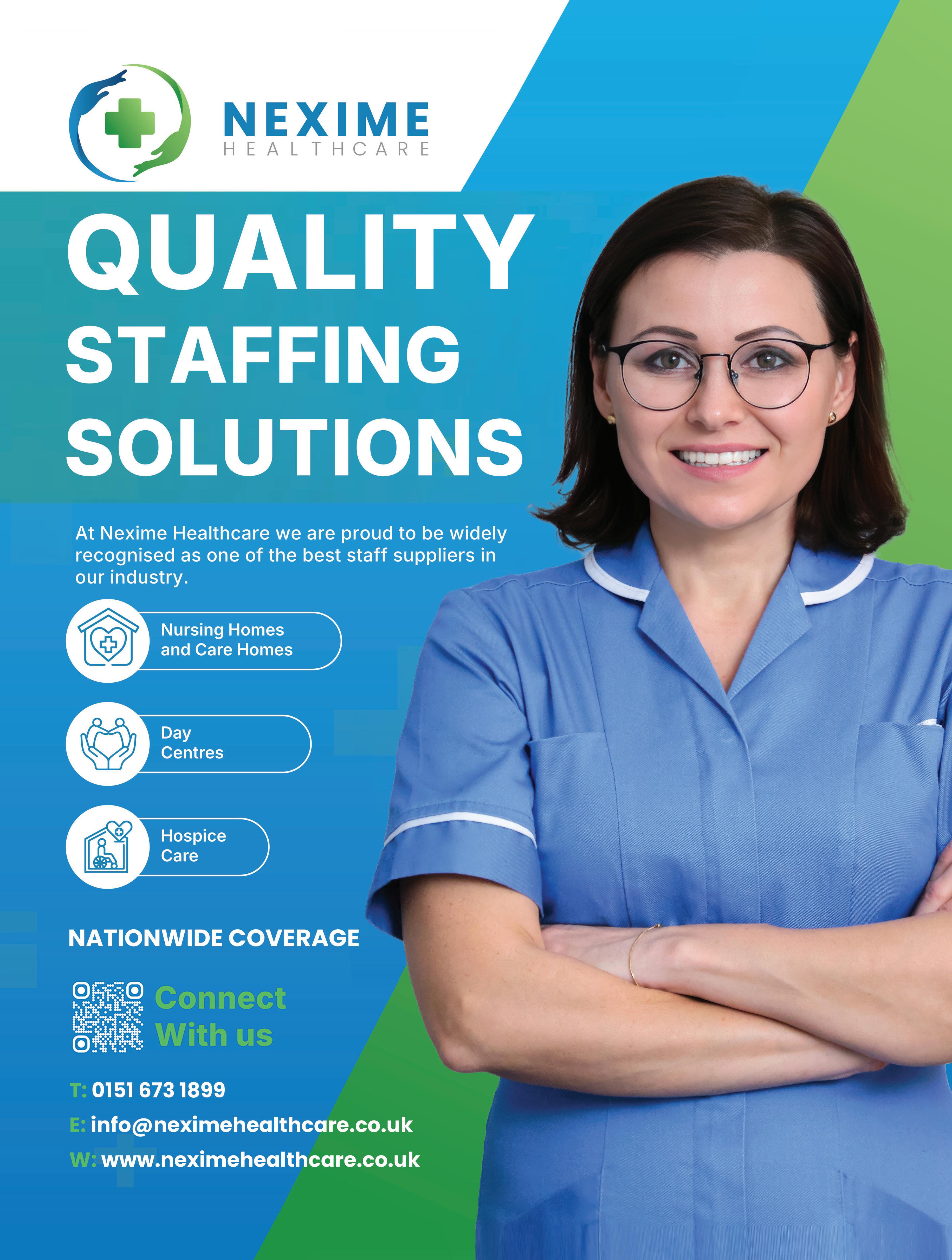
Jennifer
Moore, Director at Leonard Curtis Legal

Succession is one of the most pressing and personal decisions a care business owner will make. For many founders, particularly those who have built a service rooted in compassion, community and quality of care, handing over the reins is far more than a financial transaction. It’s also about legacy.
Increasingly, owners in the care sector are choosing to exit through Employee Ownership Trust (EOT); a structure that avoids the disruption that can often accompany third party sales, while simultaneously safeguarding their values, rewarding their team and securing long-term continuity.
At Leonard Curtis Legal, we’ve supported a growing number of businesses through the transition to employee ownership. In our experience, it’s not just a legal process, it’s a cultural shift that is transforming how businesses plan for the future.
An EOT is a government-backed ownership model that allows a business owner to sell a controlling interest (more than 50%) of their company to a trust set up for the benefit of all employees. If certain conditions are met, the sale is then exempt from Capital Gains Tax
(www.leonardcurtis.co.uk) discusses the growing number of care home businesses choosing Employee Ownership Trusts and explores the benefits for founders within the care industry.
(CGT), which is an obvious benefit for those planning retirement or succession.
While the trust doesn’t run the business, it does own it on behalf of the workforce. Decisions continue to be made by a management team, but under a new structure where the staff are the ultimate beneficiaries. In an industry where staff retention, engagement and continuity of care are vital, EOTs offer a compelling alternative to trade sales or private equity investment.
The values behind employee ownership align closely with the realities of social care. Businesses succeed here because of their people –the carers who turn up day after day to deliver life-changing support. Yet many of these same staff face limited recognition or reward. EOTs done well can help to rebalance that.
Businesses adopting the EOT model often benefit from improved staff retention and morale, a stronger sense of shared purpose and an increased perception of trust and credibility both internally and externally.
EOT-owned companies can also pay staff annual tax-free bonuses of up to £3,600, providing a meaningful benefit in a sector struggling to compete on wages alone.
LEGAL AND PRACTICAL CONSIDERATIONS
It’s important to remember that this is a legal transaction and one that must be carefully structured. To qualify for CGT relief, several conditions must be met. The EOT must acquire more than 50% of shares and voting rights, and the company must be a trading business and not an investment vehicle. It must also benefit all employees on equal terms and the former owners must not retain control.

Once established, the trust is governed by a board of trustees usually including independent members and employee representatives. It’s vital that the governance structure reflects both the legal requirements and operational needs of a care provider.
However, in the care industry it’s not only about meeting technical criteria, we must also think about designing governance models that work for regulated services. That means considering CQC implications, continuity of leadership and long-term financial planning.
FUNDING THE TRANSITION
A common concern is whether a care business can afford to buy itself. In most cases, the purchase is funded through future profits of the company with the outgoing owner receiving deferred payments over time. Some providers also access third-party lending to accelerate the process.
Robust cash flow forecasting is key. Margins in the sector are often tight, so careful modelling is essential to ensure the business remains stable while making repayments. We work alongside accountants and lenders to manage this risk.
A FUTURE-PROOF MODEL FOR VALUES-LED CARE
What sets EOTs apart is the ability to exit and secure a fair financial return while keeping the culture and purpose of the business intact. In a sector increasingly shaped by scale and commercial pressure, that’s a powerful proposition.
For owners who have built care services with love and long hours and who want to leave something meaningful behind, employee ownership is more than a tax-efficient exit. It’s a legacy model.
In the care sector, time is one of the most precious—and limited—resources. Whether it’s a nurse supporting an elderly resident or a finance officer reconciling invoices across multiple funding streams, every hour counts. Yet while much attention is given to frontline care, a quieter crisis is unfolding behind the scenes: payment inefficiencies.
Care providers operate in one of the most complex funding landscapes in the UK. Between over 150 local authorities, 42 Integrated Care Boards, and thousands of self-funders, the process of paying and being paid is often fragmented and manual. That complexity doesn’t just create paperwork—it creates risk.
Late supplier payments can disrupt services. Missed payroll deadlines can cause stress for care workers, many of whom live paycheque to paycheque. In a sector where emotional labour is high and financial stability is rare, a delayed or inaccurate payslip can tip the balance from just coping to burning out. When the back office falters, it impacts the front line.
As Victoria Ramsay, founder of Aequalis Accountancy, put it: “There’s a vicious circle. Late invoices mean poor cash flow, which means providers can’t afford to invest in the very systems that would solve the problem.”
And with care workers under unprecedented strain, payroll isn’t just an admin task—it’s a matter of respect. Timely, accurate payments send a clear message: we value you. Delays or errors, on the other
hand, erode morale and trust at a time when retention is already a challenge.
The good news? Change doesn’t always require sweeping reform. One of the biggest wins can come from automating payroll and payments. Faster Payments, for example, allow providers to process transactions in seconds—not days—giving finance teams the flexibility to act quickly and confidently.
Crucially, automation frees up time. According to industry data, automating care payroll can reduce processing time by up to 90%. That’s hours saved every week—time that can be redirected back into care, strategy, and staff support.
What’s often missing from transformation conversations is this: operational efficiency is human efficiency. Every error avoided, every minute saved, helps build a care system that’s not just compliant, but compassionate.
In a sector stretched thin, improving payments isn’t a “nice to have.” It’s a foundation for dignity, stability, and sustainable care.
To learn more about how care providers are modernising payments, visit Modulr at www.modulrfinance.com/care-payments



Aston Brooke Solicitors provides sponsors with an invaluable insight in the Home Office interview and inspection process and how to remain compliant.
Request a UKVI mock audit to see if you are compliant
Email Visit our website km@astonbrooke.co.uk www.astonbrooke.co.uk


